|
| Address of the President of the Republic of Serbia at the United Nations climate change conference COP26 held in Glasgow |
|
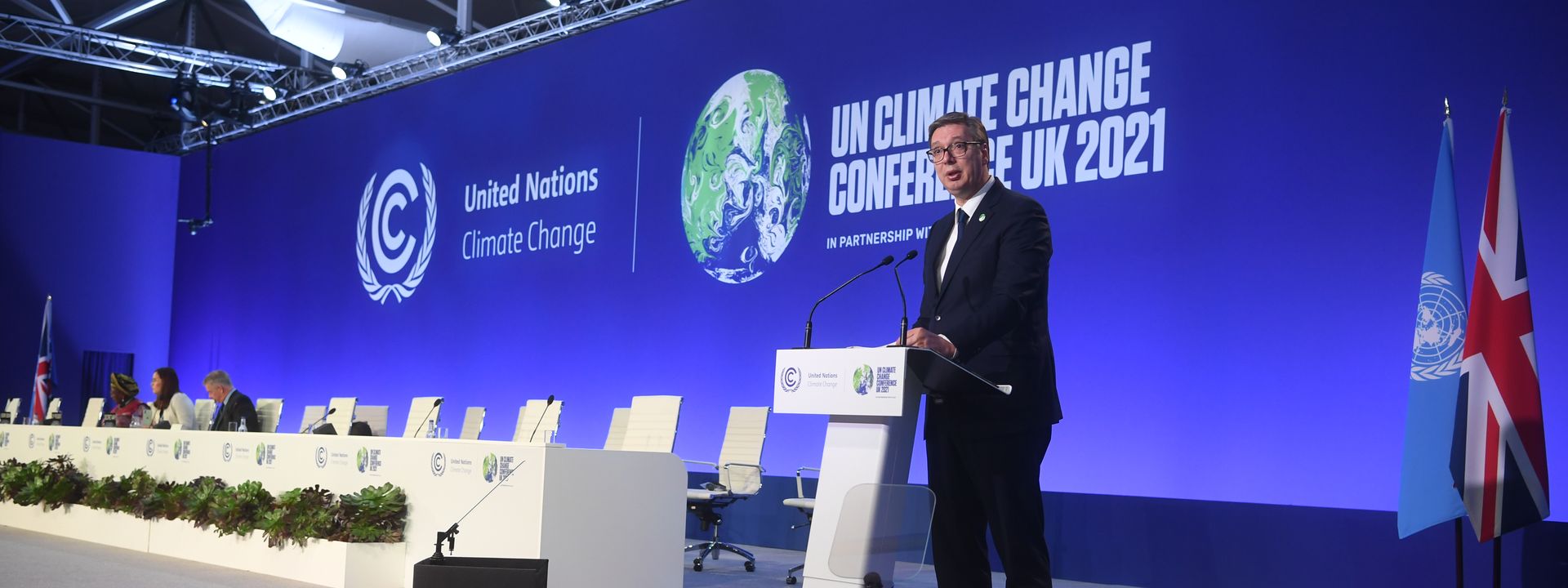
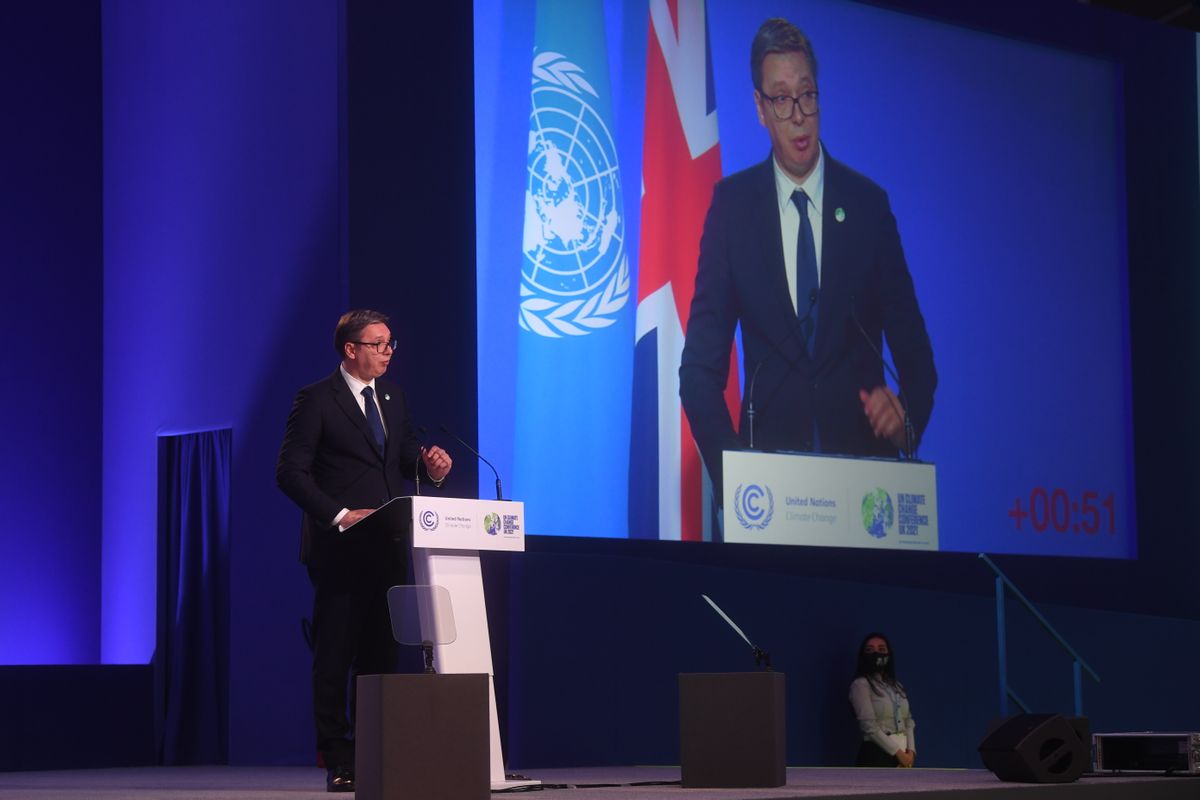
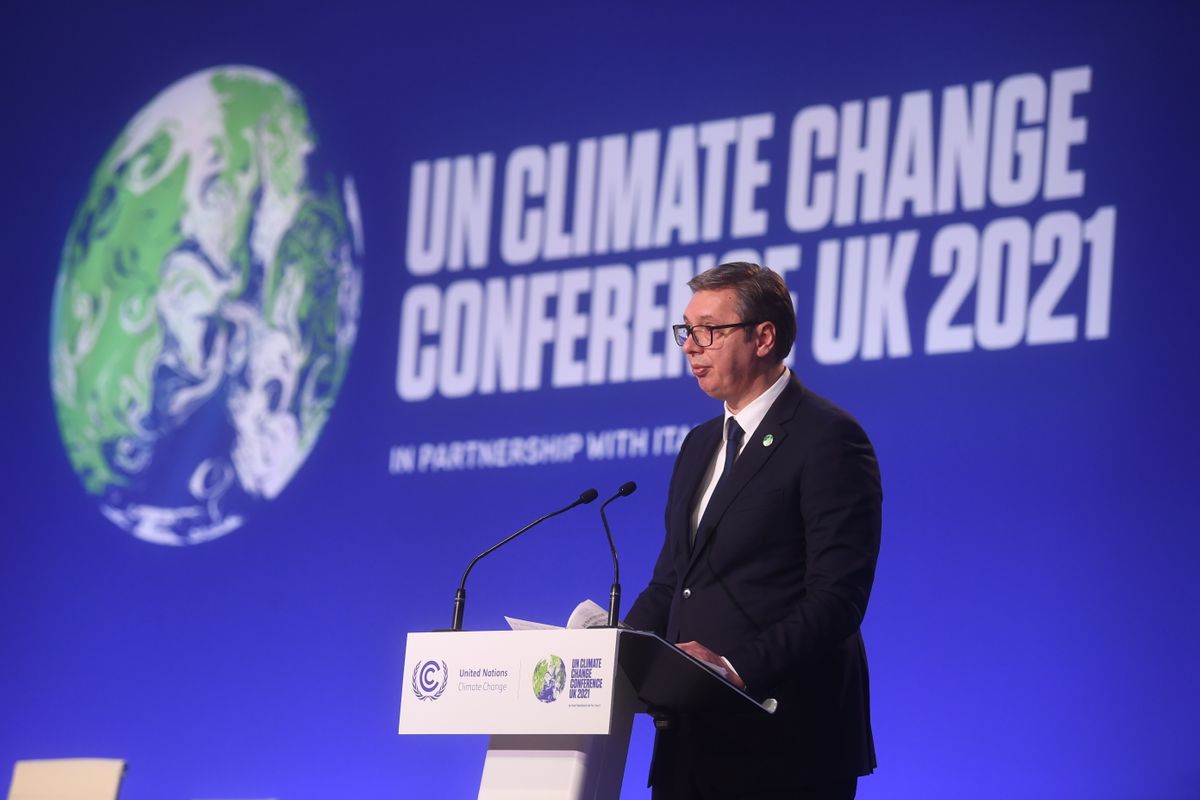
2nd November 2021
Address of the President of the Republic of Serbia at the United Nations climate change conference COP26 held in Glasgow
"Your Excellences,
distinguished delegates,
dear Sarah,
At the very beginning, I feel obliged to thank Prime Minister Boris Johnson and Her Majesty’s Government for exceptional hospitality.
I feel privileged to represent the Republic of Serbia at this important place and at the highest-level world forum, in working on the most important topic of today – promoting climate awareness.
We all agree that we must make investment into climate and environment.
We all, likewise agree, that future generations must be educated in order not to repeat the mistakes we made, by hurting the only Planet that makes life possible.
I am very honoured that the Republic of Serbia is co-chairing this year’s Conference as a Non-EU representative of the Eastern Europe Group.
In concrete terms, we see the special contribution of our expert team in finalising negotiations on the implementation of Article 6 of the Paris Agreement, which refers to the establishment of the global market and non-market mechanisms for reducing greenhouse gas emissions, as well as to remaining provisions referring to advanced transparency framework and common timeframes for Nationally Determined Contributions, which are the key provisions of the Agreement that have not yet been covered by the decision that is to be adopted by the Conference, i.e. all member states.
We, therefore, believe that this is an exceptional opportunity for Serbia to give its full contribution to the finalization of negotiations, which, we hope, will secure full implementation of the Paris Agreement.
As a result of strong economic development, modelled for Serbia by 2050, the impact of the implementation of climate measures to employment will be optimal, through new jobs creation and creation of new industries which have not existed so far.
One billion euros was raised at the first green bonds auction in Serbia, which clearly confirms the trust of international investors in our green agenda, but also to the economic and political stability of our country.
Incomes from green bonds issuance will be used for financing renewables, energy efficiency, sustainable water management, prevention of pollution and circular economy development and biodiversity preservation.
And as you can see, dear friends, my people made a terrific speech for me, but I am going to add a few more words and a few more questions for those that are coming from big powers and that haven’t answered yet several questions:
Number one is: how are we going to finance all these activities?
We’ve heard the story of trillions of dollars that are at our disposal. My question would be: what would be the interest rate, what would be the terms for taking these amounts of money, and actually how are we going to tackle that issue?
Number two: how are we going to treat the nuclear power plants? Are we going to shut them all or are we going to build them more?
Then, how are we going to build more renewables if we already started endorsing populist movements against wind parks, new hydropower plants, and are we going to put in jeopardy the level of our public debt to GDP ratio if we raise huge amounts of money?
How are we going to treat natural gas, and how are we going to secure decent prices of natural gas and electricity power as well?
And, I came here using an electric car from Edinburgh to Glasgow. But, how are we going to do mining and refining of lithium, nickel, cobalt and many other very important minerals?
In the end, we all know what is our final aim, what is our final target. But, it’s not a fairytale – we’ll have to work a lot, we’ll have to be 100 per cent dedicated, and we’ll have to be more honest with each other.
The health of people living in Serbia depends directly on the implementation of this Agenda, just like the health and life of each living being on Earth depends on arrangements that will be reached here and on national implementation of the respective arrangements.
Perhaps it is the right time to listen and hear the cry of Mother Earth because if we lose this race against time, our children will inherit an irreparably polluted Planet.
Thank you very much for listening to me."
Source: www.predsednik.rs
Photo: Dimitrije Goll |
|
|
| Selaković in UNSC: Dialogue and the implementation of the agreements reached are the only right way to resolve all open issues |
|
15th October 2021
Selaković in UNSC: Dialogue and the implementation of the agreements reached are the only right way to resolve all open issues
Distinguished President of the Security Council,
Esteemed members of the Security Council,
Distinguished Special Representative,
I would like to thank Secretary-General of the United Nations Mr. Guterres and Special Representative of the Secretary-General and Head of UNMIK Mr. Tanin for the report submitted and for their efforts made towards the implementation of the UNMIK mandate. I would also like to thank the members of the Security Council for the continued attention they have devoted to the issue of Kosovo and Metohija. The Republic of Serbia highly values the activities of the Mission of the United Nations in Kosovo and Metohija and supports it in carrying out its work as efficiently as possible, pursuant to the UN Security Council Resolution 1244, and undiminished in scope, aiming to build and preserve lasting peace, stability and security in the Province.
Mr. Tanin,
Please accept the expressions of our gratitude for your engagement and the cooperation we achieved during your term of office.
Mr. President,
Deep regret and concerns are raised by the fact that the security situation in Kosovo and Metohija in the past period has been marked by an increasing number of various ethnically motivated attacks and incidents targeting Serbs, which was also stated in the Report; that the provisional institutions of self-government (PISG) in Pristina continue to take unilateral steps and refuse to implement the agreements reached in the Brussels dialogue; and that institutional discrimination against Serbs, attacks on the sites of the Serbian Orthodox Church and the undermining of the economic sustainability of Serb communities in the Province have continued.
We are witnessing that dangerous provocations by Pristina are taking place every day, at an accelerated pace, thus seriously threatening the safety of Serbs in Kosovo and Metohija and directly violating the agreements and arrangements reached within the Brussels dialogue.
The latest violent incursion of the so-called ROSU units into the northern part of Kosovska Mitrovica, on 13 October, is the ninth incursion of its kind. Tear gas, shock bombs and unbridled violence are becoming a matter of everyday life for Serbs in the north of Kosovo and Metohija, and that must be stopped immediately.
In the last attack with firearms and chemicals used by Pristina special forces, 71-year-old Verica Djelic died as a result of chemicals used in the intervention, 10 unarmed civilians were wounded, one of them 36 years old Srećko Sofronijević was critically wounded in the back with of an automatic rifle. A three-month-old baby, who miraculously remained unharmed, was also the target of the shooting.
The false excuse for the latest unilateral action, as EU High Representative for Foreign Affairs and Security Policy Josep Borrell called it, was the fight against organized crime and smuggling. Ladies and gentlemen, Serbia is strongly against organized crime and smuggling, but the members of the UNSC should know that such an important and general global goal, which we all share, was cynically used for an armed attack on unarmed civilians, which began with an automatic rifle raid of pharmacies in which patients of Serbian and other nationalities are supplied with vitally important medicines. Four days before the local elections in Kosovo and Metohija, in order to gain votes in an irresponsible and inhumane way, fully motivated by separatist goals, the current PISG regime used medicines on which people’s lives depend to prove its position on the status contrary to UNSCR 1244.
Only a few days earlier, another provocation on the part of Pristina led to a dangerous crisis, when personnel of the so-called ROSU unit, armed with long firearms and reinforced with armoured vehicles, were deployed to administrative crossings between central Serbia and Kosovo and Metohija - Brnjak and Jarinje – in order to remove Serbian license plates and replace them with temporary ones, thus violently preventing the free movement of citizens.
These events do not fall within the reporting period covered by the latest Report of the UN Secretary General on the work of UNMIK, but it is incumbent upon us to address them on this occasion, in order to have everyone understand how dramatic the situation on the ground has been and how serious the consequences of Pristina's unilateral actions can be.
The incursions of heavily armed Pristina police formations, composed exclusively of Albanians, into the north of Kosovo and Metohija, under various pretexts and motives, with the use of excessive force, are provocations that have an extremely dangerous potential to destabilize the already sensitive security situation on the ground. The goal of the latest incursions of Pristina’s special force personnel into the north of the province was to provoke the Serbs and additionally intimidate them with a demonstration of force, as well as to provoke Belgrade to react hastily in some way.
It is obvious that with such moves Pristina aims to erase the 10 years of dialogue, which is the only way to resolve open issues. These provocations once again demonstrate that the provisional institutions of self-government in Pristina, not only do not intend to implement everything agreed in the Brussels dialogue, but that their goal is to completely deny dialogue as a means of resolving problems. An effective response to Pristina's lack of credibility and their dangerous play with fire, which could have unforeseeable consequences, cannot be provided by calling on "both sides" for constructiveness and restraint, which has long been a manner in public communication of some important factors in the international community. There is only one source of destabilization, it has a name – and that is the provisional institutions of self-government in Pristina - and after the events of 13 October, it is clear that it can and needs to be stopped by urgent and decisive action of the international community. It is now quite obvious that these are no longer sporadic and isolated provocations by Pristina, but that this is an organized campaign of ethnically motivated violence and discrimination against Serbs.
We also express our concern over the latest imposition of tariffs by Pristina on certain products originating from central Serbia, which was made public on 8 October. We remind you that the unilateral decision of Pristina to impose duties on products from central Serbia in November 2018 resulted in a de facto complete trade blockade and a long-term stalemate in the dialogue between Belgrade and Pristina. In contrast to Pristina, which persistently seeks to raise barriers towards central Serbia through unilateral acts, Belgrade is persistently and consistently working to liberalize the flow of people, goods, services and capital, which is the basic goal of our "Open Balkan" initiative. North Macedonia and Albania joined this initiative, but Pristina did not.
Distinguished members of the Security Council,
In the period from March to September this year, which is covered in the latest Report, close to 100 ethnically motivated attacks were carried out against Serbs, their private property, religious and cultural heritage sites. The increase in the frequency of attacks was accompanied by the strengthening of the intensity of ethnically motivated violence, which more and more often targets children, the elderly, women, the few returnees present there, as well as churches and other property of the Serbian Orthodox Church.
This systematically intensifies the ubiquitous sense of insecurity of the remaining Serbs, but also deters potential returnees, who are in fact being told that local Albanian communities can attack them with impunity and prevent them from returning to live in their own homes.
The most striking example of the position of Serbs in Kosovo and Metohija is the case of the displaced person Dragica Gašić, who moved into her apartment in the municipality of Djakovica again in early June. In that town – to which local Albanians proudly refer as a place forbidden to Serbs - Ms. Gašić, on her return, first faced physical and verbal attacks by citizens of Albanian nationality living there. Instead of being provided protection, that seriously ill woman then became a victim of institutional persecution as well, that the local self-government bodies and the police unleashed against her. Since this is a person who is the first and only Serb returnee to Đakovica after more than twenty years, it was to be expected that, at that moment, at least civil society organizations would attempt to protect her rights. However, NGOs from Djakovica soon joined the activities aimed at the expulsion Ms. Gašić, including those receiving funding from international donors for projects related to strengthening democracy and the rule of law.
I must also mention the latest attack on the house of the only remaining Serbian woman in the center of Pec, retired teacher Rumena Ljubić, whose windows were stoned twice in just 24 hours on 13 October.
Dragica's and Rumena’s fate is a frightening reflection of the real situation of human rights that almost every one of over 200,000 displaced Serbs and non-Albanians would face in Kosovo and Metohija - provided that they gather the courage to return to their homes in the Province after more than twenty years. I would like to remind you again that since 1999, only around 1.9% of internally |
|
|
| Marking the Remembrance Day of all Serbs who died and were expelled in the armed operation "Storm" |
|
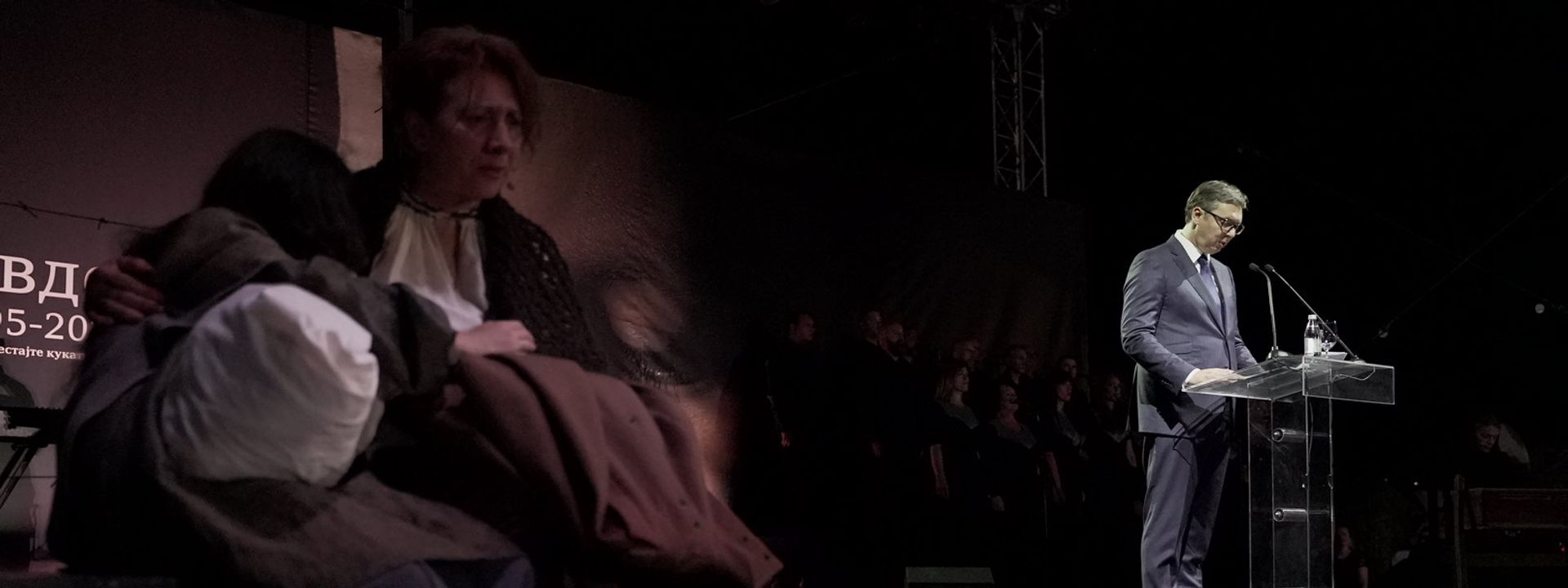
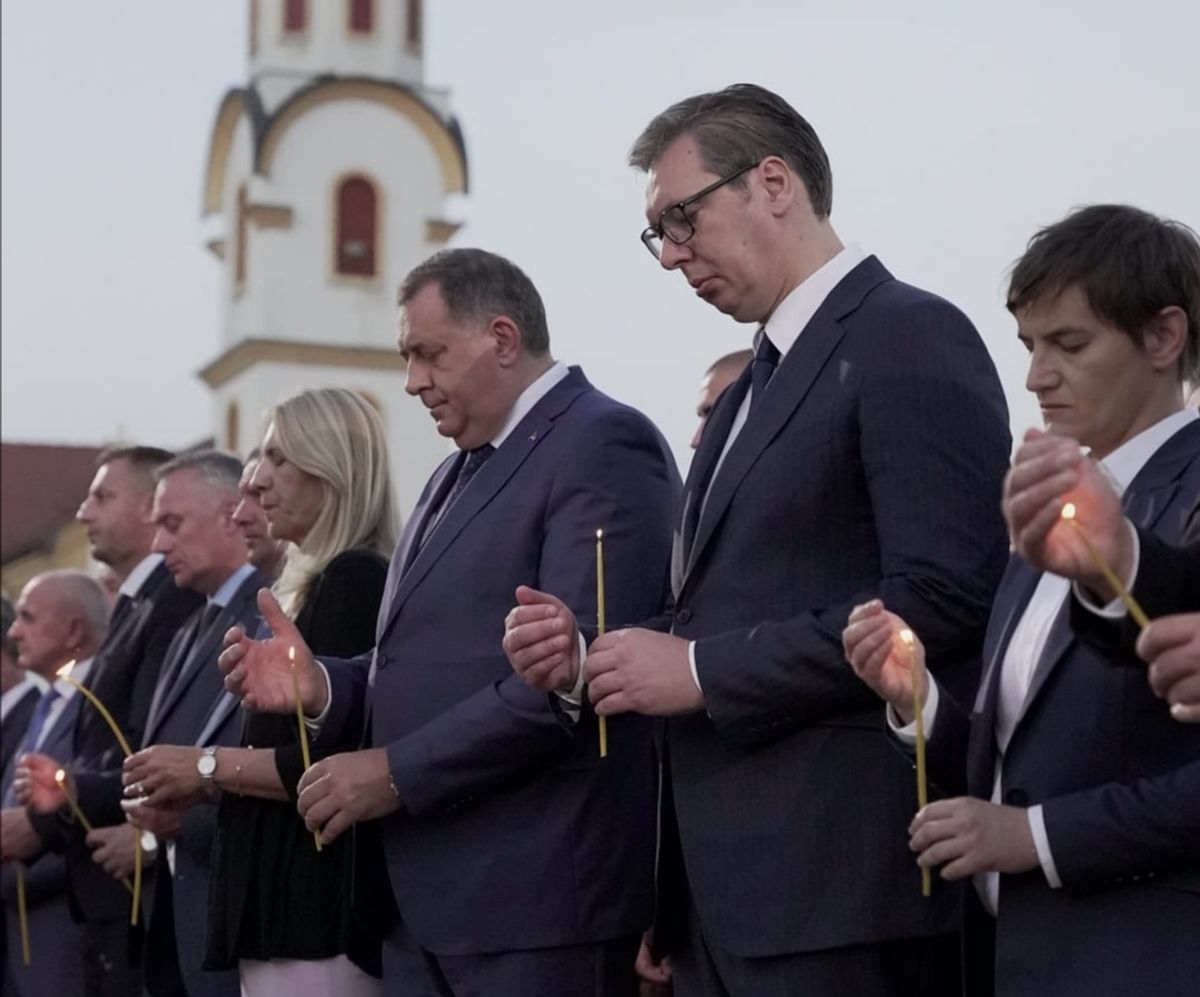
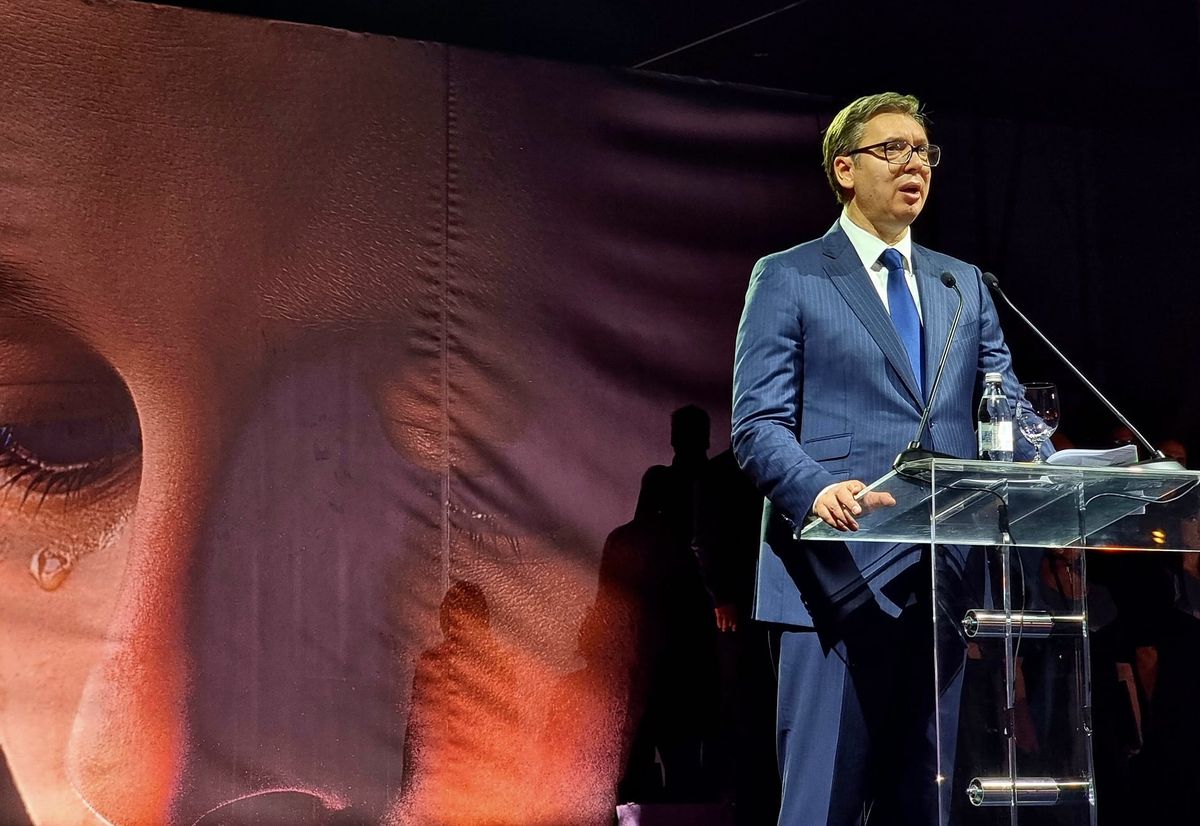
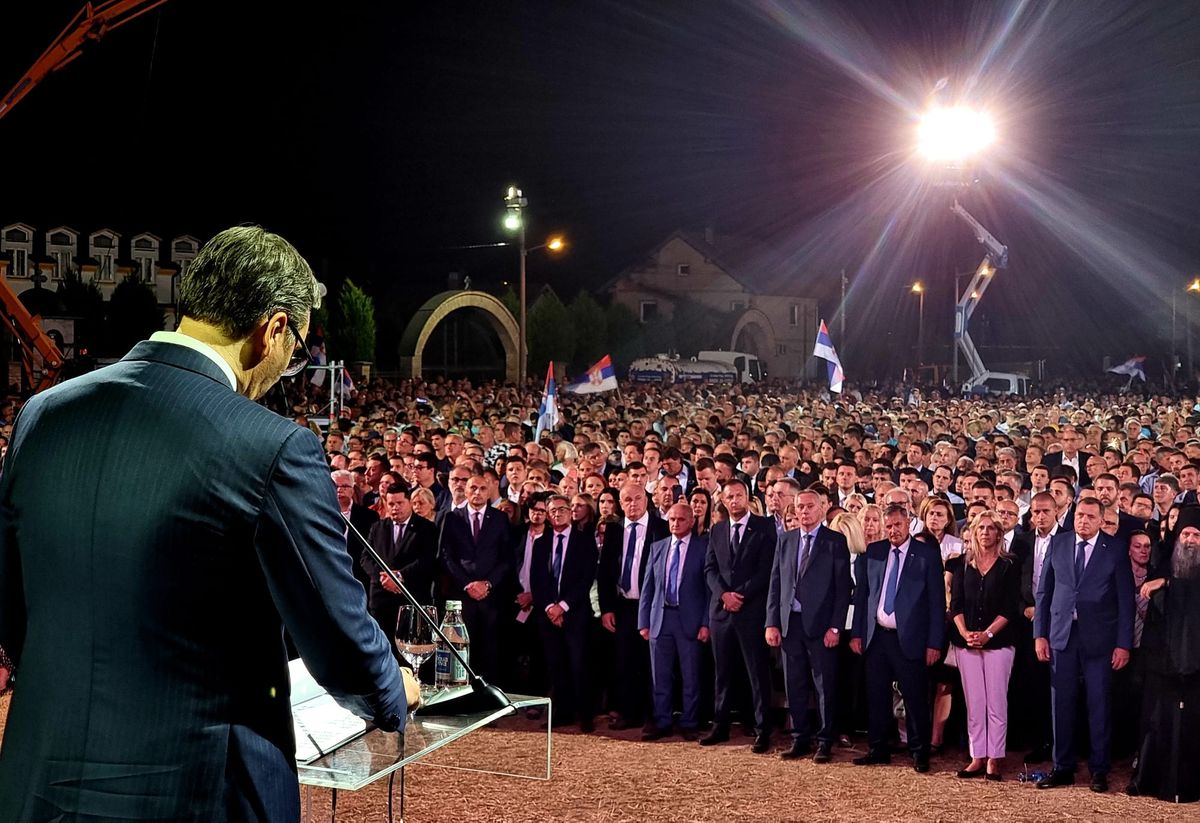
5 August 2021
Marking the Remembrance Day of all Serbs who died and were expelled in the armed operation "Storm"
The President of the Republic of Serbia, Aleksandar Vučić, attended the celebration of the Remembrance Day of all the victims and expelled Serbs in the armed operation "Storm" and said that Serbia remembers!
"Today, when we remind ourselves again of what happened in August 1995, the terrible pogrom, the expulsion of more than 250,000 Serbs, the exodus and ethnic cleansing, we, at the same time, and finally, remind ourselves of who we are, what we are, where we come from and where we are going. Thank you all for being here together tonight and for showing how much we love our people", said President Vučić, adding that we will not forget any of the things that the Krajina people had to go through.
"For us, these are not just terrible numbers of victims", said President Vučić and emphasized that Serbia will not forget.
"History has never been rewritten like today. That is why I want to remind us all not only of what others have done to us, not wanting us to exist, but also of what we have done to ourselves, just as if we ourselves did not want to exist", said the President, noting that we must never again allow Serbia to forget its silent heroes.
President Vučić emphasized that we must never again cover our eyes, ears, and mouths in front of something that truly was a pogrom and the downfall of all humanity.
"Pretending that this is not true, avoiding saying it, is a crime not only against the victims, but also against ourselves, every living Serb, people from Krajina, as well as Serbia and its future", said President Vučić and underlined that people can stand up straight and live with themselves and the others without hesitation, fear and doubt, only if they remember.
President Vučić pointed out that Serbia must fight for peace and cradles with children, as well as that not remembering annuls and erases us from the history and the future, depriving us of the right to tomorrow.
"Our mission is a happy future for us and for the new generations! Today's Serbia is based on a clear identity and a culture of remembrance", said President Vučić and reminded that everything that had been neglected for decades had been done, and that a strong Serbia has become the master of its own destiny.
"Eternal glory to you, Serbian martyrs who perished in the "Storm" and all other pogroms. Your children are in their Serbia, taken care of, loved and successful. Sleep peacefully, Serbian falcons, the future of your children is our vow", concluded President Vučić and thanked everyone who showed that night how much they love their country and that Serbia remembers.
Source: www.predsednik.rs
Photo: www.predsednik.rs |
|
|
| Serbia has achieved great success in the field of digitalization |
|
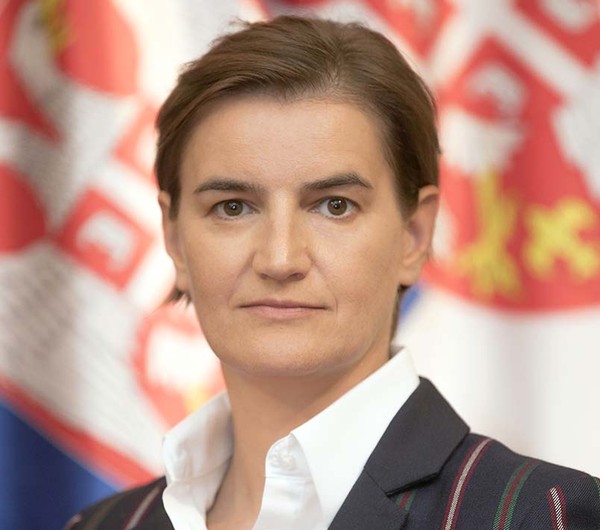
20 July 2021
Serbia has achieved great success in the field of digitalization
The Prime Minister of the Republic of Serbia, Ana Brnabić, stated at a gathering dedicated to digitalization and the IT sector, which was held in New York, that since she became Prime Minister, she is most proud of Serbia's success in the field of digitalization.
Brnabić, who is on a two-day visit to the United States, said that when she was elected Minister of Public Administration and Local Self-Government in August 2016, she wanted to do everything to change the public administration and what bothered her as a citizen.
She stated that, when she took office as Prime Minister, she knew what her priorities were and that first of all, digitalization needed to be raised to a higher level, that the education reform was supposed to begin, as well as work on strengthening the economy.
I believed in a country that believes in its people, because the Serbian people are creative. From 1 June 2017, we started working as an e-Government, i.e. we started exchanging data electronically, said the Prime Minister.
According to her, our citizens no longer had to go to, say, the Tax Administration, and since then, the public administration has exchanged 50 million documents, which means that citizens did not have to go from office to office for 50 million papers.
Brnabić pointed out that she is proud of what has been done in the field of education since she became the head of the Government, specifying that in September 2017, programming was introduced as a compulsory subject in primary schools.
Nobody believed that we could do that, but we cooperated with the private sector and some social organizations and we succeeded. At the moment, we are far ahead of numerous countries in Europe and the world, said the Prime Minister.
The Prime Minister pointed out that she was most proud when the cornerstone was laid for the science and technology park in southern Serbia, noting that so far, our country has four science and technology parks.
She pointed out that Serbia has since become one of the most successful countries in the world in the field of technology, and that according to some parameters, it is among the ten countries in the world, or among the five, assessing that this is proof that the country can change quickly.
Answering the question about vaccination, the Prime Minister emphasized that our country has never seen it as a geopolitical issue, but as a health issue.
According to her, Serbia talked with producers from both the East and the West and was among the first European countries to sign agreements with the company Pfizer-BioNTech and Sinopharm.
Unfortunately, many countries have viewed this issue as geopolitical. It did not matter to us, as long as the vaccines were safe, the Prime Minister emphasized and added that this was not the end of Serbia's success, because good organization was also needed.
Brnabić explained that the organization is another important thing in vaccination, because it is a logistically very difficult process, adding that, with the help of digitalization, success has been achieved and that everything we did in the previous years has paid off.
She stated that Serbia quickly established a system through which citizens could express interest in vaccination against the coronavirus and choose which vaccine they wanted to receive, as well as to be informed by a message when to go and get vaccinated.
Now I can log in on my phone, to see how many people have received the vaccine, how many more have registered, so that the effects of digitalization are obvious. We have made everything very efficient and easy for our citizens, the Prime Minister explained.
Answering the question of what she can tell other countries of the world about how to progress faster, Brnabić said that it is important to invest as much as possible in digitalization and education.
You need to teach children how to think, not what to think. Not all children will become IT experts, but what they can learn is an algorithmic way of thinking and how to make decisions, she said.
The Prime Minister mentioned investing in high-speed internet and providing infrastructure for start-ups as an important thing for progress, because more and more economies will be based on start-ups and innovations, emphasizing that people should be helped to start companies and implement their ideas.
Speaking about social networks, she pointed out that fake news has become the biggest problem on these networks and that it will remain so for some time.
This is the biggest challenge I face as Prime Minister, especially during the corona virus pandemic, she said, adding that social networks are also a great opportunity for politicians to communicate with citizens.
Source: www.srbija.gov.rs
Photo: www.srbija.gov.rs |
|
|
| President Vučić: We have decided – our goal is the EU, but China is an important partner |
|
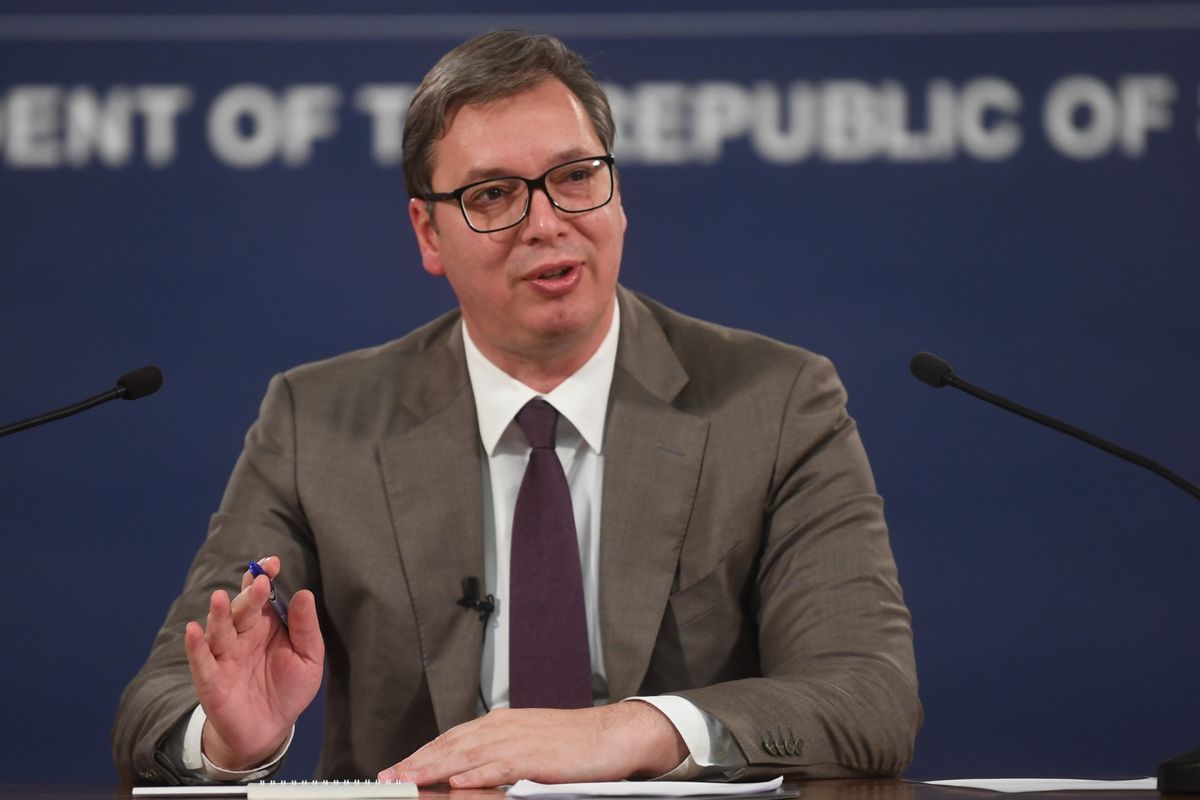
22 July 2021
President Vučić: We have decided – our goal is the EU, but China is an important partner
We have decided – our goal was and remains the EU, Serbian President Aleksandar Vučić said in an interview with the German daily "Handelsblatt", adding that there is no alternative for Serbia, but also stressing that China is an important partner for Serbia, and that the task of the state is to take care about the interests of its citizens.
He thus answered the question of what Serbia will choose once it has to choose between close relations with Beijing or the EU. Vučić emphasized that Serbia wants to become a full member of the EU.
"We are connected by history, common culture, EU members are already undoubtedly our most important partners", he explained and added that the trade exchange between Germany and China is 3,000 times higher than between Serbia and China, and, as he noted, even despite that, Serbia's business operations with China are portrayed as a problem.
To the statement that the German Chancellor Angela Merkel did not congratulate the 100th anniversary of the Communist Party of China, and that he did so, he replied that Serbia is not Germany, but a small country. On additional insistence on what Serbia will do if it has to choose between the EU and China, he underlined that Serbia has already decided, that its goal was and remains the EU membership.
"Our biggest investors are from the EU. The EU accounts for 67% of our trade while 17 percent of the trade is with countries of the region that are all on the way to the EU. We cannot survive without the EU", he added.
"But can we do a lot of good things with China – of course. And we do that, just like Germany does", Vučić pointed out, and to the remark that the quality of the Silk Road projects was being criticized, primarily because of Chinese workers, he answered that the quality of roads or bridges, which Serbia is building with China, is excellent.
"We give jobs to those who submit the best offer to us. That is why I tell Europeans who criticize Chinese projects in our country – offer us a project for one euro more and you will get it", he emphasized.
In that regard, he pointed out that Serbia is building a railway to Northern Macedonia with 600 million euros of EU aid, stating that that offer was better than China's.
"There is often talk of a 180-kilometer railway to Budapest through the territory of Serbia, which is financed by China. But the railway that is being built with the help of the EU from Belgrade to the northern Macedonian border is twice as long and no one is talking about it. It is all too political", he stated.
Asked whether he welcomes the plans of the EU and the USA regarding an alternative initiative to the Silk Road, Vučić said that he supports everything that brings advantages to our region.
"The Chinese want to expand their presence everywhere, but many processes in the West are, frankly, more efficient and without problems. We still have a lot to learn from the West, but we are getting there", Vučić said.
He pointed out that China was an important partner for Serbia and added that when the consolidation of state finances began in 2014, our country received good conditions from China for development projects.
He also stated that a competition for a copper mine was announced in eastern Serbia, at the request of the EU, that no European company had made an offer for six months, and that it had then been taken over by the Chinese.
"Our job is to take care of our people", he said.
He reminded that the Serbian economy grew by 52% in eight and a half years, which for the EU means that Serbia could be a strong member and engine for the entire region.
Explaining how Serbia is developing so well economically, he pointed out that Serbia has an excellent workforce, which speaks English, that society and administration are digitalized, and that it has the most flexible labor law in Europe, as well as consolidated public finances.
He reminded that previously the public debt was at 78% of GDP, and that today it has been reduced, thanks to the strong growth of the economy, to 52%.
"We can afford to give investors an incentive to come", he added, emphasizing that Serbia offers investment assistance, but that, for example, subsidies were not the motive for the arrival of the development center of the company Continental.
He pointed out that, five or six years ago, only Serbia started using the dual education system in this region, which Germany, Switzerland and Austria also use, that tens of thousands of people are in dual education, and that this is appreciated by foreign investors, who, in addition, can work closely with universities as well.
Germany, he stated, is the most important trade partner and the largest investor.
We started with the arrival of small textile companies from Turkey, and now primarily large German companies are coming. Today, 71,000 people work in German companies in Serbia", he explained.
Vučić said that the European perspective is very important for investors, stating that Nidek, Toyo Tires or Mitsubishi are coming from Japan to Serbia because our country is on a stable European path.
Asked if he believes that Serbia will become an EU member in the foreseeable future, he said that he does not complain.
"It is certain that if we had received 45 billion euros of EU aid, we would have been much further economically. Instead, we received 1.6 billion euros from the EU. We are used to achieving our successes on our own", said Vučić.
The President of Serbia reminded that in Croatia, salaries used to be 2.2 times higher than in Serbia, and today they are only 1.7 times higher.
"We are closing the gap with our own efforts. If we were to become a member of the EU, then we would certainly not ask for the biggest subsidies", he assures.
He said that the Serbian path follows the German path to Europe, and that Serbia wants a fair chance.
"I believe Merkel's words. She is at the end of her term and I would not have to praise her anymore. But she gave us stability, freedom of travel to the EU, helped us with the migrant crisis in 2015, and asked the Minister of Economy Altmeier and others to work closely with us", he reminded.
Asked if there were any indications that the new German government would support Serbia in the same way, Vučić expressed confidence that it would be the same.
"I know Armin Laschet, I talked to him while he was the Minister-President of North Rhine-Westphalia. He is very smart and understands the situation in the Balkans, and he will certainly continue Merkel's policy towards our region as the new chancellor", he added.
Vučić also expressed his belief that Russia, if Serbia's accession to the EU were concretized, would not react similarly as in the case of Ukraine, as this is a sovereign decision of Serbia.
To an additional question in this regard, Vučić pointed out that whenever he met with Vladimir Putin, and there were 18 or 19 meetings, he told him that he was grateful for the traditionally close friendship with Russia, but also that Serbia is on a clear course towards the EU.
"He asked if it was our choice and I answered that EU membership is indeed our goal", he added.
When it comes to "Kosovo", Vučić emphasized that a compromise is needed regarding this issue.
"Only in this way can there be sustainable peace. Serbia wants peace, me as well. Let's stop with the madness of the past. Only then can the whole region become the engine of new growth for Europe", said Vučić.
Source: Tanjug
|
|
|
| Selaković invited representatives of members of the NAM to gather in Belgrade in October |
|
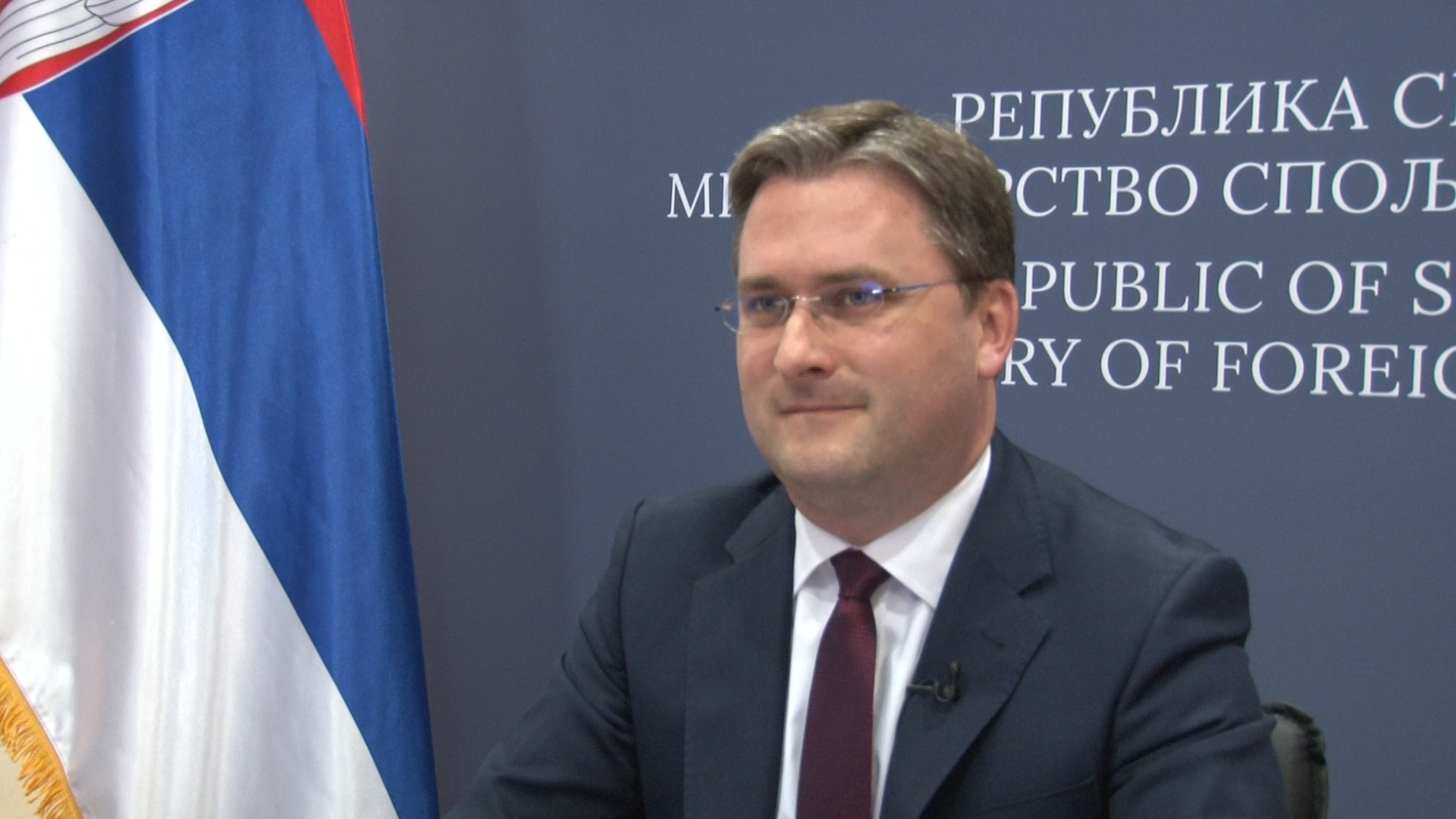
13. July 2021.
Selaković invited representatives of members of the NAM to gather in Belgrade in October
The Minister of Foreign Affairs of the Republic of Serbia, Nikola Selaković, spoke at the Ministerial Conference of the Non-Aligned Movement (NAM) today and on that occasion sent an invitation to the representatives of the members to gather in Belgrade on 11 and 12 October, when the 60th anniversary of the first Conference of the Non-Aligned Movement held in Belgrade in 1961 will be marked.
Selaković informed the participants of the conference that Serbia would organize this important jubilee of non-aligned countries together with Azerbaijan – which is currently chairing the NAM.
In his address, Selaković reminded that the former Yugoslavia and President Tito, as co-founders of the Movement, gave their contribution to creating a vision of a different world, and that Serbia, as one of the successors of Yugoslavia, is proud of that part of its history.
"The spirit of non-alignment is based on equality, freedom, lasting peace, sovereign equality of states and peaceful cooperation of all peoples, and these values are also woven into the state-building foundations of Serbia", the minister said.
Selaković said that the Non-Aligned Movement throughout its history has been a beacon of freedom to all those who sought the right to existence and prosperity in a world that was often ruled, not by the force of law, but by the law of force. He assessed that even today we find ourselves in times of serious global challenges in which the Movement has the opportunity to reaffirm its libertarian traditions and commitment to a world of equals.
"Serbia, as a militarily neutral and politically independent state, will give its most sincere contribution to such goals of the Movement. We hope that by strengthening mutual ties and cooperation, as a group of states and peoples that share the same values and interests, we will strengthen our common capacity to face the challenges of tomorrow. And the challenges are already before us", Selaković pointed out.
The Minister emphasized that international law should be a pillar of political and security architecture of the world, and added that Serbia respects the commitment of the members of the Movement towards the goals and principles of the UN Charter.
"Many members of this movement are aware that by insisting on international law, they are working in their own favor and in favor of preserving regional and global stability," the minister pointed out.
Selaković also said that the COVID-19 pandemic clearly showed that inequality, lack of solidarity and empathy in the world have become very obvious in the roughest way.
"Serbia is eternally grateful to all the countries which, such as Azerbaijan, helped us in difficult times. We later extended that chain of solidarity by making vaccines available, not only to our citizens, but also to others in the region. We supported our neighbors with the belief that solidarity is the best investment in a common future", the minister concluded.
|
|
|
| Incidents in Kosovo and Metohija in 2021 |
|
Incidents in Kosovo and Metohija in 2021
January
07/01 The Vučković family house in the village of Babin Most was broken into;
13/01 Petar Petković, Director of the Office for Kosovo and Metohija, was not allowed to enter;
16/01 At the “Jarinje” CCP, a bus with 40 passengers carrying season’s gift packages for children was not allowed to enter;
20.01 Inspection raided the Health Center in Štrpce, searching for vaccines;
28.01 Igor Popović, Assistant Director in the OKM, was not allowed to enter;
February
02/02 Two Ristić brothers were wounded by firearms in Laplje Selo;
03/02 KLA graffiti were inscribed on the Krstović family house in Goraždevac;
03/02 The mast and flag by the Monument to Serbian victims in Goraždevac were broken;
04/02 Archeological items were stolen from the Hermitage of St Petar of Korisha, near Prizren;
05/02 The Jovanović family house in the village of Mogila was broken into;
10/02 A KLA Billboard was placed in Čaglavica;
10/02 The Vučković family house in the village of Berkovo was broken into;
13/02 The TV PINK and TV Kraljevo crews were not allowed to enter;
15/02 The RTS crew, filming the series „The Right to Tomorrow“ was not allowed to enter;
26/02 Serbian boy M.M. was stabbed by Albanians in Kosovska Mitrovica;
28/02 Team of the Arilje Handball Club was not allowed to enter;
March
03/03 A Serbian house in Gračanica was broken into, money and personal documents were stolen;
04/03 Two Goranis in Globočica were wounded by two Albanian men;
05/03 Serbian boy L.P. was hit in Gračanica by car with an Albanian driver who fled the scene;
06/03 On All Souls’ Day, Orthodox church of St. Peter in the village of Klokot, Municipality of Kosovska Vitina, was broken into and some money was stolen;
06/03 On All Souls’ Day, Orthodox church of Holy Trinity in the village of Parteš, Municipality of Gnjilane, was broken into, and from it were stolen money, a hand-made shroud and an icon;
07/03 A tombstone in the graveyard of the village of Binač was stolen;
07/03 A Serb restaurant-owner in the village of Šilovo, Municipality of Gnjilane, was shot in the leg by an Albanian;
12/03 From the parish house under construction, next to the Church of the Holy Apostle Luke in the village of Vitomirica, Municipality of Peć, construction material was stolen;
12/03 ROSU members searched the premises of the Municipality of Klokot, then searched the family house of the Municipality President and arrested him;
13/03 Church of 40 Martyrs of Sebastes in the village of Drajkovce, Municipality of Štrpce, was broken into and its money was stolen;
13/03 Church of St. Dimitri in the village of Donja Bitinja, Municipality of Štrpce, was broken into;
15/03 Church of St. Kyriako in the village of Gornja Gušterica, Municipality of Gračanica, was broken into, demolished, and looted;
16/03 At the “Jarinje” CCP, Ms. Svetlana Miladinov, Assistant Director in the OKM, was not allowed to enter;
18/03 Church of St. Marko in the village of Šilovo, Municipality of Gnjilane, was broken into, and its money and sound system were looted;
25/03 KLA graffiti were inscribed on the wall of the Health Center in the village of Suvi Do;
27/03 At the “Tabalije” CCP, the Kosovo Police did not allow 17 football players of the FC „Šumadija“ to enter Kosovo and Metohija;
30/03 Ms. Mila Anđelković, a returnee whose family house has been illegally occupied by the Albanians, was arrested;
April
10/04 Serbian youngsters Marko Nikolić and Miloš Rošić, while sitting in a cafe in the north of Kosovska Mitrovica, were attacked by bottles;
12/04 Health clinic in the village of Gojbulja was broken into;
13/04 Teenager Luka Dimitrijević was attacked in Gračanica;
15/04 Albanian flags were waved followed with an attempt of incursion into the Clinical Hospital Center in the north of Kosovska Mitrovica;
16/04 Petar Petković, Director of the OKM, was not allowed to enter;
18/04 Ms. Tamara Grujić, a RTS journalist, was arrested in Vučitrn;
18/04 The front door of the elementary school in Obilić were demolished;
26/04 Lazar Đoršević and his family were attacked by Albanians, while at their own estate in the village of Gojbulja;
May
03/05 The Jaćović family house in Kosovska Vitina was stoned;
03/05 A window was broken on the car belonging to the deacon in Orahovac;
05/05 Miroslav Lukić from Velika Hoča sustained a broken nose after being physically attacked by three Albanians;
06/05 On the St. George’s Day, a group of thugs attempted to remove the Serbian flag from the Bell tower of the church of Holy Apostles Peter and Paul in Klokot;
06/05 The church of St. John the Baptist, located in the center of the City of Peć, also known as the Metropolitan Church, was stoned and a window got broken;
09/05 The church of St. Petka in Kosovska Vitina was stoned;
09/05 In the village of Suvi Do, Municipality of Kosovska Mitrovica, three shots were fired into the air from the passing vehicle;
10/05 The church of Most Holy Mother of God in Lipljan was stoned;
11/05 The house of returnees Radoje and Miloje Pumpalović in the village of Dubrava, Municipality of Istok, was attacked, for the fifth time within the timeframe of a year;
20/05 The Jaćović family house in Kosovska Vitina was attacked once more;
24/05 In the church of St. Petka in the village of Donja Šipašnica, Municipality of Kosovska Kamenica, front door was burglarized, church was ransacked, and its holy relics were stolen;
26/05 The house of returnee Sreten Stojiljković, near Novo Brdo, was broken into, and his tools and firewood were stolen;
26/05 An outbuilding belonging to Božidar Zdravković from the same village (Ćeranovica Hamlet, returnee village Klobukar, Novo Brdo) was burglarized and a stove was stolen;
30/05 The signpost pointing to the Draganac Monastery in the Municipality of Novo Brdo was shattered.
June
03/06 “Greater Albania” graffiti were inscribed on a Serbian home in Orahovac;
10/06 Kosovo Police raided the Temple of Christ the Savior in Priština, after the liturgy;
11/06 Hate graffiti were inscribed on the Temple of Christ the Savior. Kosovo Police stood by, passively watching the desecration as it went on;
11/06 Ms. Darija Kisić Tepavčević, Minister of Labor, Employment, Veterans' Affairs, and Social Affairs, scheduled to hold lecture to students, was not allowed to enter Kosovo and Metohija;
11/06 A group of 39 Christians believers on pilgrimage were prevented from visiting the monasteries in Kosovo and Metohija;
11/06 Bus carrying Christians believers was kept on hold for more than 5 hours at the “Jarinje” CCP;
12/06 Two buses carrying Serbian athletes and Christians believers was returned from the “Jarinje” CCP
14/06 Graves of families Stojanović and Šarić in Orahovac were desecrated;
19/06 A bus carrying 50 Christians believers from the parts of Central Serbia on route for the All Souls’ Day to Kosovo and Metohija;
20/06 Electrical installation in the church of St. Uroš in Uroševac was stolen;
21/22/06 Minister Vanja Udovičić was not allowed to enter into Kosovo and Metohija;
21/06 The front door of the church of holy Apostles Peter and Paul in the village of Talinovac near Uroševac was shattered, electrical installation taken down, and icons thrown around;
24/06 The family house of Staniša Stojanović in the village of Babin Most, Municipality of Obilić, was broken into, looted, ransacked, and the money was stolen;
26/06 A group of Serbian mountaineers was banned from hiking to the top of the Šar Mountain starting from Štrpce and the Brezovica Ski Center;
27/06 Repeated assaults against Dragica Gašić, the first ever Serbian woman returnee into Đakovica, coupled with the stoning of her apartment, pasting photos of deceased people, and announced protests of NGOs with requests for her eviction;
28/06 Stopping the vehicles with Serbian license plates on the road to Gazimestan while on way to celebrate Vidovdan, seizure of any Serbian symbols; a nun was searched, and a Montenegrin citizen was arrested and, two days later, remanded to a 30-day custody;
On that same day, several Serbian people were arrested just because they were singing the Đurđevdan song and uploading videos to social networks;
29/30/06 In the Gračanica Monastery, the tricolor of the Serbian Orthodox Church was stolen, and the mast on the monastery gate was broken. The photos of the desecrated church were posted on social networks, also depicting a black-clad Albanian holding the flag of “Greater Albania”. Few hours later, there was a video on social networks with that same masked Albanian burning the stolen flag;
30/06 Dragica Gašić was forbidden to install an armored door in her apartment, and the door got confiscated;
30/06 Four persons from Čačak were apprehended at Gazimestan on June 28, brought and interrogated before a prosecutor, over their T-shirts captioned “No Surrender”. According to them, those T-shirts were found in the trunk of their vehicle with Čačak license plates. They were questioned by prosecutor without interpretation, because the alternative to it, as they were informed, was to wait until the next day. They were fined with EUR 400, which they did not pay immediately, so the Kosovo Police system withheld their ID cards;
30/06 In Lipljan, a group of Albanians prevented several Serbian boys and girls to set up a basketball hoop in a local park;
July
01/07 An “ALBANIA UCK” graffiti appeared overnight on a billboard presenting the Monastery of Gračanica on the Gračanica – Laplje Selo road;
01/07 A group of Albanians has beaten up a 13-year-old boy, Nikola P, tearing off the cross around his neck and leaving him in bruises and contusions. |
|
|
| Address by the President of the Republic of Serbia at the session of the United Nations Security Council |
|
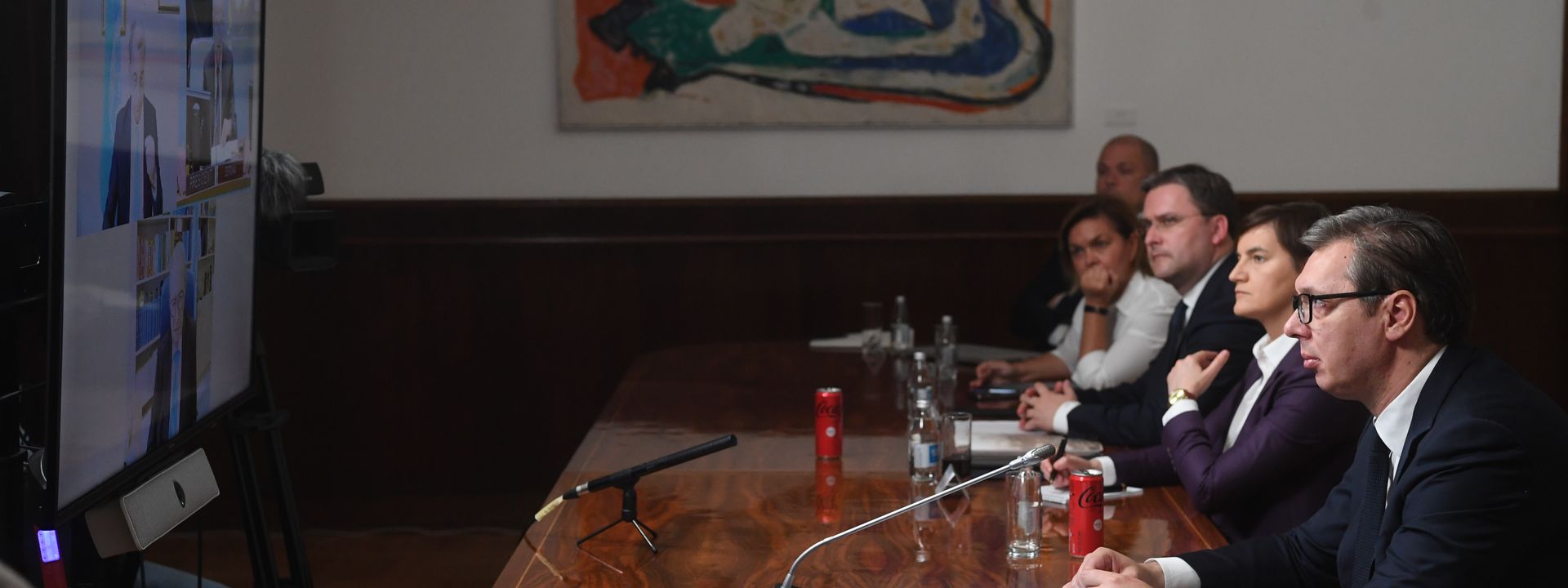
09. June 2021.
Address by the President of the Republic of Serbia at the session of the United Nations
Security Council
Dear Mr. President, ladies and gentlemen, members of the delegations
I would point to a few ongoing issues in my speech that refer to the competences of the
Mechanism, namely, the possibility of serving the sentences passed by the ICTY and
Mechanism in the Republic of Serbia, with the current practice of disabling early release of
the sentenced persons as well as obligation of the Mechanism regarding protection of
sentenced persons.
The second part of the speech will be dedicated to issues that are opened by the six –month
Report on the work of the Mechanism by Mechanism President Mr. Agius and Report by the
Chief Prosecutor Mr. Serge Brammertz, especially regarding current cooperation of the
Republic of Serbia and the Mechanism.
The third part of my speech, and I noticed that in many of your statements even today, is
going to be the view of Serbia on everything that took place in The Hague Tribunal and what
the Tribunal verdicts brought to people in the region of former Yugoslavia.
The Republic of Serbia has initiated before the Security Council, on several occasions, the
issue of possibility of serving sentences passed by the ICTY and Mechanism in the
Republic of Serbia. Beside the efforts to move this issue from “square one”, not a single
response was obtained from the Security Council. The majority of persons that are serving
their prison sentences are citizens of the Republic of Serbia, and it comes naturally that the
Republic of Serbia is interested in enabling them to serve their prison sentences in the
Republic of Serbia.
ICTY and the Mechanism are making references to the Security Council as an institution in
charge of dealing with this issue.
I am ready to reiterate here the readiness of the Republic of Serbia to take over obligations
and liability for executing prison sentences that the Tribunal or Mechanism passed on the
citizens of the Republic of Serbia, under the monitoring of the Mechanism and full respect for
the authority of the Mechanism regarding early release.
Mr. President
A particular problem that we are facing with is disturbance by the judicial institutions
established in the territory of Kosovo and Metohija, which is within Serbia and which is
under Interim Administration of the UN. We are witnesses of attempts of retrial for two
citizens that are serving their prison sentences for which they had already been trialed before
the ICTY. More concretely, in previous period there was an attempt for hearing of Nebojša
Pavković and for obtaining extradition of Vlastimir Đorđević.
I urge on the Mechanism and Security Council to prevent attempts of violation of the
principle ne bis in idem, a civilization principle that was confirmed in Article 7 (1) of the
Statute of the Mechanism and to disable retrials for persons already convicted by the ICTY,
particularly to make sure that it is not done in the territory which is under interim UN
administration.
Mr. President,
President of the Mechanism (Mr. Carmel Agius), apart from the regular Report, delivered
also on 11 May 2021 a letter to the President of the Security Council, whose subject is the
alleged omission of the Republic of Serbia to apprehend and turn over to the Mechanism
Petar Jojić and Vjerica Radeta, indicted of contempt of court, claiming that in this way the
Republic of Serbia was acting contrary to its obligations towards the UNSC Resolution 1966
(2010) and asking the Security Council to take measures in order to ensure that Serbia meets
the alleged obligations in accordance with the Mechanism Statue and Resolution 1966.
The point of the argumentation of the President of the Mechanism comes to that that the
Republic of Serbia has the obligation to deprive of liberty and extradite to the Mechanism its
citizens accused of contempt of court, regardless of the nature of accusation, circumstances
under which such an order was made and consequences that might result from its
implementation.
It is about accusations that do not refer to sever violations of international humanitarian law
and that are related to a case before the ICTY, which ended in 2018 (Vojislav Šešelj case), by
acquitting the defendant in the first instance, and upon the Prosecutor’s complaint the
defendant was declared guilty and sentenced to a 10-year imprisonment, which was covered
by the time he spent at the UN Detention Unit.
Judge Agius states that Serbia ignores its obligations in accordance with the Resolution 1966
(2010). Quite the opposite- the Republic of Serbia takes seriously its obligations regarding
cooperation with the Mechanism. After the warrant for apprehension and extradition of the
two persons accused of contempt of court to the Mechanism had been introduced, the Higher
Court in Belgrade established that assumptions for their apprehension and extradition to the
Mechanism had not been met. The decision is founded on the rules of international law and
domestic law of the Republic of Serbia and it is mandatory for holders of the executive power
in the Republic of Serbia.
I would remind here that the first decision of a sole judge (Aydin Sefa Akay, 12 June 2018),
that was acting in this case was that the criminal prosecution of V. Radeta and P. Jojić for
alleged contempt of court was to be forwarded to the judicial authorities of the Republic of
Serbia. In procedures that followed, the argument of the alleged unwillingness of the
witnesses to cooperate with the judicial authorities of the Republic of Serbia was stated for
the first time, and the decision on deprivation of transferring the case to the jurisdiction of the
judicial authorities of the Republic of Serbia was based on the respective argument.
The Republic of Serbia expressed its readiness to take over the court procedure against Petar
Jojić and Vjerica Radeta on several occasions and it provided appropriate guarantees.
Additionally, the Republic of Serbia fully recognizes and accepts the obligation of the
Mechanism to monitor trials that were transferred to national courts with the help of
international and regional organizations, as well as to take measures envisaged by Article 6 of
the Statute of the Mechanism.
I would remind here that the Republic of Serbia extradited to the tribunal all the persons
indicted by the Prosecutor’s Office, and among the respective mostly highest political,
military and police officials; it enabled presence of vast number of witnesses, delivered
extensive documentation. Obligation of the Mechanism, in accordance with the Resolution of
this Security Council, is to take measures that enable transfer of cases to national justice
system. In previous practice, 13 cases were transferred to Bosnia and Herzegovina, 2 to
Croatia and only one to Serbia.
The last but not the least, I want to remind all of you here of the fact that France- of course as
a sovereign and independent country- upon request for apprehension and extradition of
Florence Altman for publishing documents and contempt of court, refused the request for
extradition, with an explanation that it does not extradite its citizens. For far smaller offence
you ask as to extradite our citizens Jojic and Radeta, showing both the distrust to Serbian
justice and judiciary and Serbian State, as well as a fact that the rule from ancient Rome is
still valid – quod licet lovi non licet bovi.
It does not harm to underline that high-level officers and politicians were not trialed for
crimes against Serbs, and that crimes against Serbs remained unsanctioned before ICTY and
Mechanism. Let me remind you, just as an example that Ademi and Norac case for ferocious
crimes against Serb civilians in Medački Džep was left to Croatian justice institutions. Proven
crimes against Serbs, like those of Ramuš Haradinaj, Naser Orić, then Ante Gotovina and
other indicted for military operation “Storm” that led to a complete ethnic cleansing of Serb
population in the big part of today’s Croatia, resulted before the ICTY in acquittals. Many
horrible crimes against Serb civilians that were committed in the territory of Bosnia and
Herzegovina, Croatia and the Autonomous Province of Kosovo and Metohija, and that
resulted in ethnic cleansing, simply were not the subject of interest of the ICTY.
What’s very important and not to leave anything unclear, Serbia is a country that condemns
all crimes and all criminals who perpetrated them in the region of former Yugoslavia.
However, it is interesting that despite often criticism Serbia is the only one that speaks openly
and condemns crimes perpetrated by Serb nationals, while in other regional countries they do
not speak at all about crimes that representatives of those nations committed against members
of Serbian people.
And I want to emphasize once again here in front of you that Serbia condemns terrible crime
in Srebrenica and extends its deepest condolences to the families of all killed in that
massacre. And there are no “buts” about the respective.
Nevertheless, we are here to analyze results and penal policy of ICTY and the Mechanism
and it was such that it has never gained trust among Serbian people, no matter where they
live. And not because we Serbs do not acknowledge crime committed by some of our
compatriots, but because The Hague Tribunal, with exceptions, was judging only to Serbs
and in all three territories of former Yugoslavia- Croatia, Bosnia and Herzegovina and
Kosovo and Metohija, which some of the SC Member States see and name of course,
contrary to law and legal norms and UN Resolutions, as an independent state. I would try to
plastically prove to you how The Hague justice was tailored even though I know that it will
not come to understanding of many of you, but to me it is important because of the history,
facts, and school books that will be made in accordance with the facts.
Namely, Serbs were sentenced to totally 1138 years of imprisonment, and to 8 life
imprisonments. At the same time, The Hague Tribunal did not sentence a single Croat for
crimes against Serbs, neither in actions Medački Džep, nor Flash and Storm. How politically
cunning it was done in the Tribunal, and all wrapped in the form of law and justice.
Prosecutors of The Hague Tribunal chose on purpose three military and political leaders of
Croats, Bosniac Muslims and Albanians, on all three mentioned territories, committed against
Serbs. – Ante Gotovina, Naser Orić and Ramuš Haradinaj. It is interesting that following the
same pattern, the same pattern, this injustice was shared. Namely, all of them were sentenced
in the first instance procedure, with the exception of Ramuš Haradinaj, because not a single
witness survived. Gotovina was sentenced to 24 years’ imprisonment in first-instance
procedure, while by a mysterious decision of the second instance council and 3:2 judge ratio,
the verdict was changed to acquittal. Naser Orić, for crimes against Serbs, was also sentenced
in first instance verdict, but by a mysterious decision of the second instance court, and again
3:2 ratio decision was an acquittal and he was set free of any liability. Let me reiterate, all
witnesses in process against Ramus Haradinaj, either committed suicide or were killed under
very, very strange circumstances.
Let me conclude, I do not want to believe that someone wants to say that there had been no
crimes against Serbs, but judging by the verdicts of The Hague Tribunal, no one- absolutely
no one- is responsible for those crimes.
Nevertheless, we in Serbia will show responsibility and we will fight for peace, stability and
reconciliation in the region.
We ask UN Security Council Member States to help us with rational and pragmatic approach
and respect for international law and not by attempts of further humiliation of Serbia. Serbia
is a small country, with proud and courageous people, the one that gave the biggest sacrifice
during the WWI and WWII; people who wants to leave in peace with their neighbors. And
when I am asking you for this, I do not think I am asking for too much.
At the very end, Serbia is the fastest growing country of the Western Balkans region and we
cannot progress unless our relations with neighbors, friends and other countries are good,
solid and better. That is why- despite the selective justice that was applied in The Hague
Tribunal- we will be open for any dialogue, any kind of cooperation and we will look towards
the future and not towards the past. And I have only one message for the citizens of Serbia
and citizens of Serbian nationality in the entire region- keep your heads up, neither Serbia nor
Serbian people are convicted of anything and it is up to us to work even more diligently, to
open factories and to fight for our children and our future.
Long Live Serbia! |
|
|
| INFORMATION ON VACCINATION AGAINST CORONAVIRUS IN SERBIA (updated: 7 May 2021) |
|
INFORMATION ON VACCINATION AGAINST CORONAVIRUS IN SERBIA
(updated: 7 May 2021)
Vaccination (immunization) in Serbia began on 24 December (earlier than in the majority of European countries). Prime Minister Ana Brnabic received the first vaccine. She was also the first Prime Minister in Europe to receive the vaccine shot.
Serbia was the third country in Europe, after Britain and Switzerland, to start the vaccination. In Serbia, mass vaccination of the population in the fight against Covid-19 launched on 19 January.
Medical staff was the first to receive the vaccine, the immunization of geriatric centres' patrons followed, and the vaccines were then administered to the personnel of the Ministry of the Interior, Serbian Army and other security services, media representatives and others.
In Serbia, citizens express interest to be vaccinated against Covid-19 through the e-Government portal or by phone - via the contact center, upon which they receive a message with the date and time of vaccination appointment.
The Serbian Government informed that it enabled registering for vaccination against coronavirus via Viber app, starting 6 April, which is available through the official info service of the Serbian Government launched on Viber.
As of 9 April, all local governments will start arranging open vaccination posts where citizens will be able to get vaccine shots without prior registration, while the immunization of citizens who registered via e-Government portal or the Viber app will also be carried out at the same time.
Between 10,000 and 15,000 citizens apply for vaccination daily through the e-Government portal.
Citizens are able choose the vaccine they wish to receive, and the following are available: Pfizer-BioNTech, Chinese Sinopharm, Russian Sputnik V and AstraZeneca.
Serbia is one of the few countries that has four vaccines at its disposal. |
|
|
| Meeting with the World Health Organization Regional Director for Europe |
|
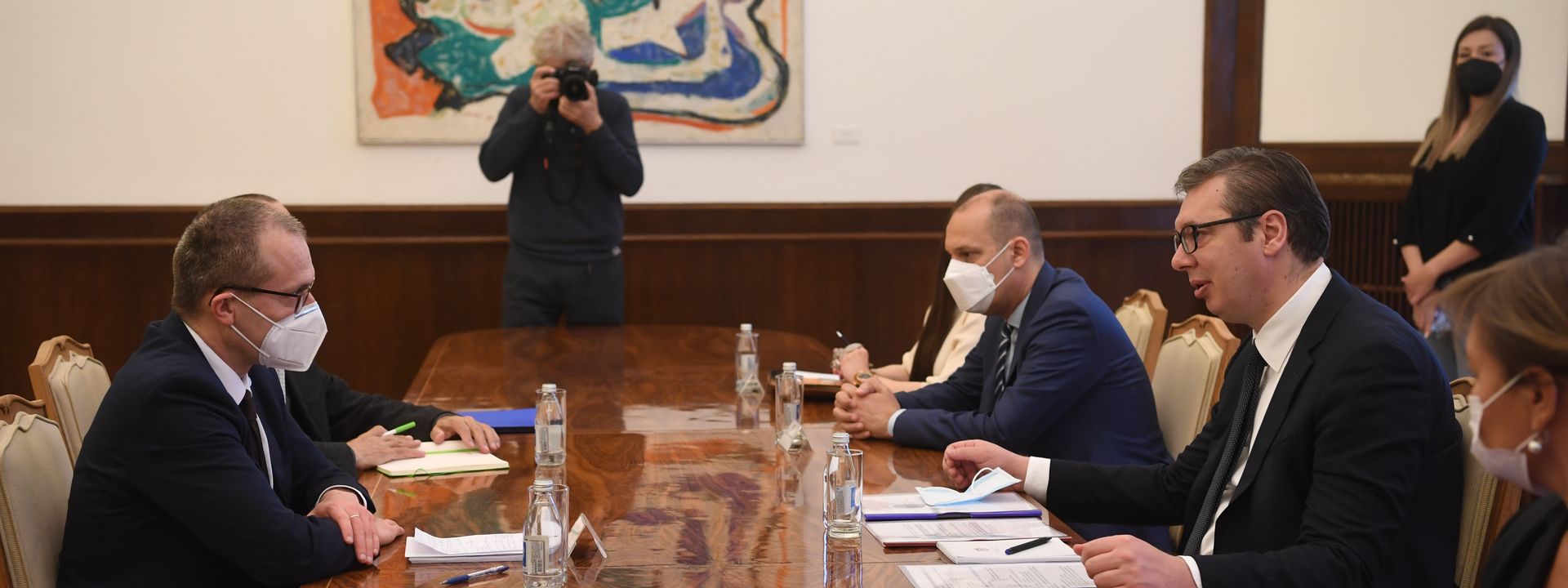
20th April 2021
Meeting with the World Health Organization Regional Director for Europe
President of the Republic of Serbia Aleksandar Vučić met today with the Regional Director of the World Health Organisation for Europe Hans Kluge, to discuss cooperation in the fight against the COVID-19 pandemic, as well as cooperation in improving health care in our country and other joint activities.
President Vučić thanked Dr Kluge for his personal engagement and support during the current pandemic, especially for technical assistance and expertise. On this occasion, he informed the WHO official about the results of immunisation in Serbia and plans on how to provide the vaccine to all citizens who want to get it.
Dr Kluge congratulated President Vučić on his leadership and personal commitment to provide vaccines. He emphasised that Serbia, with its good immunisation strategy, ranked among the global leaders, thus becoming an example of humanity and solidarity by enabling vaccination of elderly people in rural areas, foreign citizens and donating vaccines to other countries.
"Serbia has accepted the vaccine as a life-saving product and has not looked at it geopolitically", said Dr Kluge.
The two interlocutors agreed that the world should increase production capacities for vaccines, as well as develop new adequate therapies for the fight against COVID-19, and, in this regard, work on increasing the level of citizens' trust in science.
President Vučić informed Dr Kluge about the plans for improving the work of the Institute for Virology, Vaccines and Sera "Torlak".
"We want to make 'Torlak' one of the best vaccine factories in Europe", said President Vučić.
Source: www.predsednik.rs
Photo: www.predsednik.rs |
|
|
| WHO describes immunisation process in Serbia as impressive |
|
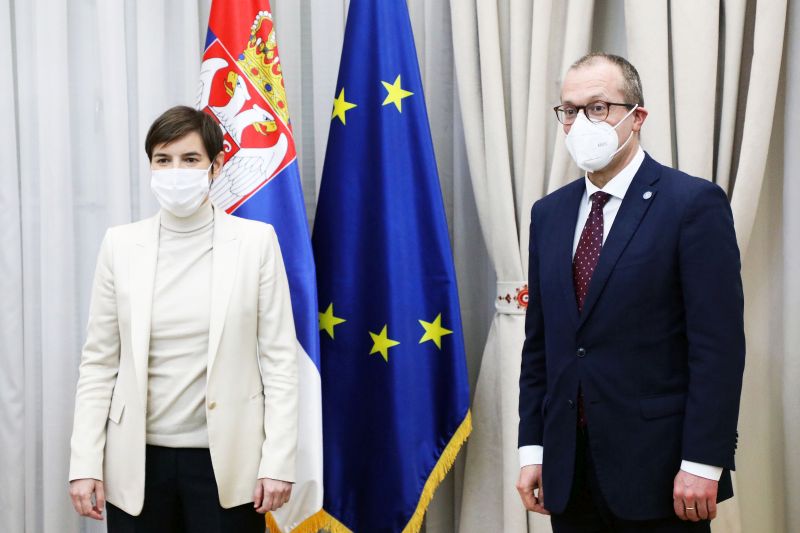
19 April 2021
WHO describes immunisation process in Serbia as impressive
Prime Minister Ana Brnabic talked today with World Health Organisation (WHO) Regional Director for Europe Hans Kluge about the epidemiological situation and the course of immunisation of citizens in Serbia.
Brnabic expressed gratitude for the cooperation in the fight against the pandemic, technical assistance and expertise, emphasising that the support of this organisation is very important for our country.
She informed the WHO Regional Director for Europe about the course of immunisation of citizens in Serbia, expressing her belief that, thanks to the large number of vaccinated people, we will be able to create collective immunity and return to normal life.
Kluge assessed the immunisation process in Serbia as impressive, and added that Serbia has made a good decision to offer citizens all available vaccines used in the fight against coronavirus.
Expressing concern over the emergence of new strains of the virus, he stressed the need to speed up the immunisation process and show mutual solidarity.
The WHO Regional Director for Europe praised Serbia for the humanity it has shown by donating vaccines to the countries of the region and enabling vaccination for those who do not have a sufficient number of vaccines for their citizens.
The Prime Minister said that Serbia will continue to cooperate with the countries of the region and help in accordance with its capabilities.
When it comes to the project "Roadmap for Health in the Western Balkans 2021-2025", it was stated that, if epidemiological conditions allow, a regional meeting will be held in Belgrade at the end of the year, important for future improvement of cooperation between countries in the field of health challenges.
Source: www.srbija.gov.rs
Photo: www.srbija.gov.rs
|
|
|
| INFORMATION ON VACCINATION AGAINST CORONAVIRUS IN SERBIA |
|
INFORMATION ON VACCINATION AGAINST CORONAVIRUS IN SERBIA
(updated: 16 April 2021)
Vaccination (immunization) in Serbia began on 24 December (earlier than in the majority of European countries). Prime Minister Ana Brnabic received the first vaccine. She was also the first Prime Minister in Europe to receive the vaccine shot.
Serbia was the third country in Europe, after Britain and Switzerland, to start the vaccination. In Serbia, mass vaccination of the population in the fight against Covid-19 launched on 19 January.
Medical staff was the first to receive the vaccine, the immunization of geriatric centres' patrons followed, and the vaccines were then administered to the personnel of the Ministry of the Interior, Serbian Army and other security services, media representatives and others.
In Serbia, citizens express interest to be vaccinated against Covid-19 through the e-Government portal or by phone - via the contact center, upon which they receive a message with the date and time of vaccination appointment.
The Serbian Government informed that it enabled registering for vaccination against coronavirus via Viber app, starting 6 April, which is available through the official info service of the Serbian Government launched on Viber.
As of 9 April, all local governments will start arranging open vaccination posts where citizens will be able to get vaccine shots without prior registration, while the immunization of citizens who registered via e-Government portal or the Viber app will also be carried out at the same time.
More than 1,700,000 citizens applied through the e-Government portal or contact centers. Between 10,000 and 15,000 citizens apply for vaccination daily through the e-Government portal.
Citizens are able choose the vaccine they wish to receive, and the following are available: Pfizer-BioNTech, Chinese Sinopharm, Russian Sputnik V and AstraZeneca.
Serbia is one of the few countries that has four vaccines at its disposal.
According to the data, 70 percent of those vaccinated received the Sinopharm vaccine (more than a million citizens), 12 percent received the Pfizer vaccine, 9 percent Sputnik V and 9 percent the AstraZeneca vaccine.
The elderly are constantly pleaded with and invited to apply for the vaccine if they have not already, considering that citizens over 70 years of age are a priority. At the same time, citizens of all ages are invited to register and get vaccinated, since immunization has also begun of those who are not in the priority groups. Medical workers have also been vaccinating residents of smaller and rural areas, who have not registered via e-Government.
The importance of vaccination is constantly emphasized, as well as the fact that it is the only solution in the fight against the Covid-19 virus.
According to the latest information, 3.020.401 vaccine doses were given in Serbia, out of which fully vaccinated citizens (having received both doses) account for 1.212.997 (a third of the Serbian adult population). It is estimated that by the end of April, we will have about 40 percent of the adult population vaccinated with the first vaccine dose.
950,000 citizens were fully immunized - which means that three weeks have passed since their second dose, or 5 weeks since their first dose in the case of AstraZeneca.
In the age group between 65 and 74, more than 51 percent of the population has been vaccinated, and in the age group over 75, we have 42 percent of those vaccinated.
*On April 6, President Vucic was vaccinated in Rudna Glava, receiving the Chinese Sinopharm vaccine.
On Thursday, 8 April, Serbia broke its own record for the number of persons vaccinated, when more than 75,000 people were vaccinated. This is a result that, in proportion to the number of citizens, even the most developed countries in Europe and the world cannot take pride in.
The goal is to have more than 2,800,000 persons vaccinated, and 2,200,000 revaccinated by the end of May, and more than three million vaccinated and revaccinated persons by the end of June.
Belgrade, Novi Sad, Nis, Uzice and Sremska Mitrovica are at the top of the list with about 36 or 37 percent of vaccinated adult citizens.
*Example of Belgrade – 39,1 percent of adult citizens have been vaccinated (550.473 citizens), out of which fully vaccinated citizens 376.904 or 26,8 percent. There are additional 18 posts in city municipalities where they can be vaccinated without making an appointment. When it comes to senior citizens, aged 65 to 74, more than 68 percent of that population was vaccinated.
PROCUREMENT OF VACCINES
*On 22 December, the first quantities of Pfizer-BioNTech vaccine were delivered to Serbia. Serbia is the second country in Europe, after Great Britain, to receive the Pfizer vaccine.
*On 16 January, one million doses of the Chinese Sinopharm vaccine arrived.
*On 29 January, 40,000 million doses of the Russian Sputnik V vaccine arrived.
*On 9 February, a new consignment of 50,000 Sputnik V vaccines arrived from Russia.
*On 11 February, Russian experts arrived in Serbia and discussed with Serbian experts how to start the production of Russian vaccines in Serbia as soon as possible. They visited the Torlak Institute in order to assess the technological and personnel capacities of the Institute for the production of the Sputnik V vaccine.
President Vucic announced that our country will invest in new plants, new equipment that would meet all standards, with the goal of producing the vaccine in our country. The Sputnik V vaccine would be distributed to the region from our country, but also to European countries.
* On 10 February, another batch of 500,000 Chinese Sinopharm vaccines arrived in Serbia.
* On 15 February, 40,950 doses of the Pfizer-BioNTech company vaccine against coronavirus arrived in Serbia.
*On 21 February, 150,000 AstraZeneca vaccines arrived in Serbia, which have been available at every vaccination post since 23 February. Serbia was the first country in the Balkans to have this vaccine at that point in time.
*On 22 February, 46,800 more Pfizer vaccines arrived in Serbia.
*On 22 February, 50,000 more Sputnik V vaccines were delivered.
*On 28 February, a new consignment of 100,000 doses of the Sputnik V vaccine arrived (this was a delivery of the second dose of the vaccine - for revaccination), since the first and second doses have a different composition.
*On 1 March, a delivery of 58,500 Pfizer-BioNTech vaccines arrived.
*On 4 March - during his official visit to Berlin, Minister of Foreign Affairs Nikola Selakovic said that German Foreign Minister Heiko Maas informed him that Serbia would soon receive 300,000 vaccines from the COVAX program (the first doses arrived on 2 April).
* On 5 March, 500,000 more Sinopharm vaccines were delivered.
*On 8 March, 28,080 doses of vaccines by Pfizer- BioNTech company arrived.
*On 11 March – Minister Popovic announced that the production of the Russian Sputnik V vaccine at the Torlak Institute will begin in May, and that Serbia will thus become the first country in the territory of Europe where this vaccine is produced.
The first phase of production of the Russian vaccine in Serbia implies transport of the substance, filling of bottles in accordance with the highest technological standards, packaging and distribution of vaccines in our country and region, and after the establishment of the first phase of production, the preparation of a feasibility study will begin on production in the so-called full cycle, which includes the production of the substance in Serbia. This will require the procurement of complex technological equipment and the expansion of Torlak's production capacities, but estimates are that full-cycle production could begin by the end of this year.
*On 11 March – during his visit to the UAE, Serbian President Aleksandar Vucic announced that it had been agreed that, together with the United Arab Emirates and China, a vaccine against the coronavirus of the Chinese company Sinopharm would be produced in Serbia. President Vucic pointed out that, in addition to the timetable made with the competent Russian minister for the production of the Russian vaccine at Torlak, it was agreed that the factory for the Sinopharm vaccine would be completed and start production from 15 October.
*On 15 March - A delivery of 16,380 doses of Pfizer-BioNTech vaccine arrived.
*On 18 March - President Aleksandar Vucic talked via video link with the management of Sinopharm company about the process of procuring vaccines, building a factory of Chinese vaccines in Serbia and building and equipping Serbian hospitals. An agreement on the purchase of another two million doses of Sinopharm vaccines was signed at the meeting.
* On 18 March - President Vucic announced that Serbia will have two vaccine factories and will produce between 30 and 40 million doses a year. The President had talks with the representatives of Sinopharm, while Minister Nenad Popovic discussed the production of the Sputnik V vaccine. (He stated that he expected that in less than a year, the liquid for the vaccine would be produced, and not just packaged.)
*On 22 March - 55,990 doses of Pfizer-BioNTech vaccine were delivered.
*On 23 March - 100,000 doses of the first component of the Sputnik V vaccine arrived in Serbia.
*On 25 March - The Russian Direct Investment Fund and the Institute of Virology, Vaccines and Sera “Torlak” announced that an agreement has been reached on the production of the Sputnik V vaccine in Serbia. This will make our country the first state in Southern Europe to produce Sputnik V, and the vaccine could be exported to other countries in the region at later stages. The production of the vaccine will start by May at Torlak.
*On 29 March - 23,570 doses of Pfizer-BioNTech vaccine arrived.
Serbia paid EUR 4.8 million in advance to the COVAX system, and we donated EUR 2 million for the development of the vaccine through the European Commission. Since no vaccines from the COVAX programme were delivered to Serbia, Serbia procured them bilaterally.
*On 2 April, the first consignment of 57,600 AstraZeneca vaccines arrived through the COVAX mechanism.
*On 5 April, half a million Sinopharm vaccines arrived.
The Prime Minister stated that 2.5 million vaccines were delivered to Serbia from China alone, and that a little less than a million of vaccines were delivered by all other manufacturers.
*On 5 April - The Torlak Institute signed a Technology Transfer Agreement with the Russian Direct Investment Fund and the Russian pharmaceutical company Generium, under which the Russian side will transmit to the Serbian side data on procedures and technologies required for the production of the Sputnik V vaccine in Serbia.
Minister Nenad Popovic announced that three validation series of the Sputnik V vaccine would be produced in April, and that samples from these validation series would be sent for quality control to the Gamaleya Institute, and after the institute confirms the validity of samples produced at Torlak, our institute would start the production of the vaccine. This is expected to materialize by 20 May this year, and in that way Serbia will become the first country in Europe to produce the Sputnik V vaccine.
*On 6 April, 106,420 vaccines manufactured by Pfizer-BioNTech were delivered.
With that delivery, Serbia procured a total of 3.5 million vaccines, paid for all the vaccines, as well as all that we received from the COVAX system.
*On 12 April - 106,470 doses of Pfizer-BioNTech vaccine arrived.
*14 April – The first series of control doses of the Sputnik V vaccine was filled at Torlak. The vaccines produced at Torlak will be released in June this year.
*15 April – President Vucic announced that another 211,000 Pfizer vaccines would arrive on Monday, 19 April, as well as that 50,000 doses of the second component of the Russian vaccine arrived on 14 April, and that on 16 April another batch of same quantity was expected, as are another 100,000 doses of the Sputnik V first component on Monday or Tuesday. Chinese Sinopharm vaccines are also expected by the end of this month.
VACCINATION OF MEMBERS OF THE DIPLOMATIC CORPS IN SERBIA
The Serbian Government was among the first in the world to enable the immunization of members of the diplomatic corps in Serbia. All four vaccines are available.
Close to 1,300 members of the diplomatic corps, holders of special ID cards (diplomatic, official, consular, etc.), registered and were vaccinated.
*On 13, 18 and 19 February, Sinopharm vaccines were administered. This completed the first round of vaccination. The second round, that is, revaccination with that vaccine, was carried out on 11 and 12 March.
*On 23 February, vaccination with the Pfizer vaccine began. Revaccination using this vaccine was carried out from 16 to 19 March.
Also, vaccination with Sputnik V and AstraZeneca started.
*On 20 March, remaining revaccinations were performed and it was also made possible for members of the diplomatic corps to receive the vaccine, who for certain reasons could not be vaccinated.
VACCINE DONATIONS TO COUNTRIES IN THE REGION
*On 14 February - President Vucic handed over the first batch of 4,680 Pfizer vaccines to Prime Minister of North Macedonia Zoran Zaev, while on 24 February, Minister Loncar handed over another 3,510 doses of Pfizer vaccine to the Macedonian Minister of Health.
*On 17 February - Serbia donated 2,000 Sputnik V vaccines to Montenegro.
*Approximately 5,000 health care workers from the Republic of Srpska have been vaccinated in Serbia so far, and our country will make the vaccination information system available to the Republic of Srpska so that they can use it when they have enough vaccines.
*On 2 March – Serbian President Aleksandar Vucic handed over to the Chairman and Members of the Presidency of Bosnia and Herzegovina a batch of 5,000 AstraZeneca company vaccines donated by Serbia to Bosnia and Herzegovina, while on 12 March, another 5,000 doses of AstraZeneca vaccine were delivered from Serbia.
* On 15 March – all employees of the Constitutional Court of Bosnia and Herzegovina were vaccinated at a hospital in Uzice, at the request of that court, in cooperation with the Constitutional Court of Serbia, the Ministry of Health, the Ministry of Foreign Affairs and the Serbian Embassy in Sarajevo.
*On 23 March - vaccination of 105 journalists from North Macedonia began at the Public Health Institute in Vranje. AstraZeneca vaccines for Macedonian journalists were provided at the request of the Macedonian Association of Journalists in cooperation with the Journalists' Association of Serbia, and with the support of the Office of the Serbian President.
*On 23 March - President Aleksandar Vucic handed over ventilators and other medical equipment for the Republic of Srpska. The donation was received by Chairman of the Presidency of Bosnia and Herzegovina Milorad Dodik.
*On 24 March - The Chamber of Commerce and Industry of Serbia (PKS) announced that, in cooperation with the Serbian Government, 10,000 vaccines were provided for businessmen from the region and their employees.
*On 29 March - The President of the Chamber of Commerce and Industry of Serbia announced that 8,500 businessmen from the region were vaccinated in Serbia over the weekend (on 27 and 28 March).
*Serbia donated a total of 40,000 doses of the Sputnik V vaccine to North Macedonia, the first batch of 20,000 vaccines for the first dose arrived on 1 April, and it was announced that the revaccination doses would arrive in the following period.
39,000 foreign nationals were vaccinated (using AstraZeneca vaccine), who arrived either at the invitation of the Serbian Chamber of Commerce or registered on their own via the e-Government portal. Prime Minister Brnabic stated that the vaccination of people from the region was a huge success and assessed that this was a way to raise common security, because if people in the region were not safe, people in Serbia were not safe either. The most numerous were citizens of Bosnia and Herzegovina, North Macedonia and Montenegro
*On 8 April - The Prime Minister stated that Serbia was currently focused on vaccinating its citizens, but that we would endeavour to help friends and neighbours in the fight against coronavirus through vaccine donations.
Around 53,000 foreign nationals who do not have a registered residence in Serbia have applied for vaccination in Serbia, by registering for vaccination via the e-Government portal. Foreign nationals are currently not being vaccinated, but Serbian citizens only, and once they have been vaccinated the option of vaccinating registered foreign nationals will be considered. Vaccination is free in Serbia, and the same applies to foreign nationals who get a vaccine shot in our country.
Advertisements for vaccination through agencies have appeared on social media and the internet, however, it is not possible to make a vaccination appointment in Serbia through any foreign or domestic travel agency, and these are internet frauds.
*On 8 April - The Government has decided to send a donation of 20,000 doses of AstraZeneca vaccine to the Canton of Sarajevo.
*On 9 April - 29 journalists from the Sarajevo Canton Television were vaccinated in Novi Pazar.
On 10 April - Chairman of the Presidency of Bosnia and Herzegovina Milorad Dodik stated that he had agreed with the Serbian President that around 20,000 vaccines would be delivered from Serbia to the Republic of Srpska early next week.
VACCINATION OF MIGRANTS
*On 24 March, the vaccination of migrants started in the outpatient clinic of the migrant center in Krnjaca. Around 500 migrants have registered.
Head of UNHCR Office in Serbia Francesca Bonelli pointed out that this UN agency was deeply grateful to the Serbian authorities for including the refugees in the vaccination plan. |
|
|
| Pristina persists in its campaign of hatred against the Serbian people |
|
13 April 2021
Selakovic: Pristina persists in its campaign of hatred against the Serbian people
Minister of Foreign Affairs of Serbia Nikola Selakovic stated today that Pristina further persisted in its campaign of hatred against the Serbian people, which was most drastically seen in the unfounded accusations of mass rapes and genocide.
At the UN Security Council meeting discussing the Report of the UN Secretary-General on the work of UNMIK, Selakovic emphasized that the efforts of the provisional institutions in Kosovo and Metohija to create a narrative about mass rapes of Albanian women were obvious, and that propaganda methods and lies were used for that purpose.
"It is clear that there were victims on all sides in the conflict, as well as that our side has evidence of numerous Serb victims. But the precondition for ensuring the protection of rights that belong to each individual victim is a rational and well-argued approach", Selakovic said responding to the slander of the Pristina representative.
Selakovic underlined that, contrary to the claims of politicians from Pristina about 20,000 raped Albanian women, the information provided by the Commission for the Verification and Recognition of Sexual Violence Victim Status indicates 912 raped persons, however, failing to include in this number the Serb women who were victims of violence.
"Let me emphasize that Serbia condemns every act of sexual violence in conflicts and is committed to achieving justice for all victims. The number of victims certainly does not diminish the horrific effect of this type of violence on each victim individually, but also, speculating on numbers does not contribute to justice being served and leads to politicization and slowing down the reconciliation process", Selakovic said.
Regarding the genocide accusations, Minister Selakovic stated that they only went to prove that Pristina further persisted in its campaign of hatred, propaganda and open hostility towards the Serbian people.
"Through statements given on a daily basis, they attempt to paint a picture that Serbia is to blame for everything and that genocide was committed against Albanians, all in order to hide their own responsibility for the committed crimes", the Serbian Foreign Minister said.
He underlined that anyone who knew what the definition of genocide implied would understand that it was not Serbia that committed something, but that the Serbian people was instead a victim of the "state-building" project of the Kosovo Albanians, based on the dangerous idea of ethnically clean territories, as evidenced by more than 200,000 expelled Serbs from Kosovo and Metohija.
"We are convinced that the civilized world will not agree to be their accomplice in concealing and covering up their crimes, and that a clear message will be sent to them that they must take responsibility for their actions", Selakovic said.
He reminded that until 1999, around 40,000 Serbs lived in Pristina, and that today there were only about twenty of them, that around 17,000 Serbs lived in Pec, and that today there were only the Serbian nuns in the Patriarchate of Pec, that around 12,000 Serbs lived in Prizren before the war, and that today only 17 families remained there, and that in Urosevac, out of 10,000 Serbs who lived there before the war, only the family of a Serbian priest remained.
|
|
|
| Political extremism of Albanians in Kosovo and Metohija is becoming stronger |
|
13 April 2021
Selakovic: Political extremism of Albanians in Kosovo and Metohija is becoming stronger
Minister of Foreign Affairs of Serbia Nikola Selakovic warned, at the United Nations Security Council meeting, that the political extremism among Albanians in Kosovo and Metohija was not decreasing, but on the contrary, was becoming stronger.
At the meeting discussing the Report of the UN Secretary-General on the work of UNMIK, Minister Selakovic recalled that the obligation to form the Community of Serb Municipalities remained unfulfilled for 2,917 days now and that, in fact, 19 April marked eight full years since the agreement was reached in Brussels, while Pristina still refused to follow up on its commitment and enable the formation of the Community of Serb Municipalities.
The Minister reminded that the current Prime Minister of the provisional institutions of self-government in Pristina repeatedly threatened to unite the self-proclaimed Kosovo and Albania, and that he also stated that the dialogue with Belgrade was low on the list of his priorities.
Minister Selakovic pointed out that it was high time for Albanian leaders in Pristina to show responsibility in fulfilling their commitments, but also a sincere commitment to reaching a compromise solution and building mutual trust.
"Serbia is determined and will not give up on identifying a compromise solution, which will be sustainable for future generations as well. The only way to build lasting peace and stability in our region is by working to build trust and insisting on positive political agendas", Selakovic concluded.
According to the Minister, lasting peace and stability can only be achieved if none of the participants in the dialogue pursued maximalist demands and insisted on the complete humiliation of the other.
He pointed out that the Serbian and Albanian peoples, as the two most numerous peoples in the Western Balkans, needed to find a way to reach reconciliation and a basis for cooperation, both in terms of the economy and in achieving shared prospects for membership of the European Union.
"Belgrade has made sincere steps in that direction, by being one of the initiators of the idea of relaxing the flow of people, goods, capital and services, popularly referred to as "mini-Schengen", the Minister underlined.
Pointing out that Serbia had time and time again demonstrated its commitment to dialogue as the only way towards a peaceful, political solution to the problem in Kosovo and Metohija, Selakovic underscored that the recent elections in the Province confirmed that political extremism among Albanians in Kosovo and Metohija was not decreasing, but on the contrary, was becoming stronger, which could be seen during the recent pre-election process.
Minister stressed that political pressures on Serbs continued even after the election process was completed, by denying Serbs fair representation in provisional institutions as the new so-called government in Pristina decided to assign only one ministry to the Serb community.
"Serb returnees represent a particularly vulnerable category, who spend their every day in fear of being attacked. I remind you that the southern Serbian province is still an area with the lowest return rate of displaced persons in the world", the Minister said and emphasized that, in the last year alone, more than 80 attacks and incidents took place in our southern province, targeting Serbs, their property and religious sites.
It is particularly worrying for the Serbian people in Kosovo and Metohija, Selakovic noted, that in the previous period, and especially in March this year, there were frequent physical attacks on the property of the Serbian Orthodox Church.
"A striking example of the disrespectful attitude towards Serbian cultural and religious monuments in the Province, whose exceptional universal value UNESCO confirmed by inscribing them on the World Heritage List, is the case of the Visoki Decani Monastery", the Minister underlined.
Furthermore, the Serbian Foreign Minister assessed as concerning the breaking into the Health Center in Strpce by police inspectors and officers, in January this year, who conducted a search aiming to discover Covid-19 vaccines there, originating from central Serbia.
"Although we consider this to be an intrusion into a health care institution, our reaction was restrained this time as well. We did not want our decisions to cause escalation and politicization of activities that are solely aimed at protecting public health. We organized the vaccination of citizens from Kosovo and Metohija at three locations in central Serbia and thus clearly demonstrated that people's lives are the top priority to us", the Minister stressed.
Minister Selakovic stated that Serbia highly valued the activities of UNMIK mission in Kosovo and Metohija and that it supported it in carrying out its work as efficiently as possible and undiminished in scope, aiming to build and preserve security in the Province.
Selakovic said that the international missions in Kosovo and Metohija - UNMIK, KFOR, EULEX and the OSCE mission, under the administration of the United Nations and in line with UNSC Resolution 1244, played a key role in the preservation of peace and protection of the population.
"We support and respect their engagement and efforts made in the framework of their mandates, with the common goal of creating conditions for a peaceful and safe coexistence of the inhabitants of Kosovo and Metohija. The Serb and other non-Albanian population in Kosovo and Metohija have the utmost confidence in the international presence and consider it a guarantor of security and a barrier against the arbitrariness of the provisional institutions in Pristina", the Minister emphasized.
He said that this demonstrated the need that international missions remain engaged in an undiminished scope, in order to consistently implement UNSC Resolution 1244. |
|
|
| Marking the Day of Remembrance of the victims of the NATO aggression |
|
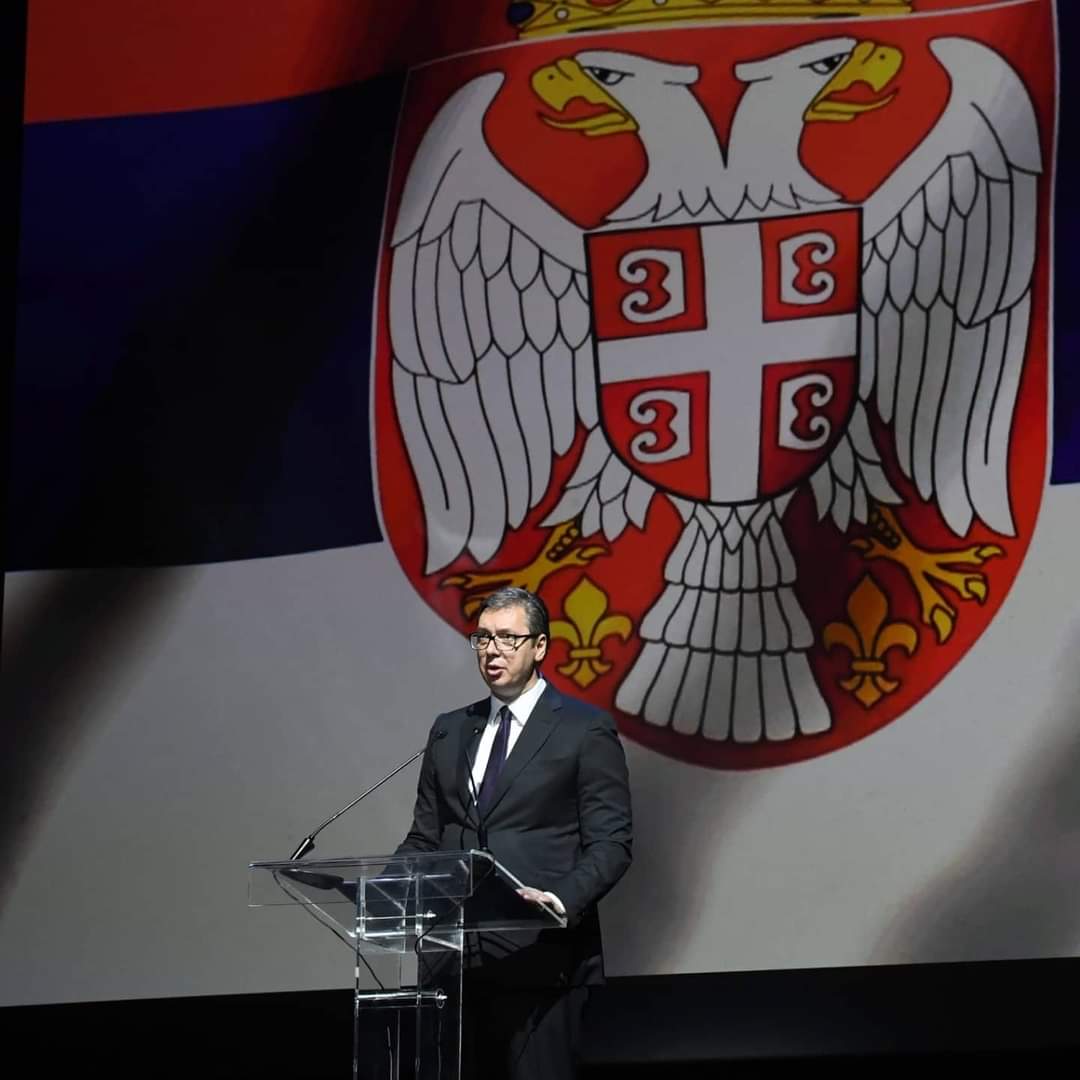
24 March 2021
Marking the Day of Remembrance of the victims of the NATO aggression
President of the Republic of Serbia Aleksandar Vucic made a statement on the occasion of marking the Day of Remembrance of the victims of the NATO aggression.
"Your Holiness, distinguished Chairman of the Presidency of Bosnia and Herzegovina, distinguished Speakers of the National Assemblies of the Republic of Serbia and the Republic of Srpska, distinguished Prime Ministers of the Republic of Serbia and the Republic of Srpska, distinguished Ministers of both Governments, dear guests and friends, representatives of the Serbian People from Montenegro, North Macedonia, Croatia, thank you for the fact that we are all together tonight and that the Serbian spirit is unbreakable and invincible.
One child a day and a little more than that. That is the most difficult, sickening and painful number of the NATO aggression from 1999. Killed, stopped, guilty of nothing, having committed no sin, without the right to defence, without the right to justice and without the right to life.
No one has ever been held accountable for this crime, a crime greater than a crime. No one, for the 2,500 killed civilians, but also soldiers and policemen who were only guilty of guarding, protecting themselves and their homes. No one has ever been held accountable for more than 6,000 persons injured.
Even today, 22 years after the aggression, it is not possible to explain that, there is no universal justification, despite all the work done to that end, there is no reason, it makes no sense, and only names remain, as eternal as sin.
Miljana Milic, fifteen years old,
Vladimir Milic, twelve years old,
Miomir Mladenovic, fourteen years old,
Dragan Dimic, three years old,
Julijana Brudar, ten years,
Olivera Maksimovic, twelve years old,
Miroslav Knezevic, thirteen years old,
Dajana Pavlovic, five years old,
Stevan Pavlovic, eight years old,
Marko Simic, two years old,
Milica Rakic, three years old,
Ivan Ivancic, seven years old,
Marko Ivanovic, three years old...
And the list goes on, eighty nine names, not only Serbian ones...
The senselessness of sheer killing did not choose. Sixteen children, aged two to seventeen, from the Ahmetaj and Hasani families, were killed in a convoy returning home to Prizren.
In one headline in the West, this was simply explained as a "tragic mistake". The deaths of Marko Roglic, Milan Ignjatovic, Gordana Nikolic, Irena Mitic, Milica Stojanovic, Bojana Tosovic, Branimir Stanijanovic, our Sanja Milenkovic...could not expect or get even such an explanation.
Those deaths were not tragic, for those who caused them, much less a mistake. It was just an excuse, a miserable excuse.
They were a result of intent and a clear decision, as a severe judgment against one country, its people, its children.
And that is why today we will refrain from speculation in giving a name to everything that happened during the spring of 1999. Because a crime happened, a heinous and terrible one. And it was an aggression, not a bombing, not an intervention, not a campaign, not an operation. An aggression is what happened. An attack on a sovereign country, without a decision of the United Nations, without a sufficient reason that would justify attacking the then Yugoslavia or a neighbouring or NATO country.
No one was attacked by Serbia or the Federal Republic of Yugoslavia at that time. They attacked us, with one goal. To defeat us, to keep killing us, and in the end to take away a part of our territory.
And no matter how much we analyze things today, no matter how harsh and critical we are towards ourselves, our policy and leadership at the time, it is clear that the Federal Republic of Yugoslavia and Serbia were left with almost no choice then. The choice was horrible, either the loss of territory and people on the one hand, or the complete disappearance of the Serbian state, morals, honour, Serbian spirit, names and surnames. And we could not help but lose. Nineteen big ones attacked one small country, the Federal Republic of Yugoslavia. They attacked both Serbia and Montenegro. And even when they don't talk about it today, in one of the two independent countries, those are the facts. And that small country, and that small nation, to all nineteen of them so great and powerful, held a lesson in what matters most - honour, morals and love for freedom that a nation can have.
Yes, justice, lest we forget justice. All those nineteen great ones today still silently talk about their military success, avoid answering questions, while - can you imagine, one small, only numerically small Serbian people, that small but magnificent nation, with sadness, tears in their eyes, proudly remembers their resistance and struggle against the nineteen cruel and arrogant ones.
We lost a lot, we lost our fathers, brothers, spouses, children, but the honour and Serbian heart are still there, to protect Serbia, which is eternal and indestructible.
We lost children, we lost people, we lost control over a large part of the territory, we lost billions because of the destroyed infrastructure and economy.
And all that was left for us was the body of a tortured, destroyed country, a country in disintegration, mutilated, looted, wounded, deserted, and guilty, condemned for everything that happened not only in the 1990s, but throughout history.
A country that, even ten years after the aggression, did not have the strength to stand up, rise to its feet, and do anything but be silent, or bow its head and obediently apologize, for everything, even for its dead, even for its murdered children.
Today, it is no longer that failed, tortured, devastated, mutilated Serbia.
Today, it is Serbia, which has found its strength and its pride again.
Serbia, which calls things by their real names.
Serbia, which turned its back on war and defeats, and started working.
Serbia, which rose to stand on its own feet and has a voice of its own.
Serbia, which, even when they don't believe it, they listen to. Which is capable, which is growing, and is no longer part of the problem. Serbia, which is and will be, at least we will do our best to this end, the very solution that enables the entire region to live in peace and understanding.
And that Serbia, today, when there are still many more bombs in the world than vaccines, sends not bombs, but precisely those vaccines to the region. Today, it is ready to produce them as well, and in just a few months we will do just that, but not only for ourselves, but also for others, for the entire Balkans.
We are ready, and we are willing to help.
We are not ready to be and we will not be silent, nor be humiliated again.
We draw the right to that not only from the victims we had, but also from the fact that we stopped looking at others only a long time ago, and looking for fault and guilt only in them, and not sometimes in ourselves as well.
We looked at each other and admitted. Every loss, every defeat and every crime that someone committed in our name, every failure and every wrong policy.
And we are no longer doing anything that could endanger anyone.
We continue to work and work, and grow more and more, gaining strength with only one goal - to be the best in economy and education, health, in culture, science, sports...
And we want to be safe, on our own. We want our army to be much stronger than it was in 1999. So that we never again face a situation that someone is killing our children, destroying the country, or expelling our people.
We want to remain free, to decide our own destiny, and for no one to take everything away from us ever again, and give us nothing.
And that nothing today, and I will repeat it as much as necessary, is the idea of some great, powerful ones, but also those who serve them, the idea that "Kosovo" should recognize us, so that we could recognize "Kosovo".
We do not need that recognition. And Serbia will not allow you to walk over our victims, our history, our past, but also to walk over our future. You will get the answer of reasonable, kind and responsible people. We need a compromise. We need all the obligations that we and Pristina have assumed to be fulfilled, but only we have fulfilled them so far.
And this is not our whim. It is not a phantasmagoria about a Serbian world that we want to create.
Even today, when they threaten us with the formation of a Greater Albania, when they say that the Community of Serb Municipalities is not going to happen, it is ours to be calm, to take care of our people in Kosovo and Metohija, but to send a clear message to all those great, powerful ones that we are not as weak as we were, that we will be able to preserve what is our own, not touching anything that belongs to anyone else. After all, Serbia is not and will not be but a handful of oats that every crow from the whole wide world can eat. As for those who used the strength and power of the nineteen arrogant and cruel ones, I only ask them not to threaten us. Please, please, don't threaten us. They should not think that Serbia is broken and that it will not have the strength to respond. Please, please, our Albanian neighbours, do not threaten us. And we ask all others, who have demonstrated their cruelty towards Serbia, not to help you in that. That is all we are asking and nothing more.
And we will respond to calls for peace, calls for compromise, and always with good will, because we do not want to have children killed again. And we do not want the children of others to suffer again. But do not underestimate Serbia, and do not look at Serbia with the same eyes as you did in 1999.
Today, Serbia is much stronger, much more powerful. Today, Serbia is a united country of togetherness, not a divided one. Today, Serbia is incomparably stronger and better in every aspect than it was in 1999, from the economy to our army. And we will never threaten anyone, we just ask you and request from you to respect us and nothing more.
Today, we are building roads that will connect us, among ourselves, with the region and with the world. Until the end of the year, we will work on eight motorways, on eight routes in the entire Balkans, not only Serbia, eight roads of peace and cooperation.
Only a crazy person would trade this for war, for dead children, for demolition and new loss. And yes, we want to have the closest relations with everyone who took part in the aggression against our beautiful Serbia, we have forgiven a long time ago, but no, we will never forget. And don't ask us to. That one day, every year, we will remind both ourselves and you. The nineteen of you, the most powerful, strongest, greatest in terms of might and force, but not so much when it comes to honour and morality. We will keep remind you and ourselves, just so it would never happen again. Not to us only, but to none other freedom-loving people in the world.
And if we have an offer, today it reads as follows: we are ready to make the whole Balkans a winner, for everyone to win, as long as no one tries to make Serbs the only losers.
And the path to this goal is not difficult at all.
We just need to respect and understand each other and not try to humiliate each other.
And not to touch into what everyone paid the highest and bloodies price for. Freedom. And we, Serbs, know the price of freedom.
Into our right to have it, to keep it and to remember all the victims who are part of it.
And our defeats, our lives and our children are built into ours. And the lives of our heroic pilots, and our giants from Kosare and Pastrik, and our children, innocent, completely innocent, and only guilty of living in Serbia.
This is too high a price to be quiet about it.
Because that would mean that we are ready for another defeat, for another humiliation.
And we are not.
And when all go quiet, we will keep repeating.
A child a day, and a little more. This was how much you killed us. In an aggression that even you did not understand why you carried it out.
And we will keep repeating this, just so it does not happen to us again.
With special reverence, we are fulfilling our obligation to pay tribute to all innocent Serbian victims who laid their lives on the altar of the homeland, both civilians and our heroic soldiers and policemen, the heroes of Kosare, Prizren, Mitrovica.
Today, for us Serbs, life in Kosovo and Metohija is like Via Dolorosa, using their last strength on the road to Golgotha, but we would not be Serbs if we were not capable to "exist in a terrible place".
And today, tonight, I can conclude with one important sentence. On the soil of Europe, there was, and today is stronger than ever, an indomitable, unwavering, unconquerable and never conquered Serbia.
May eternal glory be to all the victims of the NATO aggression and let us all exclaim together - long live free and proud Serbia", President Vucic said.
Source:www.predsednik.rs
Photo:www.predsednik.rs
|
|
|
| Commemorating Remembrance Day of 17 March 2004 - Pogrom in Kosovo and Metohija |
|
Commemorating Remembrance Day of 17 March 2004 - Pogrom in Kosovo and Metohija
President of the Republic of Serbia Aleksandar Vucic participated today in the commemoration of the Remembrance Day of 17 March 2004 - Pogrom in Kosovo and Metohija. He said that exactly 17 years ago, a pogrom took place in Kosovo and Metohija, and that pogrom surpassed all other crimes.
"There may be times when we are powerless to prevent injustice, but there must never be a time when we fail to protest, these words of Elie Wiesel, a camp survivor and Nobel laureate, make it forever incumbent upon us not to remain silent against crime, regardless of who and for what reason committed it", President Vucic stated and added that we remembered and learned every lesson in which we were losers, each one in which we were silent to our own victims, and each one when we were ready to forget.
"Serbia is no longer weak today, nor is it a country of losers, it does not threaten, but it does not forget either, it is ready for talks, but not for humiliation. Serbia, just like everyone else, has the right to take care of its people, their safety and well-being. The right to life is a fundamental human right and we will always defend it", President Vucic said.
President Vucic said that pogrom surpasses all other crimes, because it is not only an act, but an intention, a policy, a premediated attempt to forcibly cleanse persons belonging to other peoples and faiths from a region or a country.
"We have no right to remain silent to that", said the President of Serbia, emphasizing that we have an obligation to be winners without blood spilled and war, to be the best in the economy, healthcare, sports, education and everything else that implies development and progress.
"We also wish others to work on themselves and be successful, because we are aware that crime is a tool for losers that winners do not need, as they remember, but forgive and move on, while the losers keep spinning in the same vicious circle. We Serbs do not want to be that anymore, we want a future in which we will remember, but from which we will not return. We know what happened and we call it by its real name", President Vucic concluded.
Photo: Dimitrije Goll |
|
|
| Farewell visit of the Ambassador of the Federal Republic of Nigeria |
|
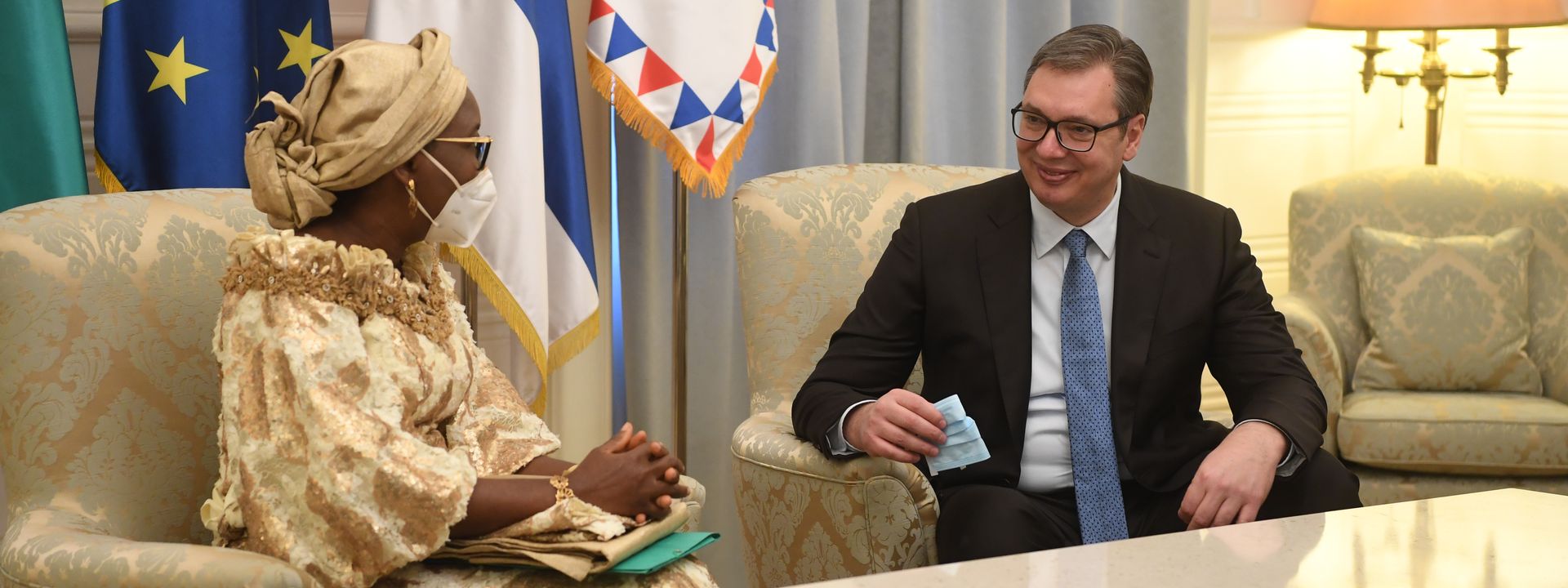
Farewell visit of the Ambassador of the Federal Republic of Nigeria
President of the Republic of Serbia Aleksandar Vučić met today for a farewell visit with the non-resident Ambassador of the Federal Republic of Nigeria, Eniola Olaitan Ajayi, and thanked her for her contribution to strengthening the ties between the two countries.
President Vučić said that Serbia aspires to strengthen the political dialogue and intensify economic cooperation with Nigeria, considering the traditional friendship between Belgrade and Abuja, which originates from the joint activities in the Movement of Non-Aligned Countries. In this regard, he expressed the expectation that the Nigerian embassy could be reopened in our capital so that we would have more frequent contacts, aimed at better utilisation of the vast opportunities for comprehensive cooperation. President Vučić and Ambassador Ajayi emphasised the importance of the educational programme "Serbia and the World", within which students from Nigeria, in addition to our scholarships, study in Serbia, with the possibility of increasing their number.
President Vučić thanked Nigeria for its respect of the international law by upholding the territorial integrity and sovereignty of Serbia, by not recognising the unilaterally declared independence of Kosovo. He sent greetings to President Buhari, expressing hope that the world would win the COVID-19 pandemic with joint forces and mutual solidarity.
President Vučić wished Ambassador Ajayi much success in her new position.
Belgrade,
19th March 2021
|
|
|
| Commemorating Remembrance Day of 17 March 2004 - Pogrom in Kosovo and Metohija |
|
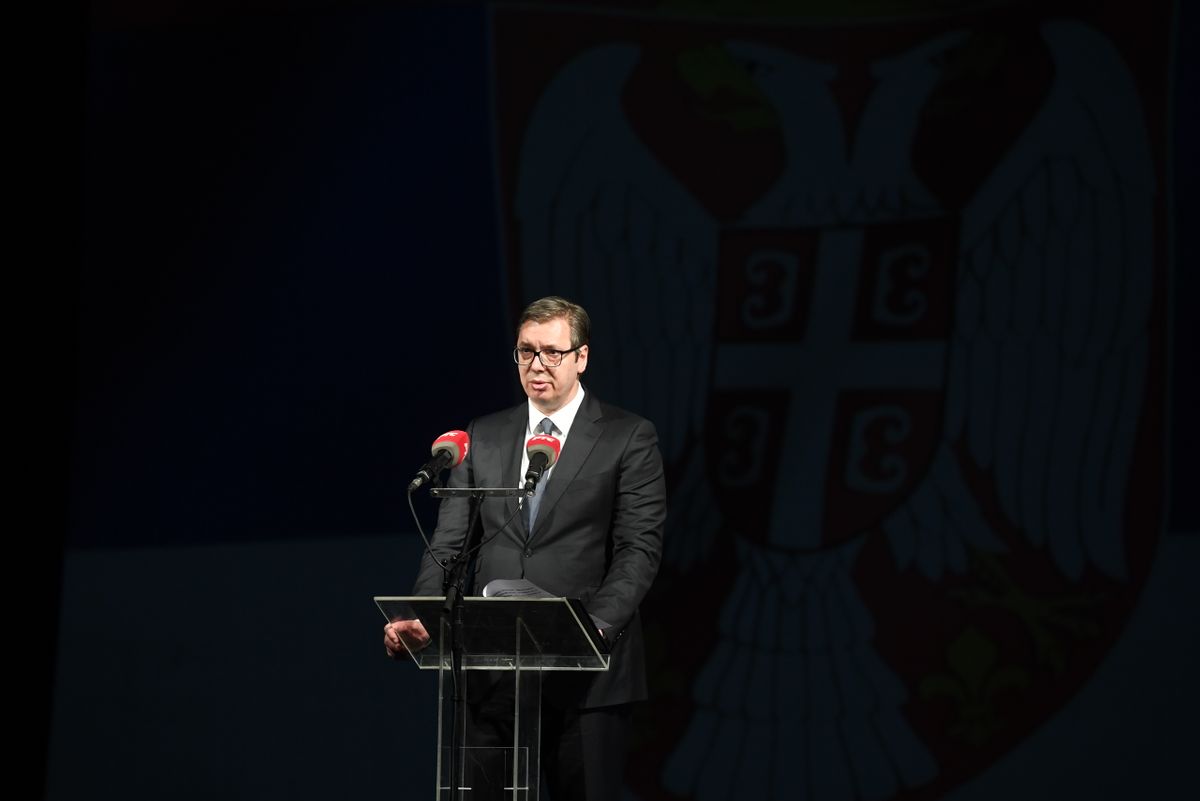
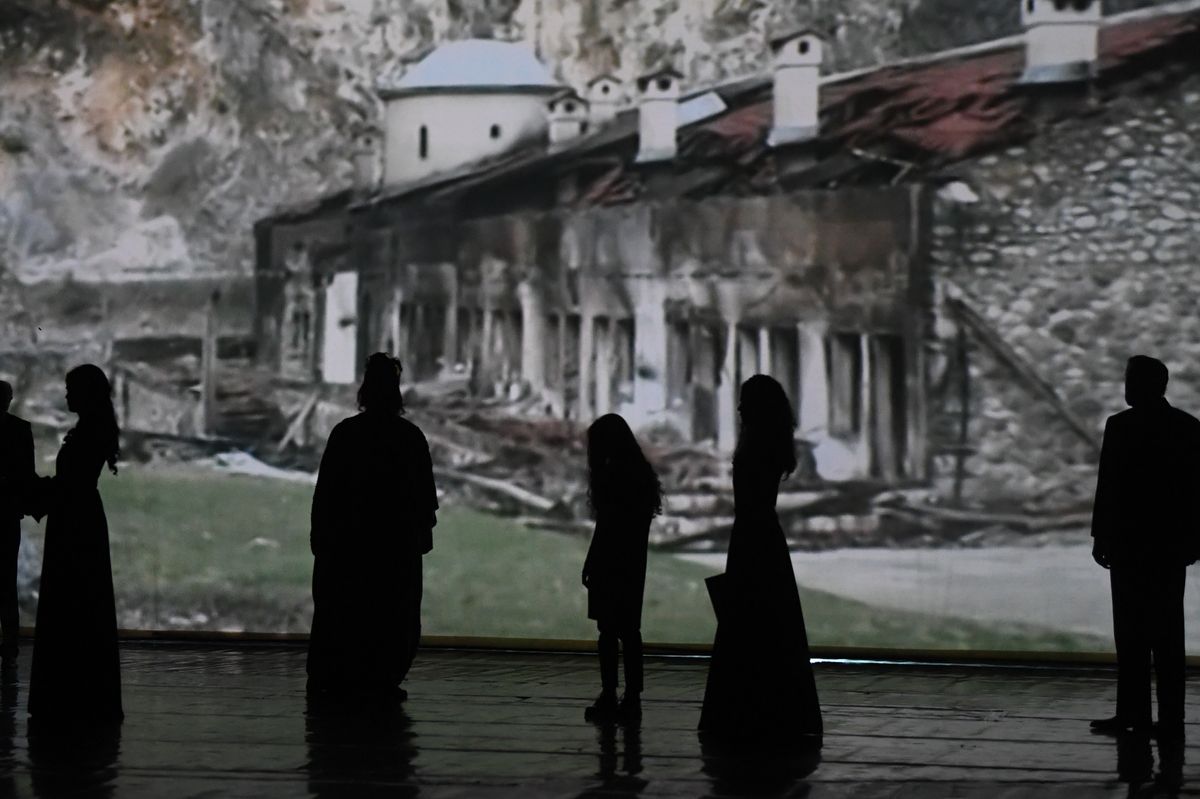
Commemorating Remembrance Day of 17 March 2004 - Pogrom in Kosovo and Metohija
President of the Republic of Serbia Aleksandar Vucic participated today in the commemoration of the Remembrance Day of 17 March 2004 - Pogrom in Kosovo and Metohija. He said that exactly 17 years ago, a pogrom took place in Kosovo and Metohija, and that pogrom surpassed all other crimes.
"There may be times when we are powerless to prevent injustice, but there must never be a time when we fail to protest, these words of Elie Wiesel, a camp survivor and Nobel laureate, make it forever incumbent upon us not to remain silent against crime, regardless of who and for what reason committed it", President Vucic stated and added that we remembered and learned every lesson in which we were losers, each one in which we were silent to our own victims, and each one when we were ready to forget.
"Serbia is no longer weak today, nor is it a country of losers, it does not threaten, but it does not forget either, it is ready for talks, but not for humiliation. Serbia, just like everyone else, has the right to take care of its people, their safety and well-being. The right to life is a fundamental human right and we will always defend it", President Vucic said.
President Vucic said that pogrom surpasses all other crimes, because it is not only an act, but an intention, a policy, a premediated attempt to forcibly cleanse persons belonging to other peoples and faiths from a region or a country.
"We have no right to remain silent to that", said the President of Serbia, emphasizing that we have an obligation to be winners without blood spilled and war, to be the best in the economy, healthcare, sports, education and everything else that implies development and progress.
"We also wish others to work on themselves and be successful, because we are aware that crime is a tool for losers that winners do not need, as they remember, but forgive and move on, while the losers keep spinning in the same vicious circle. We Serbs do not want to be that anymore, we want a future in which we will remember, but from which we will not return. We know what happened and we call it by its real name", President Vucic concluded.
Photo: Dimitrije Goll |
|
|
| La République de Serbie au Mois de la Francophonie |
|
La République de Serbie en qualité de membre associé à l'OIF, de concert avec toute la communauté francophone dans le monde entier, célèbre le Mois de la Francophonie. Pour tous les amateurs de la culture serbe et de la langue française, le Ministère de la Culture et de l'Information de la République de Serbie a préparé un vaste programme et L’Ambassade/la Mission permanente/le Consulat de la République de Serbie à Abuja vous invite à découvrir la diversité et la richesse de la culture serbe en français.
trouvez ici |
|
|
| Need to intensify political dialogue and economic cooperation with Nigeria |
|
Need to intensify political dialogue and economic cooperation with Nigeria
Minister of Foreign Affairs of the Republic of Serbia Nikola Selakovic received today a farewell call from the non-resident Ambassador of the Federal Republic of Nigeria, Eniola Olaitan Ajayi.
Minister Selakovic noted that the bilateral relations were good and expressed readiness for their strengthening in numerous areas. The Head of Serbian diplomacy said that it was necessary to intensify mutual political dialogue and, in that context, he extended an invitation to the Minister of Foreign Affairs of Nigeria for a visit to Serbia.
Furthermore, Minister Selakovic expressed the expectation that Nigeria would again have a diplomatic presence in Serbia and, aiming to strengthen bilateral relations, re-open the embassy in our country.
Selakovic thanked Nigeria for its principled position concerning non-recognition of the unilaterally declared independence of the so-called Kosovo and said that our country was committed to the further development of multilateral cooperation through closer coordination, exchange of information and exchange of support in international organizations.
Discussing economic cooperation, Selakovic pointed out that there was a significant potential for its promotion, as well as that Serbia was willing to hear Nigeria out regarding its specific needs and priorities, in order to enhance cooperation in the interest of both countries. The areas that were underlined include IT, food industry, construction, machine industry, etc.
Minister Selakovic expressed interest in developing contacts in the fields of culture, education and sports.
On this occasion, Selakovic extended his congratulations on the election of the representative of Nigeria, Ngozi Okonjo-Iweala, as the seventh Director-General of the World Trade Organization.
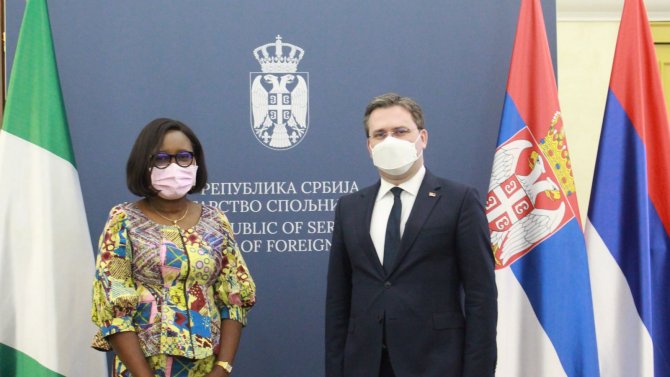
Belgrade,
15 March 2021 |
|
|
| Selakovic: Fight against all forms of crime is a priority of the Serbian Government |
|
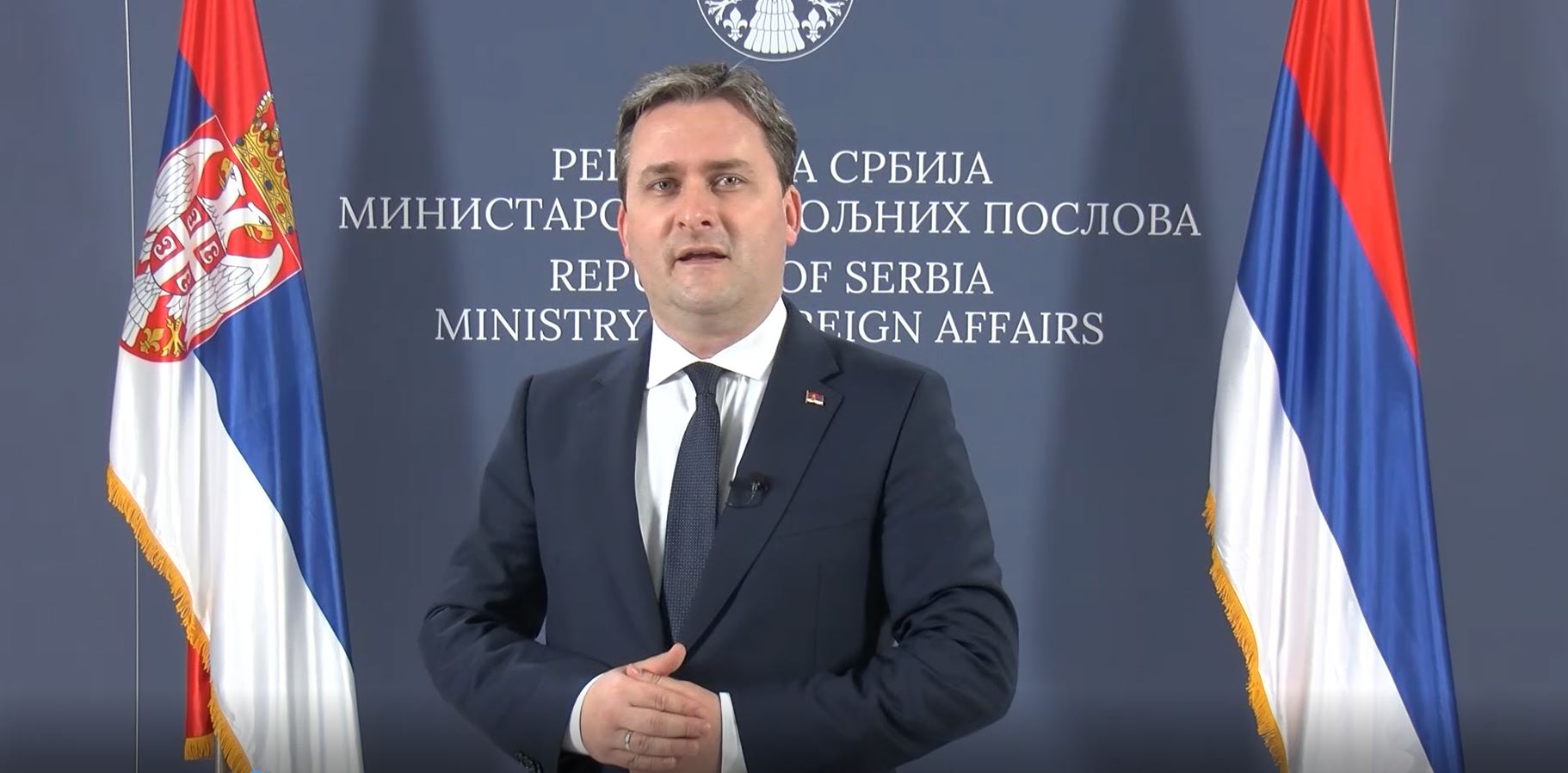
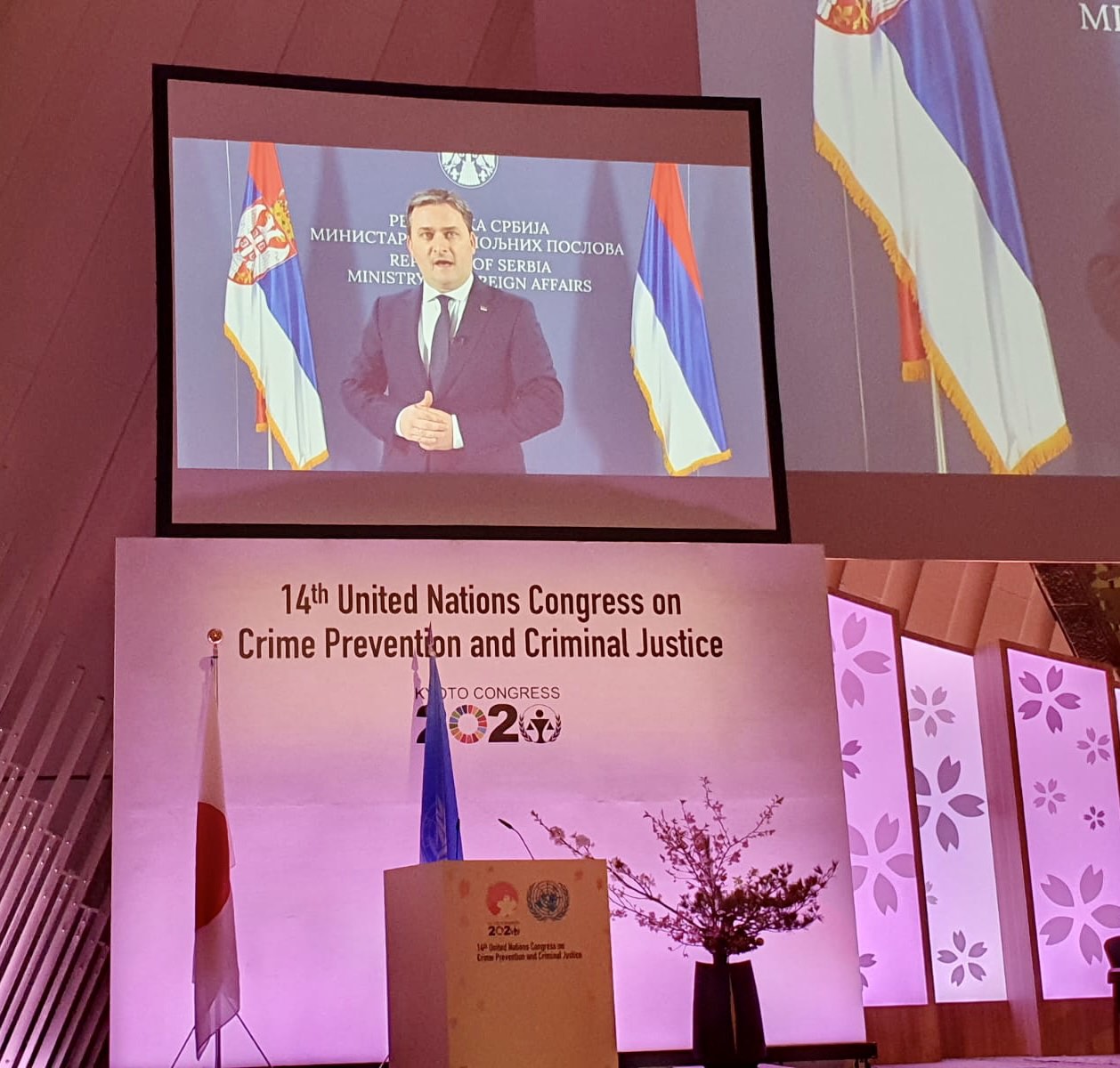
8 March 2021
Selakovic: Fight against all forms of crime is a priority of the Serbian Government
Minister of Foreign Affairs of Serbia Nikola Selakovic said today that the fight against all forms of crime was a top priority of the Serbian Government and an integral part of the EU accession process.
"It is also our moral duty, in order to leave a better world for the generations to come", Selakovic said participating via video-link at the 14th UN Congress on Crime Prevention and Criminal Justice, held in Kyoto.
Minister Selakovic emphasized that Serbia, in its Second Serious and Organized Crime Threat Assessment from 2019, identified as its goal to eliminate cybercrime, human trafficking, terrorism and irregular migration.
The Serbian Foreign Minister pointed out that our country had established in a timely manner a normative and institutional framework that regulates prevention of abuse in this area, as well as that the Office of the Special Prosecutor for Cybercrime, a special court department and a special police unit were established.
The Minister underlined that, in the field of the fight against corruption, Serbia was guided by the postulates set out in the UN Convention against Transnational Organized Crime and the UN Convention against Corruption.
Selakovic pointed out the efforts made by the Anti-Corruption Agency, as an independent state body, to protect the public interest, build individual and institutional integrity, strengthen transparency and accountability of the public administration.
"We strongly condemn all forms of terrorism, including extremism and radicalism, and call for them to be fully eradicated, while implementing the relevant UN resolutions and conventions and the UN Global Counter-Terrorism Strategy", the Head of Serbian diplomacy underscored.
In order to combat these complex phenomena efficiently and successfully, Selakovic said, it was of vital importance to build capacities of our societies and states, while exchanging experiences at the regional and global levels.
Minister Selakovic thanked Japanese Ambassador Hikihara for the skill he showed in conducting the talks on harmonizing and adopting the Kyoto Declaration, which, as he stressed, was an important indicator of the commitment to creating and maintaining the institutional framework for crime prevention as one of the main preconditions for promoting sustainable development goals.
"Back in 1970 when Japan hosted this event for the first time, we demonstrated strong political will to draw attention to the problem. Today, it is incumbent upon us to reaffirm this willingness and resolve and translate it into concrete steps", the Serbian Foreign Minister said.
https://ssl.gstatic.com/ui/v1/icons/mail/images/cleardot.gif |
|
|
| Metropolitan Porfirije of Zagreb and Ljubljana elected as the new Patriarch of Serbia |
|
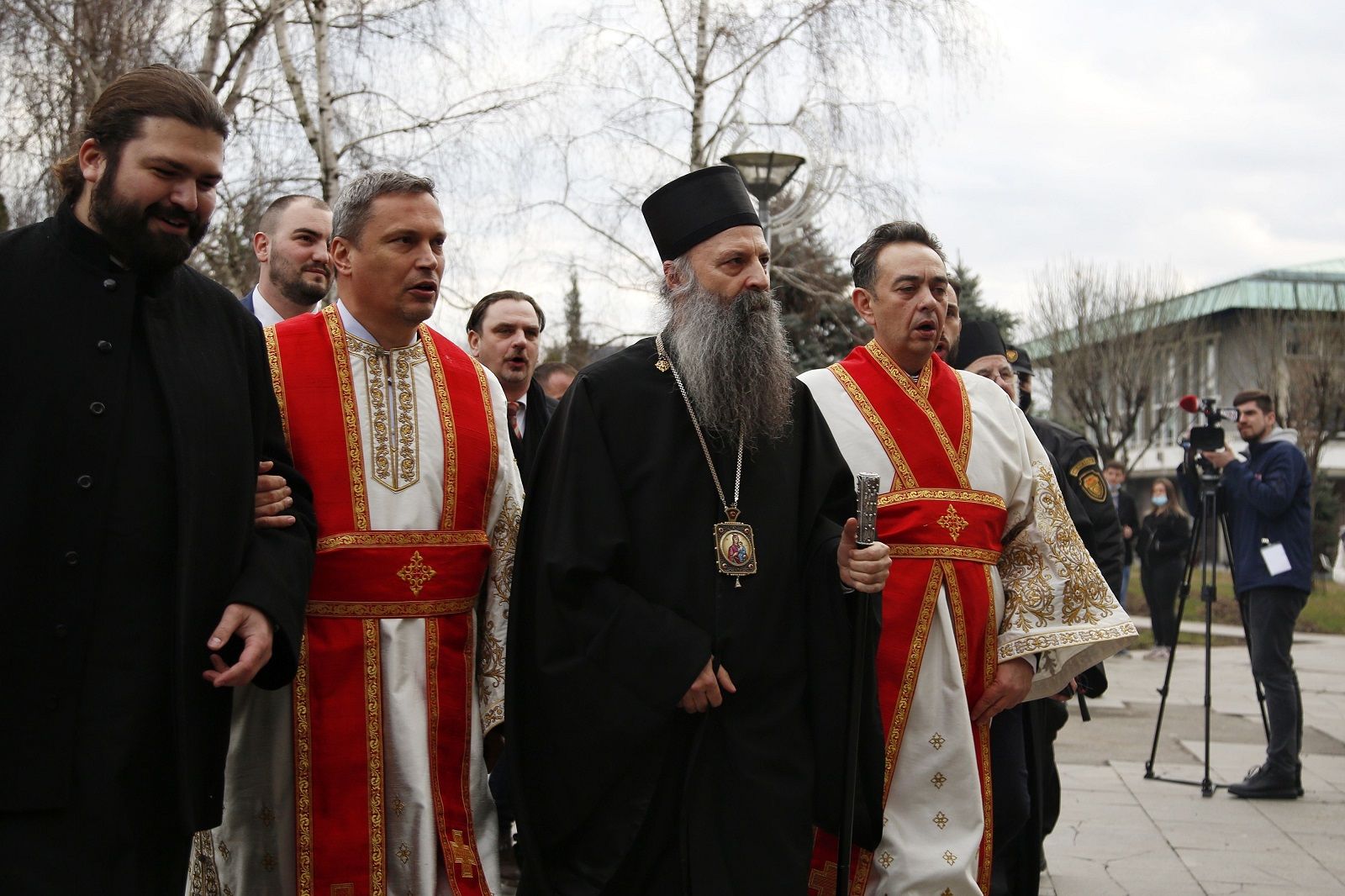
18 February 2021
Metropolitan Porfirije of Zagreb and Ljubljana elected as the new Patriarch of Serbia
The Holy Assembly of Bishops of the Serbian Orthodox Church elected His Eminence Metropolitan Porfirije of Zagreb-Ljubljana, PhD, as the new Serbian Patriarch, in its convocation in Memorial Cathedral of Saint Sava in Belgrade on 18 February 2021.
Immediately after the election a thanksgiving service was officiated and Many Years was chanted to the Archbishop of Pec, Metropolitan of Belgrade-Karlovci and Serbian Patriarch Porfirije. Bells at Saint Sava Cathedral in the Vracar district of Belgrade rang a few minutes before 4:00 pm indicating that the 46th Patriarch of Serbia was elected.
Newly-elected Archbishop of Pec, Metropolitan of Belgrade-Karlovci and Serbian Patriarch Porfirije (Peric) was born on 22 July 1961 in Becej, to father Radivoje and Mother Radojka. He was baptized as Prvoslav. He finished primary school in Curug, and the “Jovan Jovanovic Zmaj” Grammar School in Novi Sad. He was ordained a monk according to the rite of small schime by his spiritual father, then hieromonk Dr. Irinej (Bulovic), at Decani Monastery on Sunday of St. Thomas in 1985.
He graduated from the Faculty of Orthodox Theology in Belgrade in 1986, when the then Bishop of Raska-Prizren Diocese, future Serbian Patriarch Pavle of blessed memory, ordained him a hierodeacon at the monastery of Holy Trinity in Musutiste.
He attended postgraduate studies in Athens from 1986 until 1990. That year, upon the blessing of Bishop Dr. Irinej of Backa, he joined the monastery of Holy Archangels in Kovilj, where he was ordained as hieromonk and became its abbot.
Many young monks and novices came to the monastery following him. These were the years when the Kovilj Monastery became a spiritual center for many young people: intellectuals, artists, popular actors and rock musicians, especially from Novi Sad and Belgrade. Since then abbot Porfirije has particularly dealt with drug-addicted patients. In 2005, he formed for this purpose a therapeutic community called “The Land of the Living”, which is recognized as the most successful drug-addiction therapy project and, under the leadership of Bishop Porfirije, it has more than a hundred residents in camps throughout Serbia today.
During the ordinary meeting of the Holy Assembly of Bishops of the Serbian Orthodox Church in Belgrade on 14 May 1999 he was elected as Bishop of Jegar, Vicar of the Diocese of Backa.
He defended his PhD thesis Possibility of knowability of God in St. Paul’s understanding according to the interpretation of Saint John Chrysostom at the Faculty of Theology of the University of Athens in 2004.
He became a lecturer at the Faculty of Orthodox Theology - Department of Pastoral Psychology - succeeding famous psychiatrist, academician Dr. Vladeta Jerotic. His lectures have been attended not only by students of the Faculty of Orthodox Theology, but other Belgrade faculties as well.
Together with a group of experts: psychologists, doctors, criminologists, sociologists, Bishop Porfirije founded a civic association that deals with the resocialization of victims of destructive religious sects and cults.
Bishop Porfirije has not been just president of the Steering Board for a decade, but a real spiritus movens of the Humanitarian Fund “Privrednik”, which has provided scholarships for a great number of gifted, but poor pupils and students, regardless of their nationality or religious affiliation.
In 2005, the National Assembly elected him as representative of all Churches and religious communities, to be a member of the Council of the Republic Broadcasting Agency, and in 2008 the RBA elected him its president. As President of the Council of the Republic Broadcasting Agency, Bishop Porfirije supported the long-term interests of society and citizens, unaffected by political influences.
Since then, church radio stations have been heard in the broadcasting spectrum of Serbia. He has made a key contribution to launching of a series of radio and television shows dealing with religious topics.
In 2010, The Holy Assembly of Bishops entrusted him to establish military chaplaincy in the Serbian Armed Forces. The fruits of his labour in that field include not only the suitable legal regulations, but also the selection of military chaplains, the organization and equipping of churches at barracks and performance of the first religious services.
His expert theological works Bishop Porfirije published in magazines both in Serbia and abroad. He participated in a large number of scientific conferences and symposia across the globe.
Bishop Porfirije, as one of the most prominent contemporary Serbian clergymen and intellectuals, has an extremely wide circle of friends, not only in the Homeland, and he fosters personal friendship and close cooperation with priests and representatives of other Churches and religious communities.
He speaks Greek, English, German and uses the Russian language, while his style of communication is always adapted to his interlocutors.
He was enthroned as the Metropolitan of Zagreb and Ljubljana on 13 July 2014 in the Cathedral Church of the Transfiguration of the Lord in Zagreb. The solemn Hierarchal Liturgy was served by Serbian Patriarch Irinej, accompanied by a large number of archbishops of the Serbian Church and other sister Churches, as well as priests and monks, and pious people.
Source: SPC/Serbian Orthodox Church |
|
|
| President Vucic: Serbia is ready for dialogue on Kosovo and Metohija, but will refuse being humiliated |
|
President Vucic: Serbia is ready for dialogue on Kosovo and Metohija, but will refuse being humiliated
President of the Republic and Supreme Commander of the Serbian Army Aleksandar Vucic attended a demonstration of capabilities of one part of Serbian Army units in the "Rastko Nemanjić" barracks in Pancevo. On this occasion, President Vucic stated that Serbia was ready to continue the EU-facilitated dialogue with Pristina at any point, while respecting also the position of the United States as well as the positions of Russia and China.
The President said that he would rather put his "head on the chopping block" than sign any document with a recognition and reminded that he had already once refused to do so in Washington, where there were two versions of the agreement.
He stated that he immediately had his delegation leave the meeting, that he told the U.S. delegation that Serbia would not sign such an agreement, while conveying that Serbia would always endeavour to hold peaceful talks in order to preserve peace, but that it would not take any humiliation.
The Serbian President thanked the U.S. President Joe Biden for the letter of congratulations on the occasion of the upcoming Statehood Day, in which, in addition to the usual emphasis on commitment to promoting economic cooperation, regional stability and democratic values, he unequivocally called for mutual recognition of Serbia and "Kosovo" as a result.
Mutual recognition between Serbia and "Kosovo" is not part of any act of any world organization, the President pointed out and reiterated that Serbia was ready to continue the EU-facilitated dialogue with Pristina at any point, while respecting also the position of the United States as well as the positions of Russia and China.
According to the president, the situation is difficult and will only be increasingly difficult.
"As I told you three days ago, I can see it and I expect it, I can see the situation slowly tightening, because the conflicts between them at the global level have been increasing and intensifying, and then we have to pay the price", the President said.
President Vucic said that said that it was up to our state to continue strengthening the country in the economic sense.
The President added that the role of the army was very important in the highly complex security and political conditions of the modern world, and that was why Serbia needed to do everything it could to deter any potential aggressor and attacks on citizens and the country.
"The policy of strengthening the armed forces will continue at a faster pace", the President emphasized, adding that the goal was for the Serbian Army to play a stabilizing role with regard to the political developments in the region.
According to him, it should be clear to everyone that Serbia was not a punching bag and that not everyone could attack and threaten it like it was the case in the past.
Vucic said that he was pleased with what he saw and that a lot had been done in the previous period, pointing out that the salaries of military personnel would be significantly increased as of April.
President Vucic also stated that investments in the Serbian Army would continue, whom he told that he expected the Army to continue to be the guardian of our country, its integrity and freedom.
"We expect you to be the guardians of our country, its integrity and freedom, the defenders of our people, the guardians of the homeland, the protectors of the interests of the state of Serbia and to be a deterrent factor for every aggressor and anyone who might consider attacking Serbia", Vucic said.
The military exercise called "Spearhead" demostrated the capabilities of the 72nd Special Operations Brigade, and the event, which the President of Serbia and the Supreme Commander of the Serbian Army assessed as very good, was also attended by Deputy Prime Minister and Minister of Defence Nebojsa Stefanovic and Chief of General Staff of the Serbian Armed Forces, General Milan Mojsilovic.
Photo: Presidency of Serbia / Dimitrije Goll
Belgrade,
7 February 2021
|
|
|
| Minister Selakovic speaks for Politika: The year of rejuvenation of Serbian diplomacy |
|
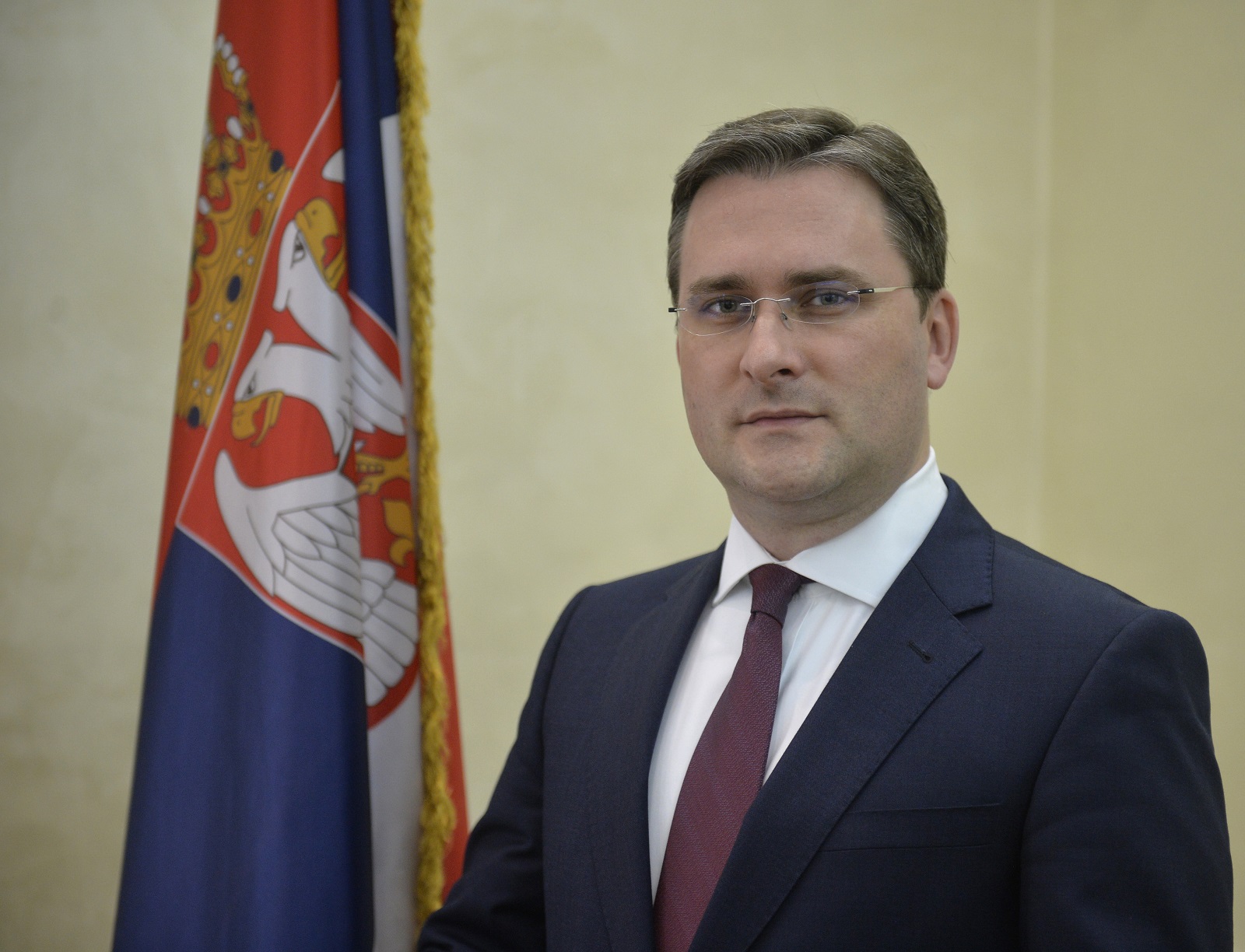
26 January 2021
Minister Selakovic speaks for Politika: The year of rejuvenation of Serbian diplomacy
Serbia's foreign policy positions are naturally being adjusted to the new developments at the international level, but our foreign policy priorities have not changed in a long time. Our top and most important interest is to preserve good-neighbourly relations and stability and peace in the region and, in the same context, to find a peaceful and just solution to the problems in Kosovo and Metohija, Serbian Foreign Minister Nikola Selakovic said in an interview with Politika daily.
Another lasting interest of ours is full membership of the European Union, because this is the type of society we strive for. At the bilateral level, our goal is to strengthen ties with traditional friends, the Russian Federation and the People's Republic of China, but also to build new partner relations with the United States. One of the most important tasks of our foreign policy is to improve the position and protect the rights and identity of our people in the region, as well as to provide various types of support to Serbs in the diaspora. All these are very important and more often than not complementary goals, Nikola Selakovic pointed out.
What kind of relations do you expect Serbia to have with the new U.S. administration?
It is too early to speculate about this in public. The new presidential administration in Washington is currently preoccupied with internal issues and this will be the case for some time. There are people in the team of President Joseph Biden who have dealt with our region, and it is likely that the Balkans and Serbia will be the focus of the U.S. foreign policy at some point. I will remind you that President Vucic and President Biden not so long ago had very substantive talks in Belgrade, after which our President stated that he had the opportunity to talk to someone extremely well acquainted with the situation in this part of the world and an extraordinarily prepared interlocutor. Taking their personal relationship into account, but also the importance of enhancing the ties between Serbia and the United States, we have reason to expect that a meeting between the two presidents will be organized in the foreseeable future. I am sure that the nature and dynamics of the relations between Serbia and the United States will be influenced by the fact that Ambassador Marko Djuric now represents us in Washington, whose presence at President Biden's inauguration ceremony is an important signal and, I believe, a harbinger of positive developments in bilateral relations between our two countries.
How would you describe our country's relations with Moscow, Brussels and Beijing?
Russia is our traditional friend and that friendship goes beyond merely political ties. These are deep spiritual, cultural and civilizational bonds, and it is only natural that we have a mutual interest in improving those ties, even though they are at a very high level. We have a relationship with the People's Republic of China which is, in addition to the sincere iron-clad friendship between our peoples and high political representatives, based on deep trust and mutual support. Full membership of the European Union is Serbia's strategic orientation that all our friends are aware of, but our country does not forget its friendships, but strengthens and promotes them instead, and approaches all with honesty and no ulterior motives. In this context, we do not seek any preferential treatment, but only the right to freely and independently make decisions about our future and relations with all who respect us.
Could Serbia pursue a different foreign policy than the one it is pursuing at the moment?
It is always possible to have a different policy, just look at the foreign policy of Serbia ten, twenty or thirty years ago, examine the results at that time and you will realize how irretrievably expensive that policy turned out to be. Whether a policy is right, at either foreign or domestic level, is measured through its results and effect on the lives of citizens and the fate of the entire state.
Our foreign policy priorities are not being defined on a whim, but are instead the result of a serious and deep examination of our complex position and strategic thinking about ways to improve it. Today, Serbia has a better international reputation and credibility than two decades ago, and the main reason for that is that our results have shown how serious and responsible we are as a country. That kind of credibility is not achieved by trickery, but only by hard and well-thought-out work on oneself. And I need to emphasize on this occasion as well that the main inspiration for such an attitude towards politics, the state and its future comes from none other than President Aleksandar Vucic. As Minister of Foreign Affairs, I have the opportunity on a daily basis to see the level of appreciation and respect President Vucic enjoys beyond the borders of our country.
When can we expect the vacant posts of Serbian ambassadors and consuls across the globe to be filled?
That is one of the main tasks for 2021. This will be a year of reinvigoration and I believe also rejuvenation of Serbian diplomacy. Our country, given its size, has a fairly extensive diplomatic network, which provides it with great opportunities for deepening political and economic relations with countries in all parts of the world. But we need more fresh and energetic staff, people who will be the most honourable representatives of a modern and dynamic Serbia. There are such people in Serbia, and we do need a serious rejuvenation, in order to avoid wide generation gaps in our personnel, and to lay the foundations of a modern career diplomacy.
How would you describe your relationship with Serbian President Aleksandar Vucic?
President Vucic and I are, in addition to having close and friendly relations, by virtue of the work we do and our constitutional competencies, the closest collaborators in the realization of Serbia's foreign policy goals. This allows me to talk to him often, and on many occasions learn a lot of new and important things. President Vucic is a man who inspires people around him with his strategic and visionary approach to politics, and I am proud to have had the opportunity to be part of his closest team of associates over the years, and to have had him as a kind of political mentor. In any case, his vision of Serbia as a modern, progressive and prosperous state, which independently and on its own will decides on its destiny, is my wish as well and key motivation for political engagement. For only such Serbia is a country that its own citizens, as well as Serbs beyond our borders, can confidently rely on, while also being an inspiration to the entire region.
Source: Politika |
|
|
| President Vucic: Serbia is the first in Europe in terms of growth |
|
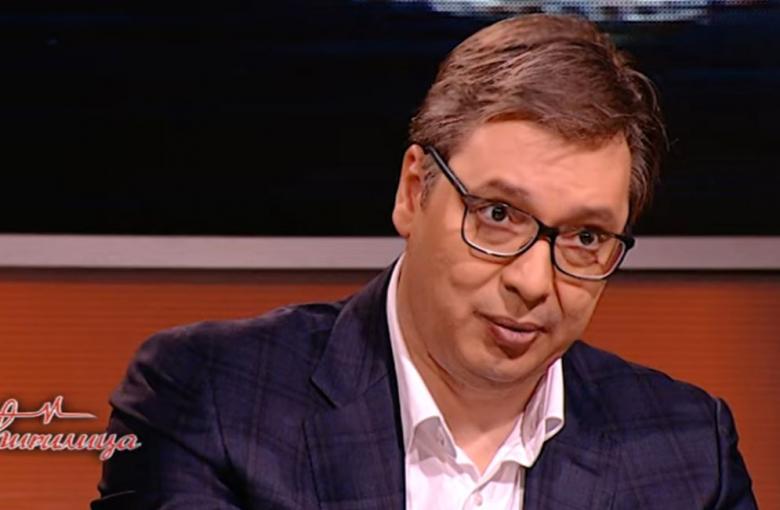
President Vucic: Serbia is the first in Europe in terms of growth
Serbian President Aleksandar Vucic pointed out that Serbia is the first in Europe in terms of economic growth, which will be officially confirmed at the end of March, and that this was possible owing to the reform measures taken since 2014 and the rapid opening of the country after the first wave of corona virus.
The President pointed out that Serbia had a growth of 5.2 percent in the first quarter, while the Eurozone was at minus 3.2 percent, in the second quarter Serbia had a minus оf 6.3 percent, while the Eurozone was at minus 14.7 percent, and in the third quarter, when the Eurozone was at minus 4.3 percent, Serbia's figure was only minus 1.4 percent.
Vucic stated that Montenegro, for example, recorded as much as 26 percent minus in the third quarter.
Furthermore, the President emphasized that hospitals were built and renovated in our country, and that two hospitals were built from the ground up in just four months.
He said that the state made significant efforts to procure respirators, masks, gloves, protective suits, medicines, everything that was needed, and pointed out that work was being done on 10 general hospitals throughout Serbia, adding that all these were major achievements that were only possible owing to the success of the 2014 reforms, the enactment of the Labor Law, which yielded excellent results, and also through fiscal consolidation measures.
"These are unprecedented results for Serbia. Was Serbia ever before the first in Europe in terms of growth rate? We will get the results on 31 March that will confirm that Serbia is number one in Europe. All that was possible thanks to people who believed in difficult changes", Vucic said.
According to the President, this year, as many as six highways will be built in Serbia at the same time, and in this regard, he noted that Bulgaria has announced that the highway from our border to Sofia will be completed by the end of the year, after which it will be possible to use motorway to travel to Istanbul, which is very important to ensure that our country is on a transport route.
President Vucic emphasized that in 2020, the so-called year of corona, our country had a net inflow of foreign direct investment amounting to EUR 2.9 billion net, and three billion gross, which means that many foreign companies such as Toyota Tires, Boysen, ZTF and Brose have invested in Serbia even in this year of crisis.
The President said that Serbia has the highest average wages in the region, amounting to 511 or 512 euros, and that in February, due to the January increase, the average wage will be 535 or 536 euros, and that only in Belgrade in the last seven years the average wage increased by 180 euros or 40 percent.
That President said that Serbia was fourth in the region in terms of salaries before, and that today we are officially the first, and that the difference in relation to other countries will only increase faster. He also pointed out that the employment rate is growing in Serbia as well as that our public debt increased less than in most European countries. This is illustrated by the data that in Italy the public debt surged to 156 percent, in Germany to 87 percent, in France to 114 percent, in Croatia to 88 percent, while in Serbia it is at 57 percent.
The Serbian President announced that by Sretenje, 15 February, an additional package of assistance to the economy will be earmarked, and as he explained, it will be a new capital injection for companies, the trade, entrepreneurs, small, medium and large enterprises which, as he said, concerns 1,052,000 people within that system.
Vucic specified that it will most likely be help in the form of two or three payments amounting to half a minimum wage each, and that there will also be sectoral aid for tourism, hotel owners, travel agencies, guides, for bus carriers, through another half minimum wage payment.
The President added that efforts will be made to extend the guarantee schemes as well, which proved to be excellent, amounting to 1.5 billion, and this time, through the same system, two more portions amounting to 500 million each could be provided.
Vucic said that the first agreements with DFC worth 300 to 400 million dollars are expected in seven days.
He also stated that the state will endeavour to help pensioners further, in addition to increasing pensions by 5.9 percent in January, which will be reflected in their first checks in February, and added that pensioners should by March receive symbolic aid in the form of packages with vitamin C, D and zinc, which, as the President said, are small things, but they reflect the state's care and efforts made to protect health.
The President announced that negotiations on the procurement of the Chinese vaccine would be completed in the next seven to eight days, after the first quantities of the Pfizer and Sputnik V vaccines have arrived in Serbia, and pointed out that the Chinese vaccine was of exceptional quality, but probably the most expensive, which is why he wrote to the Chinese President and asked for a discount for our country.
Vucic thanked the Americans for deciding to sell the vaccine to our country and noted that no one in the region other than Serbia has received it, except for the small quantity that Albania got.
He pointed out that our state relied on itself and its own capacities, and that our state leadership anticipated that vaccines within the European COVAX plan would arrive late.
The President rejected the claims about bad results of Serbia in the fight against the corona virus and stated that our country has recorded the lowest corona virus mortality rate in the region.
He presented statistical information indicating that Slovenia had 144 deaths per 100,000 inhabitants, North Macedonia 126, Bosnia and Herzegovina 123, Bulgaria 115, Montenegro 115, Hungary 110, Croatia 107, Romania 85, and Serbia 51.
"The mortality rate in the region is as follows: Bulgaria 3.9, Bosnia and Herzegovina 3.7, Hungary 3.11, North Macedonia 3.03, Romania 2.48. Slovenia 2.15, Croatia 1.99, Montenegro 1.4, and Serbia 1.0. This can be seen in the graphs and is no fabrication", the President stressed.
He said that the state will fight for vaccines, and that only Serbia, in the Western Balkans, received significant quantities of vaccines, other than a smaller quantity that Albania received, and added that in one day since the registration for vaccination opened, as many as 63,000 persons have registered.
President Vucic expressed his belief that the year ahead will be better than the previous one as well as that the corona virus will be defeated through vaccination of citizens.
Belgrade,
12 January 2021
|
|
|
| Every Serb in the diaspora is potentially a lobbyist |
|
3 January 2021
Every Serb in the diaspora is potentially a lobbyist
Our compatriots living abroad are one of the great potentials that the state has not recognized in the right way so far, which is why a different approach is needed to the issue of how to strengthen our diaspora and use the good will of people who are potential lobbyists for the interests of Serbia and the Serbian people, Foreign Minister Nikola Selakovic said.
"When it comes to Serbs in the diaspora, and especially in the region, this issue has been a kind of an unattended crop which requires a lot of work, and even when a lot is done at once this is not apparent immediately ", Minister Selakovic stated in an interview with Tanjug.
He emphasized that the appointment of the Director of the Office for Cooperation with the Diaspora and Serbs in the Region for the first time after almost seven years since this body was formed within the Ministry of Foreign Affairs, shows that it is one of the priorities of the Ministry he is at the helm of.
Selaković notes that intensive efforts have been long underway on forming a plan to make the diaspora more visible both outside the borders of Serbia and in the mother country itself.
"Every person in the diaspora is a potential lobbyist for the interests of our country and people, and we need to find the right way to use that", he said.
That much can be done in that regar Selakovic illustrates with the fact that only in Switzerland, in 24 cities, there are Serbian cultural and artistic associations which amounts to more than 3,000 young people who get together in order to preserve our tradition, culture, the Serbian language and history.
"If they were able to set up such associations in 24 cities, it speaks volumes about the enthusiasm of these people. There is so much enthusiasm, energy and love in these people. We need to explore ways to help them and use their good will and potential", the Minister points out.
He also cites the example of an emigrant family in Canada, the Varaklic family from southwestern Serbia, who sends Christmas packages for children in the Raska region every year. He adds that they have so far donated hundreds of thousands of dollars to non-governmental organizations for those needs alone, but he says that we do not see that here.
"The state does not recognize this, and these are people who gained success as entrepreneurs working in a distant country, who can be serious lobbyists for Serbia, for Serbian interests, someone who represents us in the best possible way", Minister Selakovic said.
Minister Selakovic also pointed out that Arnaud Gouillon has been appointed as head of the Office for Cooperation with the Diaspora and Serbs in the Region and described him as a man of extraordinary energy, great love for the Serbian people, which he showed in his engagement towards Serbs in Kosovo and Metohija, where they were seriously endangered.
"By doing so, he showed and set an example to many of our compatriots of what an individual can do. And when one such individual focuses energy, enthusiasm and love for people, on work done within the state administration system, I think that the preconditions have been created for such activities to yield good results", Minister Selakovic said.
Source: Tanjug |
|
|
| Minister Selakovic: New ambassadors will be appointed this year, but the goals remain the same |
|
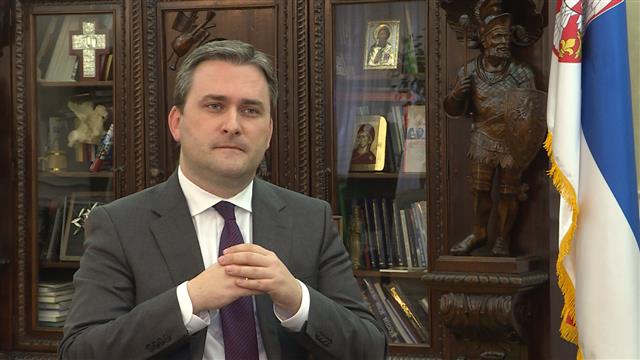
2 January 2021
Minister Selakovic: New ambassadors will be appointed this year, but the goals remain the same
This year, Serbia could finally have Ambassadors and Consuls General appointed to about a third of the currently vacant positions in the country's diplomatic and consular missions in the world, and Minister of Foreign Affairs Nikola Selakovic is convinced that most of these positions will be filled, as he points out, by the best possible people.
"In the next year, I am convinced that the majority of these vacancies will be filled", Selakovic told Tanjug, emphasizing that the work is being done gradually, because the state wants to show that is has a quality staff who will represent Serbia's interests in the best possible way.
The Head of Serbian diplomacy reminded that in a number of diplomatic missions, the four-year mandate of Ambassadors and Consuls General has already expired, so that the procedure for appointing new ones will follow, after their recall.
One of the "vacant" spots is the post of the Serbian Ambassador to China.
"We are working hard to find the best possible solution for our new Ambassador to China and as we appointed one of the best people in the state system as Ambassador to the United States, who, I am sure, will perform his duties in the best possible way, I am convinced that it will be the same for the Ambassador in Beijing", Selakovic said.
The Minister, who took over the foreign policy sector in the Government a little over two months ago, points out that circumstances in the world, as well as Serbia's position in it, have changed, but that Serbia's foreign policy goals do not change: the country remains strategically committed to European integration and, while pursuing the EU path, it will also strengthen traditional friendships with Russia and China, as well as promote and strengthen new partner relations with the United States.
"Relations in the region, good-neighborly relations, regional cooperation are also important for Serbia, because this fits into the set of requirements on the European path. But, even regardless of the European path, it is always important who you live next to, who you live with, what your neighbors are like and what the relations are like in the neighborhood", Minister Selakovic said.
He also points out that the issue of Kosovo and Metohija is of inestimable importance, it being the main national and state issue for Serbia and the Serbian people.
"When I say that circumstances are changing, but not the goals - the EU and European integration was our goal seven years ago as well, but look at what our room for maneuver was then, in terms of economic aspects, and look at it today. Circumstances changed, and then you adjust your actions to these changed circumstances, to the best extent possible", Minister Selakovic said.
He reminds that foreign policy priorities for 2021 were also outlined by the President of the Republic, and that maintaining peace and stability in the region is the absolute priority.
"Only in a peaceful and stable region of the Western Balkans and Southeast Europe can Serbia thrive economically, culturally and scientifically - in every respect. Peace and stability in the region are “sine qua non” without which there is no development and progress. Serbia has acted, is acting and will act as a factor that stabilizes the entire region and maintains peace in the region, showing that it is the region that benefits everyone the most", Minister Selakovic said.
Relations in the region have always been complex, and the region, Minister Selakovic noted, is to our great regret, burdened with issues that we cannot have a bearing on, and which concern
the past.
Serbia's approach is to seek room to influence what is happening today and what will happen
happen in the future.
In this context, he states that the so-called "mini-Schengen" initiative for market unification of the region, which originated from Aleksandar Vucic and was met with a positive response from the Prime Ministers of Albania and North Macedonia, is one of the opportunities to do much more for the region.
"To show how much more we can do if we act together and if we seek our common denominators, and not what separates and divides us ", Selakovic points out.
When it comes to relations with the United States, Selakovic said that one should not expect the great powers to change their positions the way we would like, want or imagine, but that it is important that the Ambassador in Washington, Marko Djuric, also emphasized that his task, among other things, will be to make efforts to change the climate in bilateral relations with the United States - the most important country in the world, as our lacking communication with them in the past seriously affected the position of the Serbian people and Serbia.
"I am convinced that Djuric will work seriously on that, together with President Vucic, Prime Minister Brnabic and the Ministry of Foreign Affairs, and contribute to a large extent to changing that climate", Minister Selakovic said.
He points out that it is extremely important for Serbia to promote its partner relations with the United States to a higher level.
"This is a country with which we cooperate closely in many areas and a country with which we must strive, and not give up in doing so, to find what we have in common, our common ground and good examples of our cooperation in the past, and to create space for such cooperation in the future as well", Minister Selakovic concluded.
Source: Tanjug |
|
|
| President Vucic: Serbia to remain on the course of a winning policy of stability |
|
29 December 2020
President Vucic: Serbia to remain on the course of a winning policy of stability
Preservation of peace, taking care of the health and better living standard are key for Serbia in 2021, underlined President of the Republic Aleksandar Vucic, convinced that even though the completion of this ambitious and by no means easy task will be anything but straightforward, best results can be achieved by working in concert with the Government, while ensuring security and a future of certainty for the citizens.
The President said that Serbia has set for itself great and ambitious goals for the next year, notwithstanding the complex international and regional circumstances, and that it will endeavour to fully preserve peace and stability in the region and the country, while safeguarding the vital national and state interests.
"Serbia will remain on the course of a winning policy - the policy of stability", President Vucic said and stressed that our country remains on the European integration path and that it will carefully foster its friendship with Russia and China, while building a friendship with the United States as well.
According to the President, Serbia will continue to pursue a winning policy, with the country itself as a top priority, i.e., a policy that will enable Serbia to continue being one of the top three countries in Europe in terms of growth rate in the next two years.
A precondition for that, the President noted, is to crack down on criminal groups, but also to ensure even bigger investments in the police and army forces.
"Serbia is the country that recorded the highest growth in Europe in 2020", the President pointed out at the annual press conference and added that he expects to conclude a new arrangement with the IMF, as well as that Serbia, by the end of next year or early 2022, will raise its credit rating to an "investment" one, which will put our country's rating on par with the most developed EU countries.
As the greatest success in 2020, Vucic noted that Serbia will end the year with the highest growth rate in Europe, which, as he said, is expected to be from minus 0.75 percent to minus one.
"I am proud to be the President of a country that is the European champion in terms of GDP", Vucic pointed out and added that German Chancellor Angela Merkel was also pleased with Serbia's success.
According to President Vucic, this result will encourage Serbia to accelerate its European path, while continuing friendships with those who did not turn their backs on Serbia when it was at its darkest hour, namely Russia and China.
The President pointed out that the activities to attract foreign investors will continue, then that work will be done on investments in agriculture, primarily the food industry, new machinery, and digitalization of agriculture.
President Vucic also emphasized that the goal is for salaries in the public sector to average between 560 and 570 euros by the end of the year. Only in Belgrade, the average salary would be around 700 euros.
President Vucic reminded that the salaries of health care workers will increase by five percent from January 1, while the salaries of others in the public sector will increase by 3.5 percent and an additional 1.5 percent as of April 1, while corporal, private first class and non-commissioned officer army ranks will get an increase of an additional 10 percent. He noted that the minimum wage will be increased by 6.6 percent and so will pensions from January 1, by 5.9 percent, with the plan that the average pension amounts to 270 euros by the end of 2021. The President especially pointed out investments in health care, reminding that two new covid hospitals have been opened and that the renovation and construction of health facilities continues throughout Serbia, while stressing that Serbia is by far the first in the region in terms of hospitalized persons per 100,000 citizens, which is why it has recorded a low mortality rate , and also that Serbia this year has been among the top three countries in the region according to the number of PCR tests performed.
Speaking about tourism, the President said that, next year, efforts will be made on the development of the Danube basin region, from Apatin to Kladovo, that the Ovcar-Kablar Gorge will be developed, as well as our mountain centers.
Discussing the field of culture and information, President Vucic said that the implementation of the media strategy and the completion of the reconstruction of the National Theater in Subotica are important for next year, and he announced investments in museums, especially emphasizing the relocation of the History Museum to the train station building. He also stated that the floor heating in the Church of Saint Sava will be completed next year.
He pointed out that the state will continue to take care of our citizens in Kosovo and Metohija, that no one can forbid Serbia to help its people, and that Serbia will not give up on helping our people.
As he emphasized, Serbia is ready to send medicines and vaccines to the Albanian population as well, and pointed out that in the upcoming period our country will pursue a policy of peace in the region and will endeavour to cooperate with Zagreb, Sarajevo, Podgorica and others.
|
|
|
| Serbian Prime Minister the first PM in Europe to receive a Covid-19 vaccine |
|
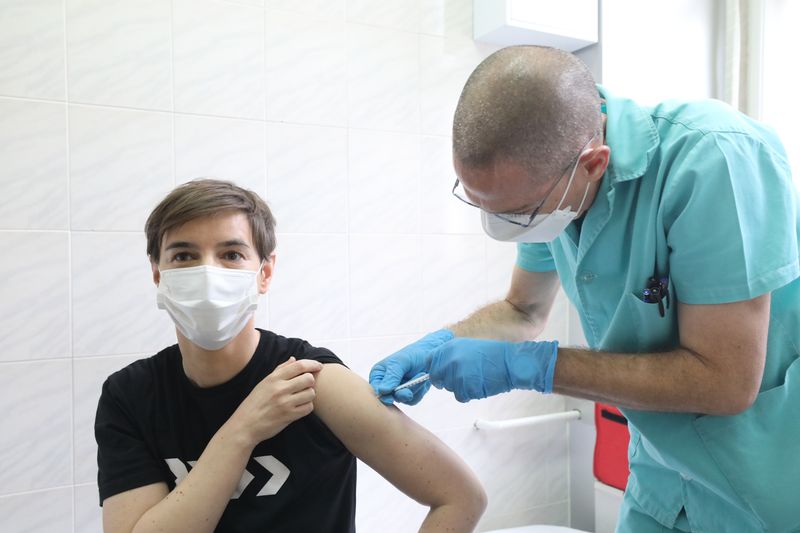
Serbian Prime Minister the first PM in Europe to receive a Covid-19 vaccine
Prime Minister of the Republic of Serbia Ana Brnabic received today the first vaccine against the coronavirus made by Pfizer company, at the Torlak Institute of Virology, Vaccines and Sera.
Brnabic, who is the first European Prime Minister to receive the vaccine, pointed out that this day may be the first since 6 March that we have a reason for a smile on our faces as it marks the beginning of the end of the coronavirus pandemic in Serbia, but also in Europe and the world.
As Prime Minister and as someone who leads the COVID-19 Crisis Response Team, I felt obliged to be the first to receive the vaccine, to show that we believe in it, as well as in our institutions - the Medicines and Medical Devices Agency of Serbia and experts who worked round the clock to test the vaccine, she said.
Underlining that it was an honour to do this for her country and be the first to pave the way for all citizens, the Prime Minister said that she agreed with President of the Republic Aleksandar Vucic that the two of them receive different vaccines, so he will most likely receive the next one that arrives, most probably the one produced by China.
At the moment we have the Pfizer-BioNTech consortium vaccine, and the vaccines from the Chinese Sinopharm are expected in the near future, as well as certain quantities of the Russian vaccine Sputnik V.
She expressed her belief that at the end of the first quarter or the beginning of the second quarter of next year we will have the vaccine of the company AstraZeneca, and after that the vaccine manufactured by Moderna.
As we promised, all vaccines licensed in their countries and approved by relevant international agencies will be available to our citizens, and of course they will be tested by all of our agencies and institutes as well, the Prime Minister pointed out.
She said that prior to the vaccination of health care workers, Minister of Health Zlatibor Loncar will also receive a vaccine shot as we endeavour to serve as an example and show how confident we are in the vaccines and institutions.
Brnabic pointed out that Serbia, not counting Great Britain, is the first country in Europe to receive the Pfizer-BioNTech vaccine, and the third to start a mass immunization and campaign for giving the vaccine - after Great Britain and Switzerland.
We achieved something very important and we will not stop even for a moment until the immunization of the population is completed, the Prime Minister said.
She specified that our country will receive another 16,000 doses of Pfizer-BioNTech vaccine in January, as well as that together with other vaccines we will have a total of one million doses in January, and a total of approximately two million doses during the first quarter of next year.
There is a dynamic on which Pfizer delivers vaccines and it varies depending on the production, and this is the case with deliveries to both Serbia and all other countries worldwide. We expected to receive 10,000 doses from Pfizer-BioNTech in December, however 4,807 doses arrived, the Prime Minister explained.
Serbia demonstrated that it is able to fight and succeed if we all work as a team, Brnabic said and called on all not to see the beginning of vaccination as the end of the fight already, but to continue to apply all measures instead.
This is to be certain and to be able to help our health care workers, and once the immunity is acquired we will be able to slowly start taking off the masks in 2021, but until then we should not see this as a victory but as the beginning of the end, the Prime Minister concluded.
After the Prime Minister, vaccine shots were also administered to the Minister of Labour, Employment, Veteran and Social Affairs and a member of the COVID-19 Crisis Response Team Darija Kisic Tepavcevic and to Predrag Kon who is also on the COVID-19 Crisis Response Team.
Furthermore, vaccine shots were also given to Head of the MMA Department for the Prevention and Control of Nosocomial Infections prof. Dr. Vesna Suljagic and academician Predrag Pesko, professor of Belgrade and Heidelberg universities and full member of the Serbian Academy of Sciences and Arts.
The first quantities of the vaccine arrived in Serbia on 22 December, and today they will be administered to patrons of nursing homes in Belgrade and Novi Sad.
Serbia is the first country in the region to receive a shipment of Pfizer-BioNTech vaccine.
In addition to procuring the vaccine among the first countries in the world, even before EU countries, Serbia is one of the rare countries that managed to build and open two covid hospitals in record time. The hospitals with 930 beds in Batajnica and 500 beds in Krusevac are a major contribution to the expansion of capacities and strengthening the health care system in the fight against coronavirus and, as President Vucic said, represent a monument of the future, that will talk about the accomplishments the state made in a short time.
Also, we recall that investments in health infrastructure have been large in Serbia, and since 2016, 80 health centers and clinics have been renovated, and works are underway on six large health centers. This way more than EUR 200 million was invested in the reconstruction, construction and equipping of hospitals and more than 300 million in the renovation of clinics and specialized hospitals, and many have already been completed, such as the University Children's Hospital Tiršova, and KBC Zemun nad KBC "Dragiša Mišović" hospitals.
The absolute priority of the Serbian Government is the successful completion of health infrastructure projects that are underway, but great attention is also paid to health workers,
whose salaries have, by 2020, been increased by 56.8% for specialist doctors, and 66.9% for
nurses, while significant funding is invested in the education of health professionals, as well as in equipment and working conditions.
Like other countries, Serbia has faced great challenges this year, most notably health challenges, and all factors in the state were focused on preventing the spread of the virus and safeguarding the lives and health of citizens. Serbia has faced these challenges better than many wealthier and more developed countries in Europe and the world.
Belgrade,
24 December 2020
|
|
|
| Meeting with Minister of Defense of the Federal Republic of Nigeria |
|
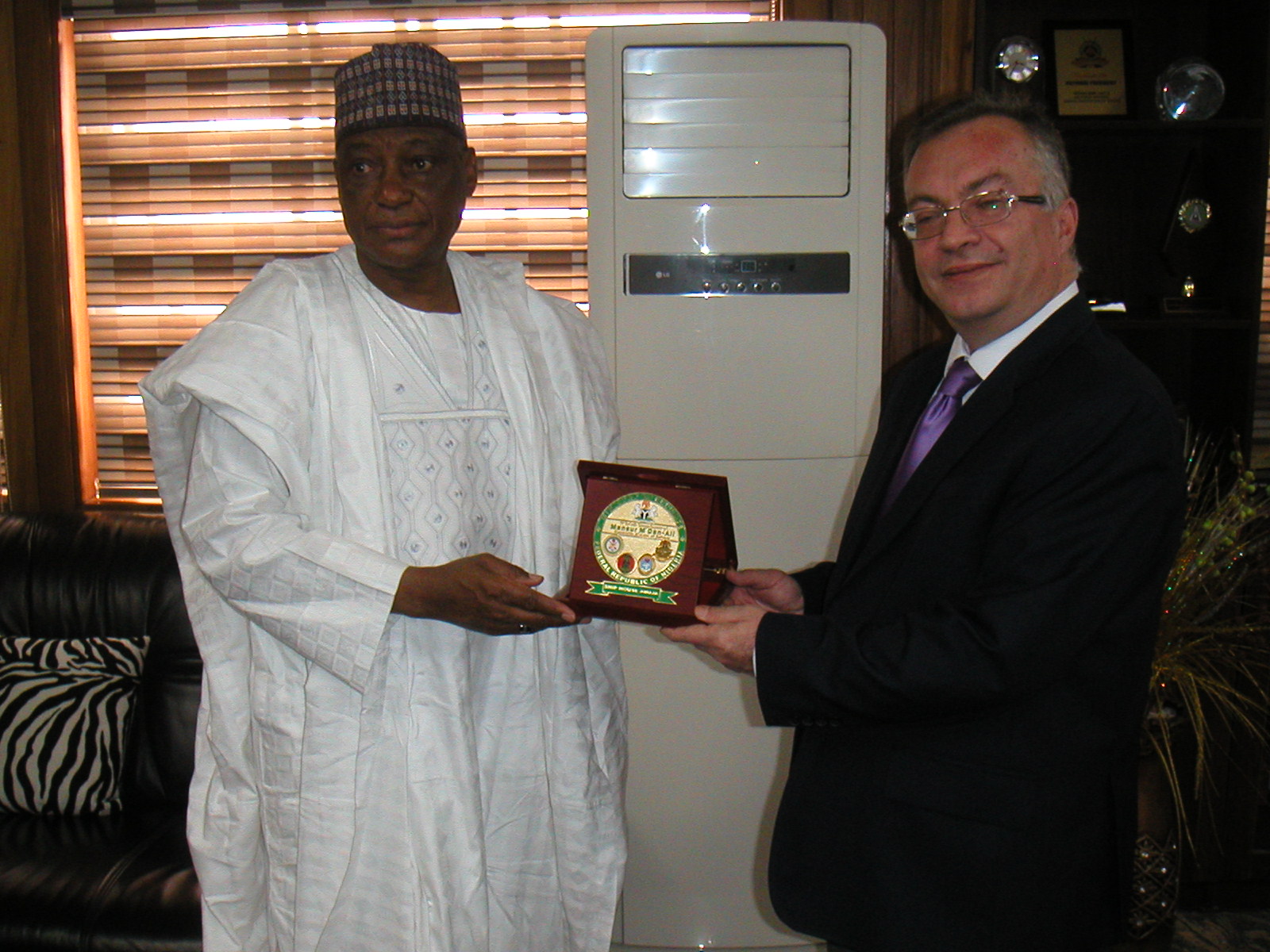
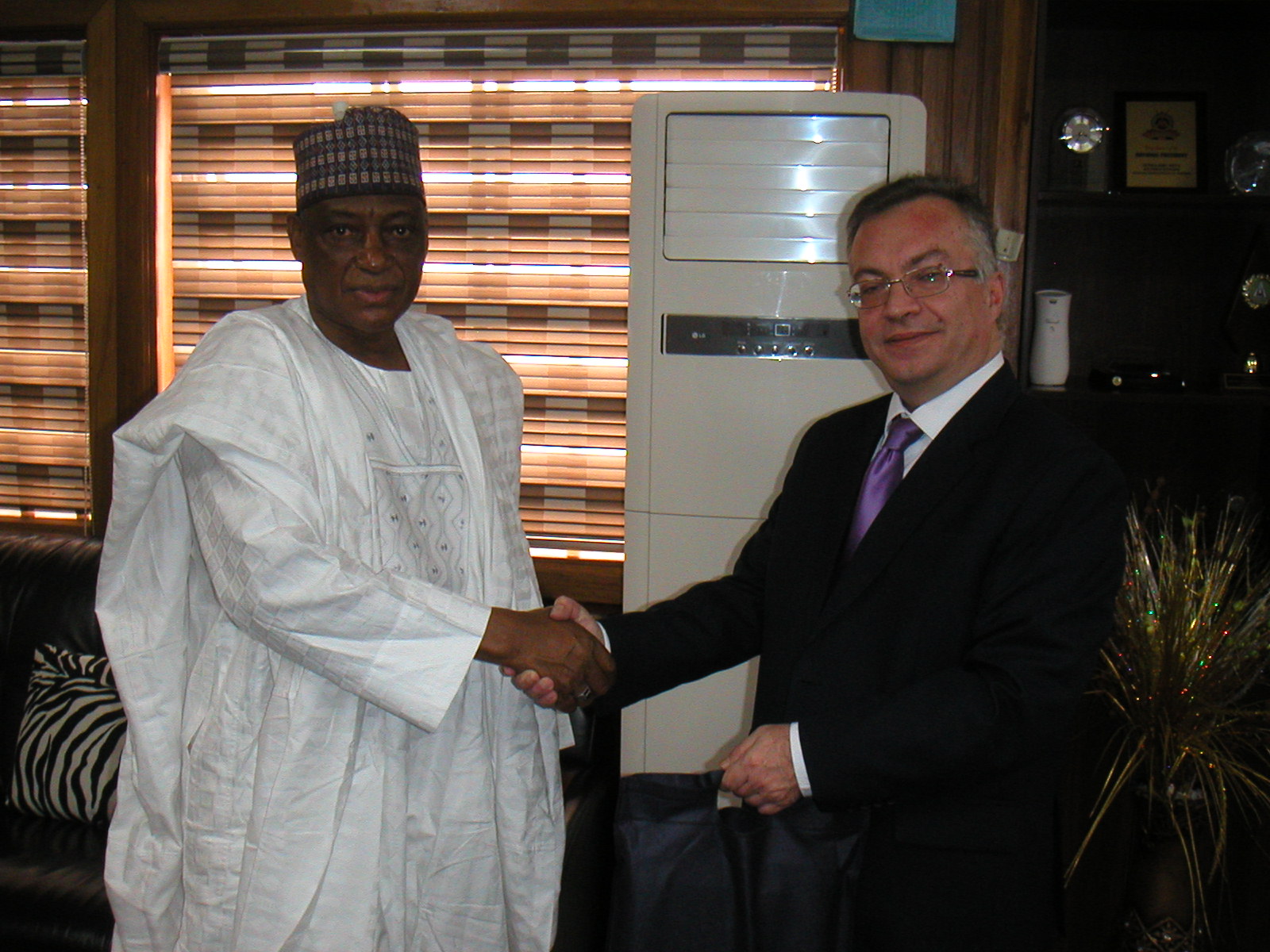
Mr. Djura Likar, Ambassador of the Republic of Serbia, on September 04th, 2018, had a meeting with Brig.Gen. (Rtd.) Mansur Den-Ali, Honorable Minister of Defence of the Federal Republic of Nigeria.
During the meeting two parties dicussed the possibilities of improving cooperation in this field. |
|
|
| Signing of Contracts with Transmission Company of Nigeria |
|
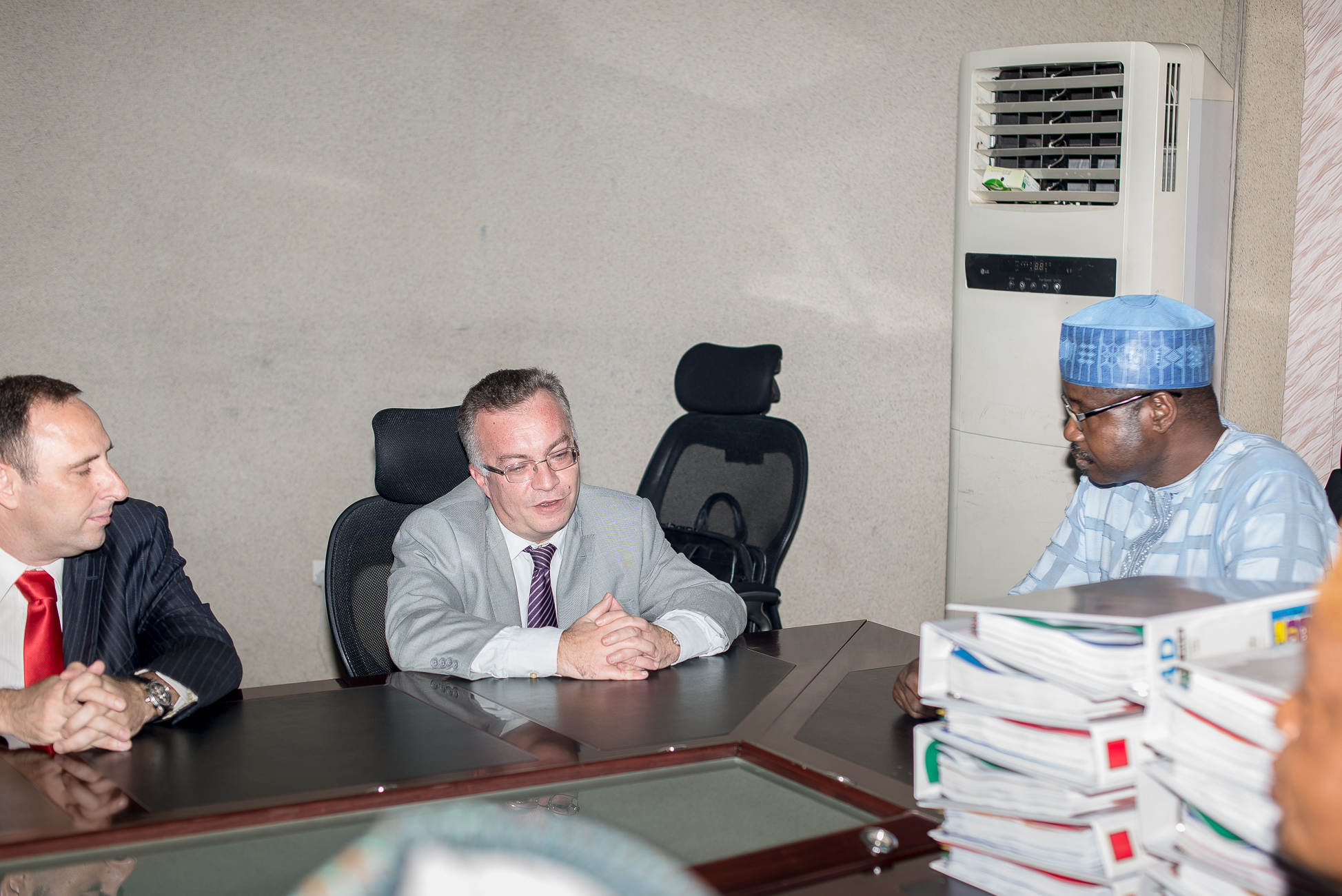
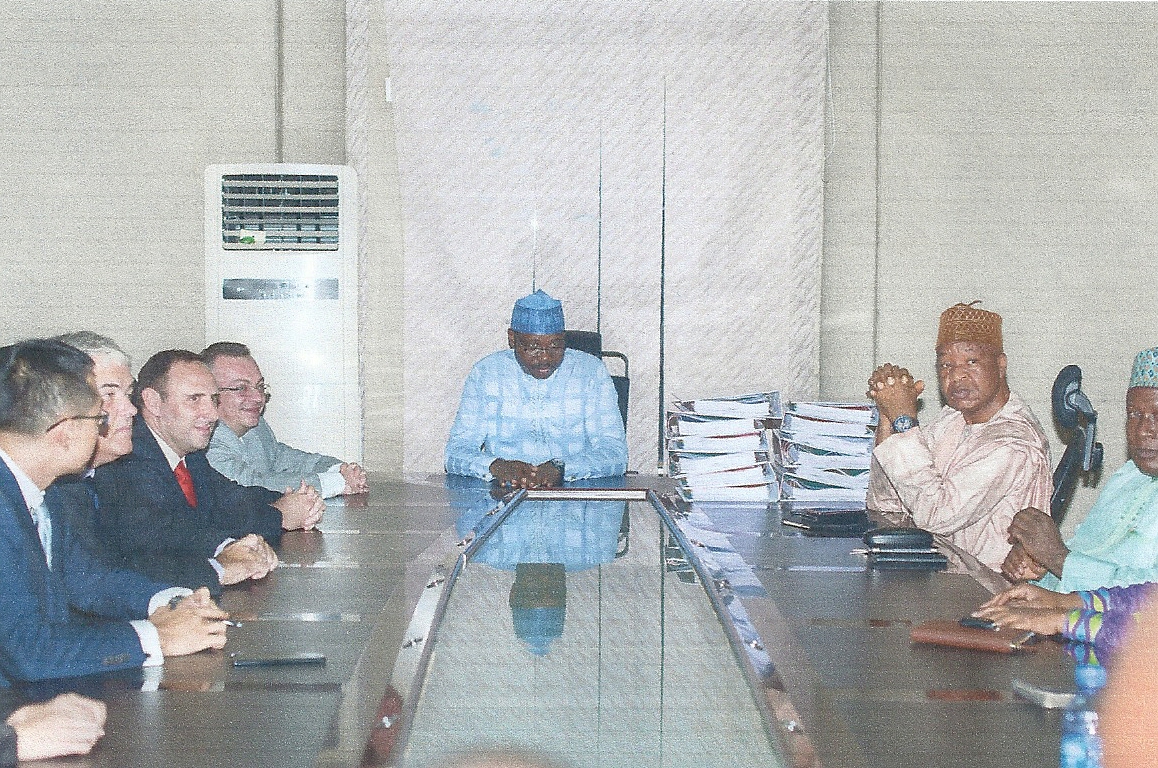
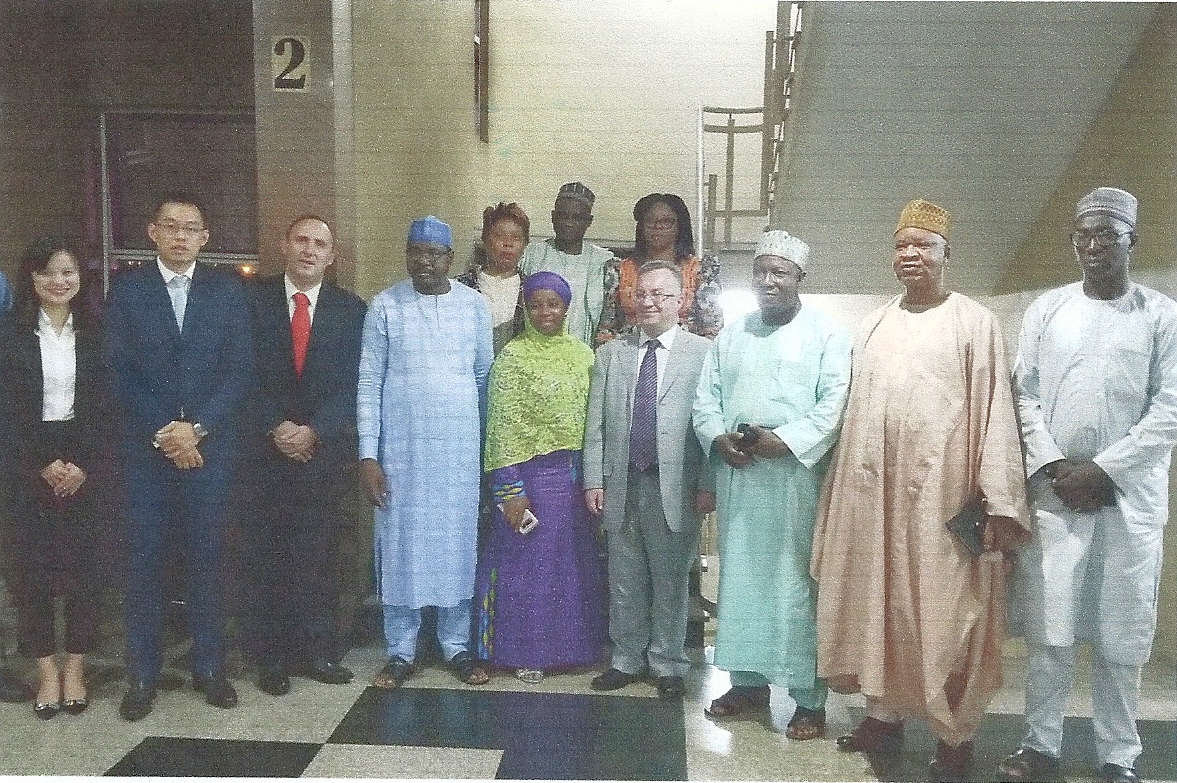
"Energo Nigeria Ltd", subsidiary of the Serbian Company "Energoprojekt Plc" and Chinese Company "TBEA" have signed two contracts with Transmission Company of Nigeria on August 28th, 2018.
In the presence of H.E. Djura Likar, Ambassador of the Republic of Serbia, contracts were signed by Eng. Predrag Mihel, Deputy Managing Director of "Energo Nigeria Ltd", Mr. Liao Fei, Managing Director of "TBEA" and Mr. Usman Gur Mohammed, Chief Executive Officer/Managing Director of Transmission Company of Nigeria.
The total value of signed contracts are 52 million USD with portion of "Energo Nigeria Ltd" at value of 32 million USD.
|
|
|
| Presentation of Letter of Credence |
|
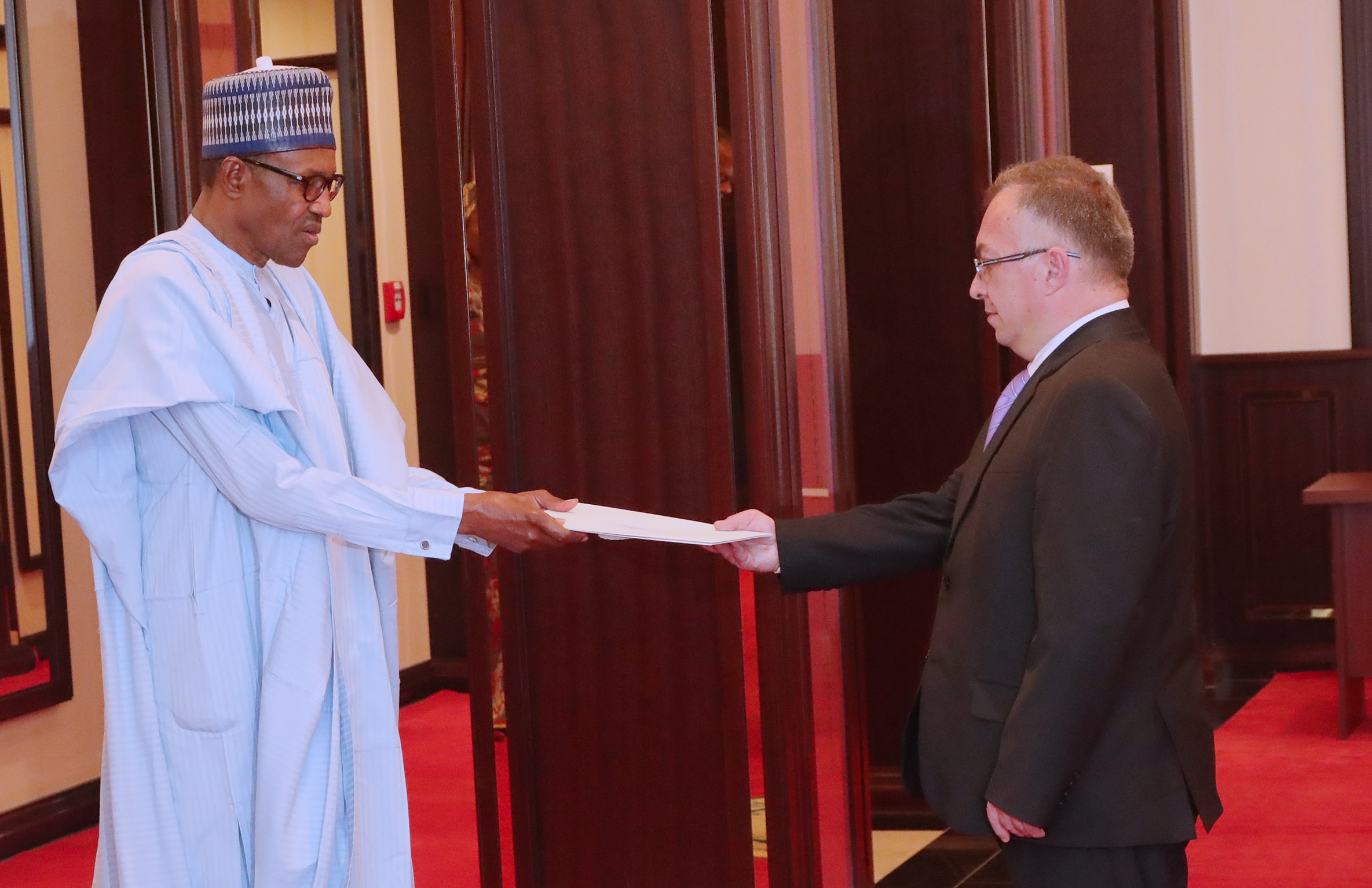
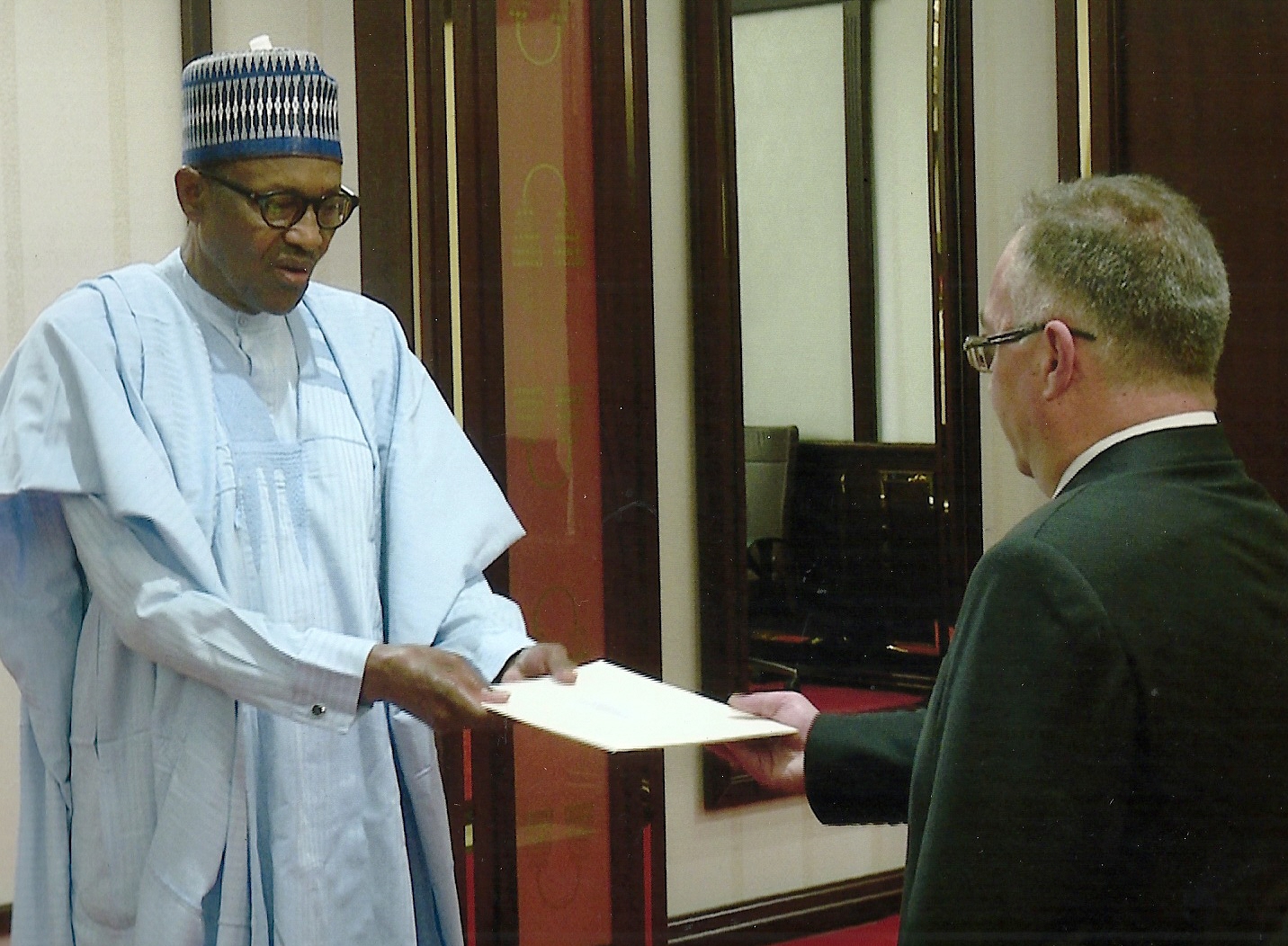
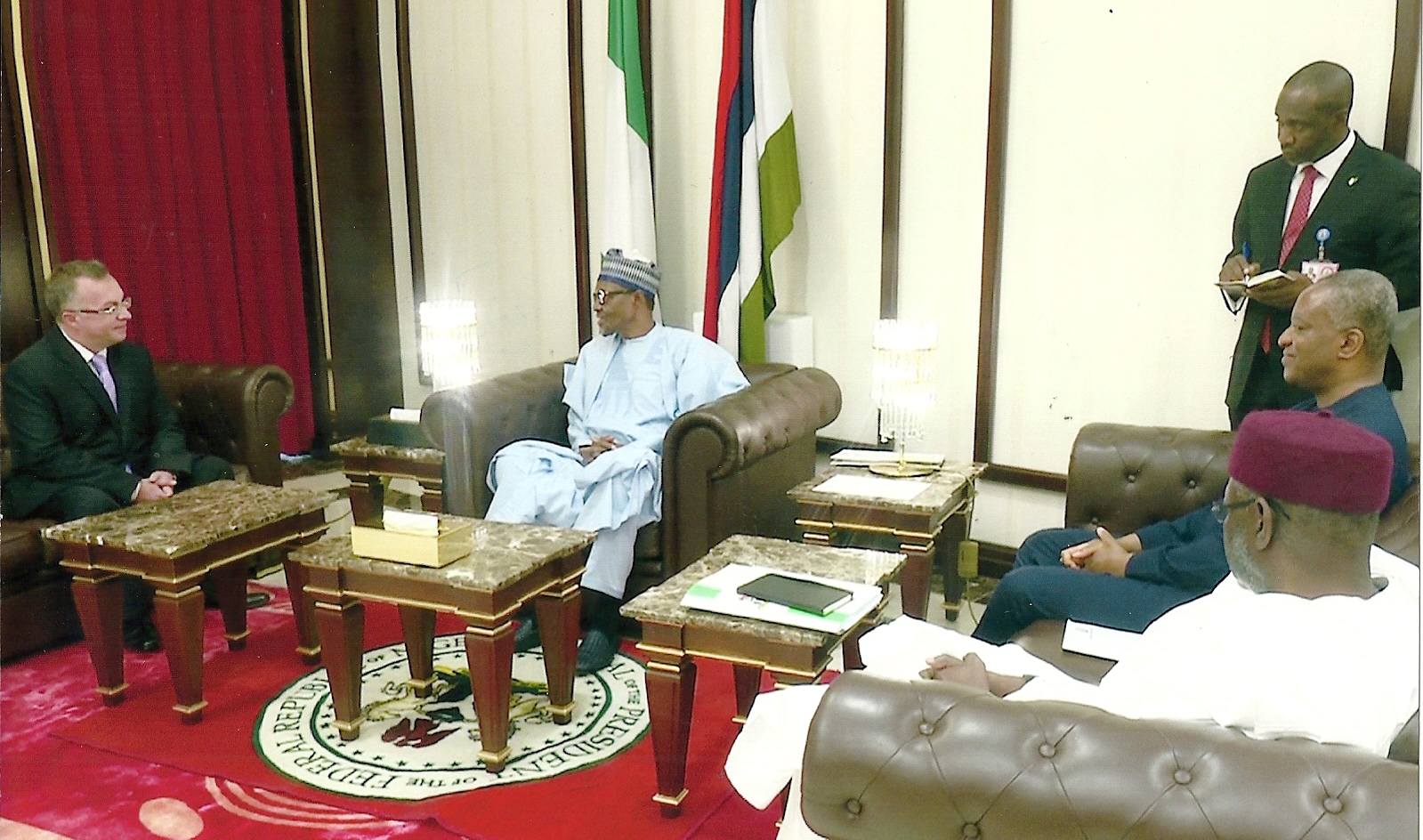
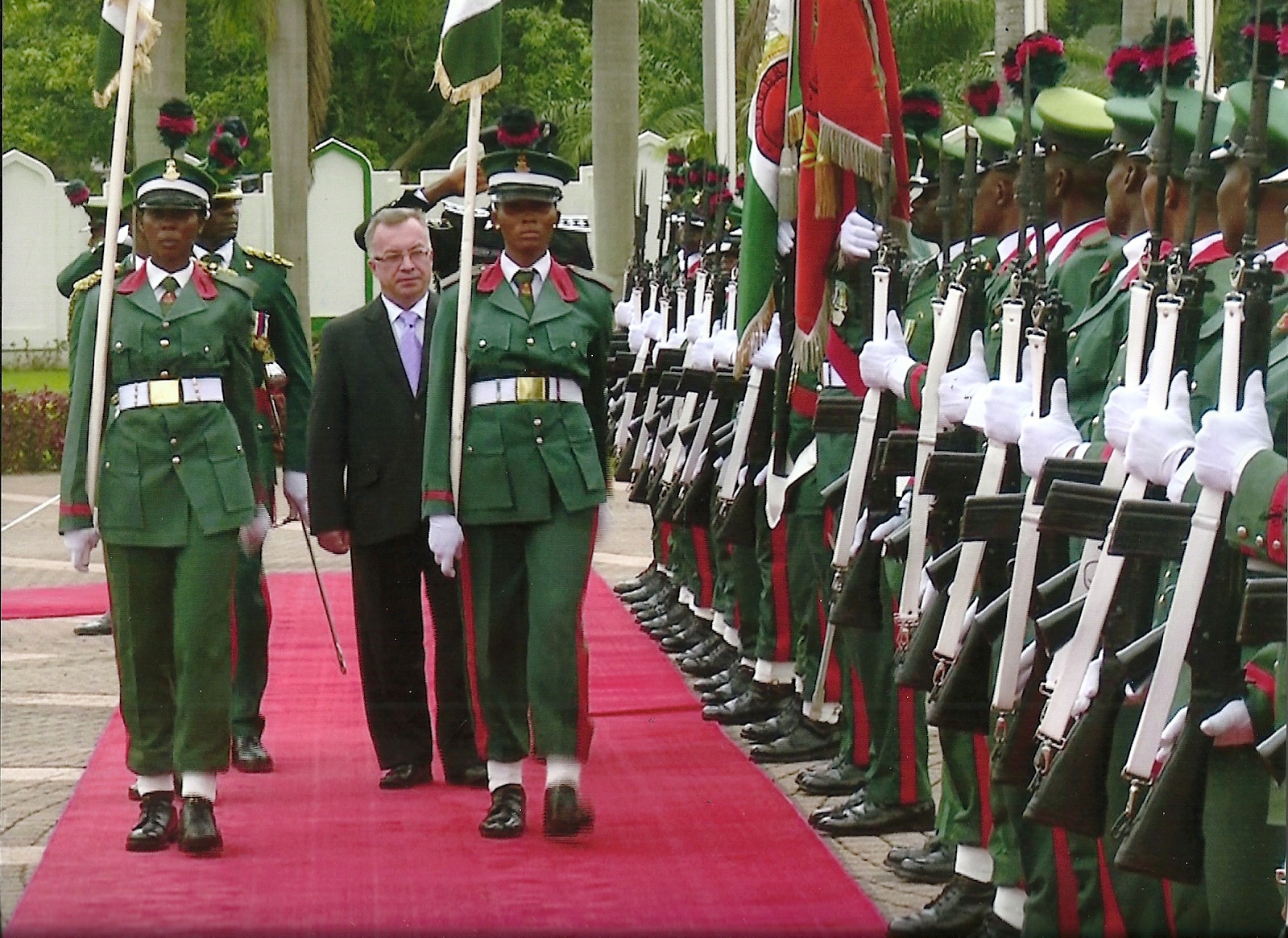
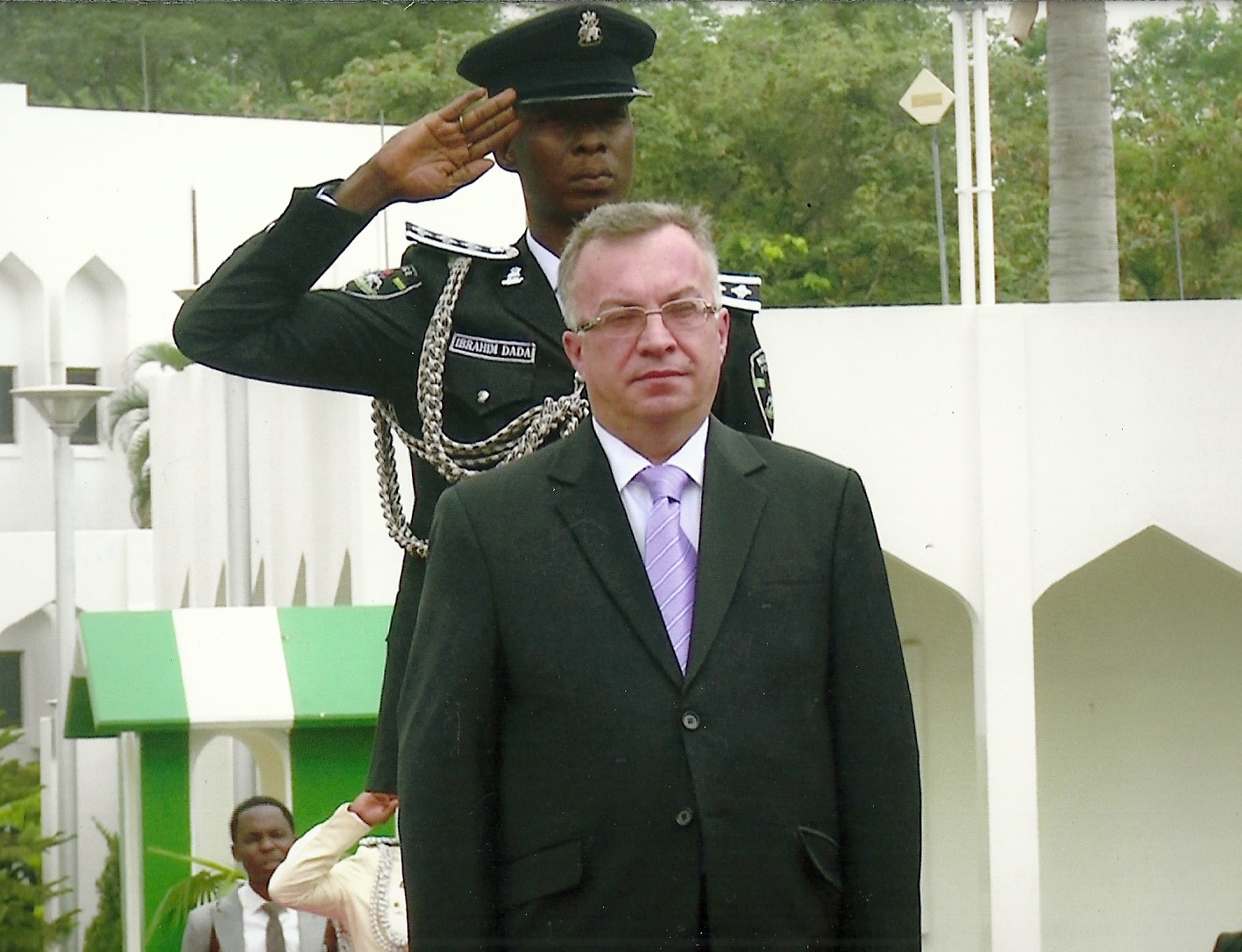
On May 31st, 2018, Mr. Djura Likar, Ambassador of the Republic of Serbia handed over Letter of Credence to H.E. Mr. Muhammadu Buhari, President of the Federal Republic of Nigeria.
During the meeting two parties repeat their commitment to improve bilateral relations especially in the areas of security, trade, education and sport.
The President Buhari was accompanied by Honorable Minister of Foreign Affairs of the Federal Republic of Nigeria Mr. Geoffrey Onyeama. |
|
|
| Visit of the special envoy of the President of Serbia, Ambassador Zoran Vujić, to the Federal Republic of Nigeria |
|
Ambassador Zoran Vujić, special envoy of the Presidenof the Republic Serbia, Mr. Aleksandar Vučić, between October 10-12, 2017, was at officia mission to the Federal Republic of Nigeria.
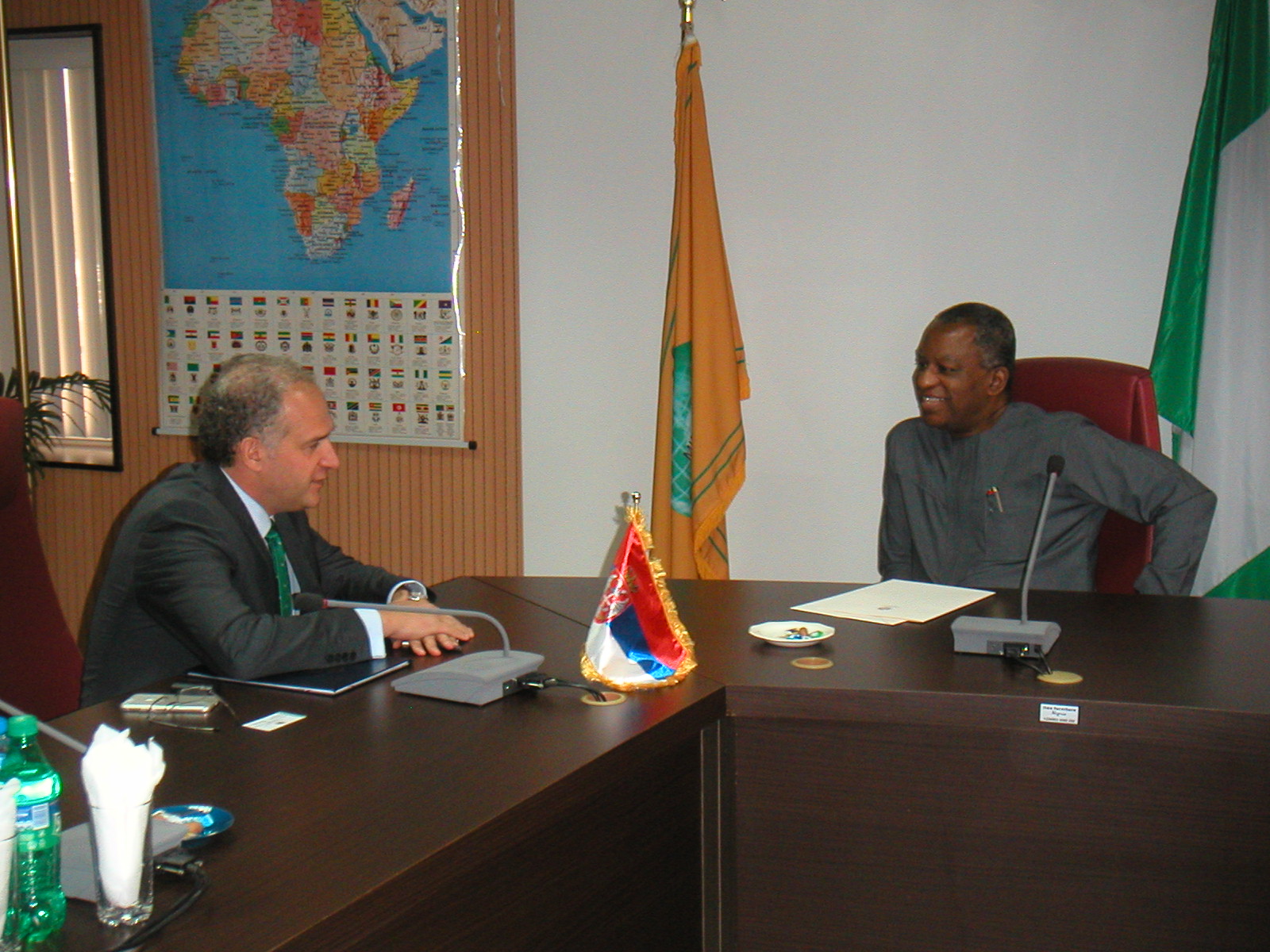
During meeting with his host Mr. Geoffrey Onyeama, Minister of the Foreign Affairs of the Federal Republic of Nigeria, it was concluded that bilateral relations between Republic of Serbia and Federal Republic of Nigeria are cordial, friendly and without open questions. The main topics of discusion were related to improvement of cooperation between two countries in various fields espacialy on economic field. It was mutually agreed that dialog between two countries on high and highest level should continue. |
|
|
| 04.11.2016. - INVITATION TO TENDER FOR THE PROVISION OF REAL ESTATE SALES SERVICES – THE SALE OF DIPLOMATIC REAL ESTATE IN NEW YORK (UNITED STATES OF AMERICA), TOKYO (JAPAN), BONN (GERMANY), AND BERNE (SWITZERLAND) |
|
04.11.2016. - INVITATION TO TENDER FOR THE PROVISION OF REAL ESTATE SALES SERVICES – THE SALE OF DIPLOMATIC REAL ESTATE IN NEW YORK (UNITED STATES OF AMERICA), TOKYO (JAPAN), BONN (GERMANY), AND BERNE (SWITZERLAND)
- Bosnia and Herzegovina, the Republic of Croatia, the Republic of Macedonia, the Republic of Slovenia, and the Republic of Serbia – as the sole Successor States to the former Socialist Federal Republic of Yugoslavia (hereinafter “the SFRY”) – and the co-owners of diplomatic and consular property of the SFRY, as the previous title owner, hereby issue an invitation to tender for the provision of the service of brokering the sale of the following immovable property (1) :
(1) The information on property in this invitation to tender are only indicative. The Successor States accept no responsibility for their accuracy. Precise information may be obtained by consulting public databases of the countries where the immovable property is located. The Successor States will submit relevant data in their possession regarding the immovable property listed in this invitation to tender to the successful tenderer after the completion of the selection process.
a) Permanent Mission of the SFRY to the UN, New York, USA (854 Fifth Avenue, N.Y. 10065); additional indicative data: block 1391, Lot 6, site area 3,600 sq. ft./30 x 120, gross living area 16,125 sq. ft, est. 1910;
b) Residence of the Permanent Representative of the SFRY to the UN, New York, USA (730 Park Avenue, N.Y. 10021); additional indicative data: Apt. 16/17B, cooperative interest, 718/30.000 shares, block 1385, Lot 37, project name: Park 71st St. Corp., gross living area above grade 4,294 sq. ft., Act. Age: 1929;
c) Embassy and residence of the SFRY in Tokyo, Japan (7-24, 4-chome, Kitashinagawa Shinagawa-ku, Tokyo); additional indicative data: land 316-37 Kita Shinagawa 4-Chome, Shinagawa Ward, Tokyo, registered total area 995.27 m2 (app. 28 m x 30 m), building 316-37 Kita Shinagawa 4-Chome, Shinagawa Ward, Tokyo, total floor area 1,725.70 m2 (size in building design document), time of completion 1965;
d) Embassy of the SFRY in Bonn, Germany (Schlossallee 5, 5300 Bonn 2), additional indicative data: land register Mehlem, entry no. 2,865, building and garden/courtyard area 5,441 m2, Schlossallee 1 and 5, floor area 1,565 m2 (ground floor, cellar, attic, underground garage with 14 parking spaces);
e) Embassy and residence of the SFRY in Berne, Switzerland (Seminarstrasse 5, 3006 Bern), additional indicative data: estate: nr. 199 Bern 4, land area: total 1,760 m2, building gross area 540 m2, garden area/courtyard 1,220 m2, construction year: 1978.
The Successor States underline the following:
- The service of brokering the sale of all the immovable property listed above will be awarded to a single real estate agency, which will be awarded the contract by the Successor States;
- The deadline for submitting tenders is 30 days from the day following the issuing of this invitation to tender, while the Successor States will notify tenderers of their decision within 50 days from the deadline for submitting tenders;
- Among the references qualifying them to successfully broker the sale of the listed property, interested tenderers will submit the following documents, and define their conditions for providing brokerage services. In their offer, the interested tenderers will include:
a) Documents certifying that the tenderer is a registered company;
b) Documents proving that the tenderer has offices, branches, or partner organisations in the countries where the property on sale is located, operating in the listed cities (New York, USA; Tokyo, Japan; Bonn, Germany; Bern, Switzerland);
c) Documents showing the tenderer’s turnover amounted to at least US$ 100 million (2) in the last three years;
(2) Or the equivalent in €, CHF, or ¥.
d) Guarantee for the offer in the amount of US$ 50,000.00 (the guarantee will be returned to the tenderer upon the signing of the brokerage contract);
e) Performance guarantee in the amount of US$ 100,000.00 (the performance guarantee will be returned to the tenderer upon the completion of the contract);
f) Evidence of financial and business solvency;
g) Evidence of technical and professional capacities and references proving the successful provision of brokerage services;
h) Certificate of no conviction of the tenderer/legal entity and its CEO, in accordance with the legal provisions of the country of the registered seat of the tenderer and permanent residence of its CEO;
- The period of validity of the tender shall be at least 90 days from the date of submission;
- Interested tenderers will specify their tenders as a brokerage fee, which is a percentage of the total gross sales price of the property listed above;
- The lowest brokerage fee shall be the decisive criterion in selecting the successful tenderer, provided that the tenderer meets all the above conditions;
- Interested tenderers will submit their tenders (in a sealed envelope, marked with the designation ‘Do not open’) by registered mail addressed to:
Stanislav Vidovič, Ministry of Foreign Affairs of the Republic of Slovenia, SI-1001 Ljubljana, Prešernova cesta 25.
- The Successor States will provide appraisals of the market value of all the listed immovable property to the successful tenderer; the property’s appraised market value will represent the minimum asking price for the property concerned, unless otherwise decided by the Successor States;
- The sale of the immovable property will be conducted preferably by way of public auction or by any other method in accordance with the local real estate market practice for each immovable property concerned, as advised by interested tenderers in their tenders;
- The Successor States reserve the right not to select any tenderer, even if all conditions are met;
- The immovable property listed in this invitation to tender may be sold separately or not. Each Successor State must confirm the sale of each immovable property under the terms to be negotiated with the best offer/potential buyer prior to concluding the sale if the purchase price offered is below the appraised market value or the minimum asking price.
- Contact details for additional information: gp.mzz@gov.si or secretariat.mzz@gov.si
ADDITIONAL DOCUMENTS:
- Text of Invitation you may download here,
- Tenderer Information Sheet you may download here.
- Tender Bond (Guarantee) you may download here.
- Performance Bond (Guarantee) you may download here, |
|
|
| Minister Dacic in a meeting with Nigerian delegation |
|
04. March 2016.
First Deputy Prime Minister and Minister of Foreign Affairs of the Republic of Serbia Ivica Dacic received today a delegation of the Federal Republic of Nigeria headed by Bulus Lolo, the Permanent Secretary of the Ministry of Foreign Affairs of Nigeria.
In the talks they confirmed the traditionally good and friendly relations existing between the two countries for several decades.
At the meeting both sides expressed interest in concretizing the close ties by way of signing a number of bilateral agreements, as well as in the strengthening of economic relations, and also reached an agreement on the exchange of top-level visits.
Minister Dacic expressed solidarity with the friendly people of Nigeria exposed to attacks of the Boko Haram terrorist organization, while Permanent Secretary Lolo presented more detail on the progress made in the past year in the fight against that terrorist organization.
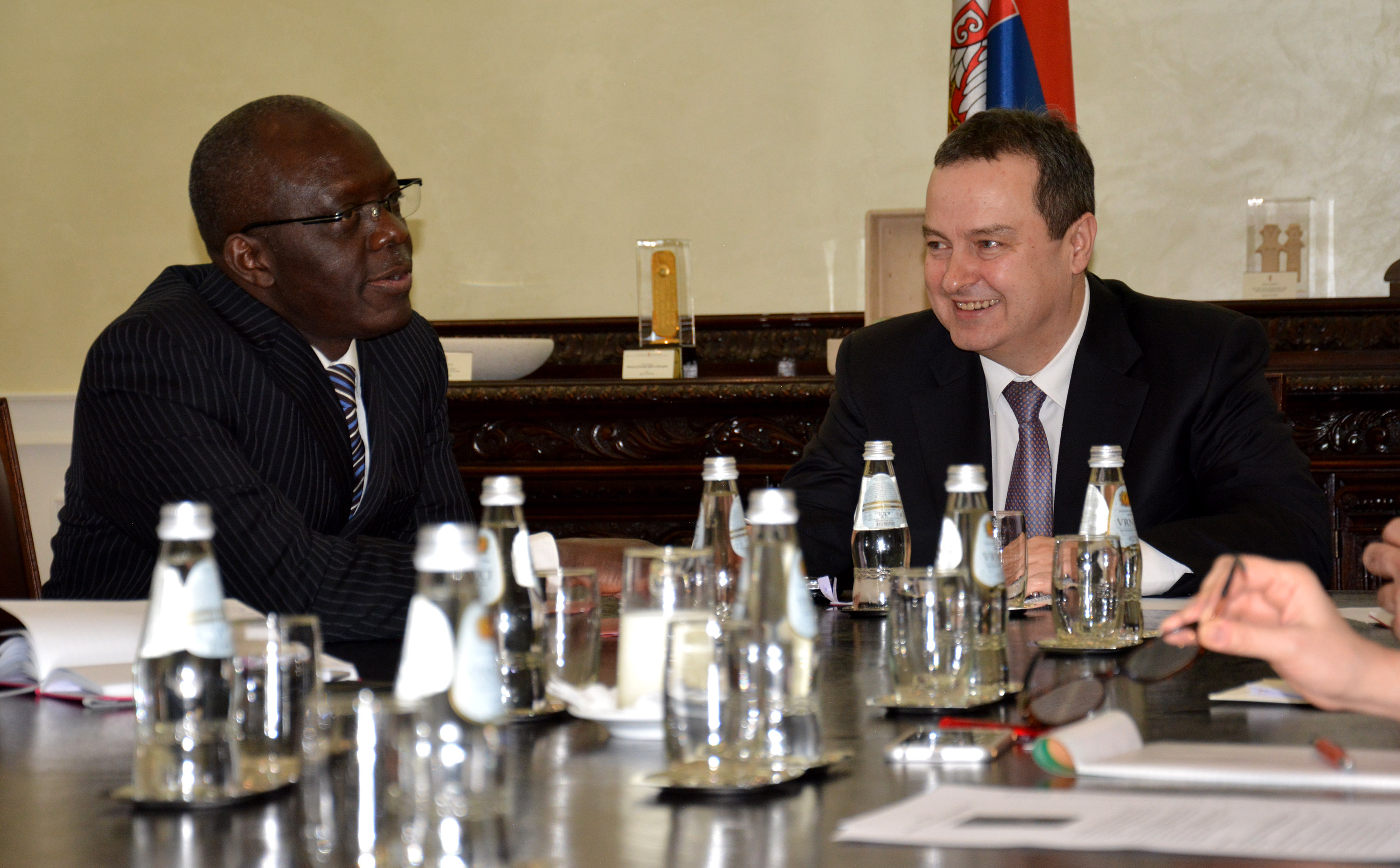 |
|
|
| Why Kosovo is ineligible for membership in UNESCO? |
|
Becase the request for its membership is a serious breach of the international law, the Constitution of UNESCO, the legally binding UN Security Council resolution 1244 (1999) and the Charter of the UN whose Article 25 says that "The Members of the UN agree to accept and carry out the decisions of the Security Council in accordance with the present Charter". |
|
|
| CATASTROPHIC FLOODS IN SERBIA |
|
The government of the Republic of Serbia has opened foreign currency accounts at which those who want to help victims of floods can deposit donations. Any help will be most welcomed and appreciated. For any further information do not hasitate to contact Embassy of Serbia in Abuja, where you can also donate funds. Please proceed for payment instructions - click on Read More. |
|
|
|
|
|